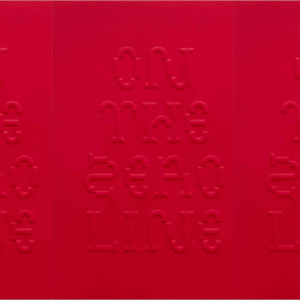
100 Books That Defined the Decade
For good, for bad, for ugly.
This is not a list of the best books of the decade. (This is, if you’re interested.) This is a list of books that, whether bad or good, were in one way or another defining for the last decade in American culture. (A global list would be nearly impossible, for obvious reasons. Accordingly, I’ve hewed to English-language and/or US publication dates, when relevant.) This is a list for general readers and followers of literary culture; it includes both major bestsellers and literary standouts, books that have become pop culture phenomenons, and books whose influence has been quieter and/or localized in literary circles. Obviously, it would not suffice for specialist purposes—I imagine a scientist would have selected a very different list of 100 books. (Or 100 books give or take: on a case by case basis, I have counted series as single books, or let the first book in a series stand in for the whole.)
Some of you may wonder if there’s been enough time and/or distance to really evaluate the last ten years in literature, or in culture for that matter. And the answer is probably . . . no! Or at least, our assessment of the last decade will certainly continue to change and harden as time goes on (if in fact it does—let’s cross our fingers and also vote). But even if hindsight is 20/20, there’s something to be said for a contemporary assessment, an in-miasma reading, if you will. So to that end, here are the 100 books that the members of the Literary Hub staff consider to be the most defining, important, transformative, and/or illustrative of the decade that was.
*
Jonathan Franzen, Freedom (2010)
There is, after all, a kind of happiness in unhappiness, if it’s the right unhappiness.
*
Essential stats: Franzen’s follow up to The Corrections was a #1 bestseller; sold almost 100,000 copies before Oprah called it a masterpiece and picked it for her book club; won the John Gardner fiction prize and was a finalist for the LA Times book prize and the National Book Critics Circle Award.
What did the critics say? They were torn. Here’s Michiko Kakutani in The New York Times:
Jonathan Franzen’s galvanic new novel, Freedom, showcases his impressive literary toolkit—every essential storytelling skill, plus plenty of bells and whistles—and his ability to throw open a big, Updikean picture window on American middle-class life. With this book, he’s not only created an unforgettable family, he’s also completed his own transformation from a sharp-elbowed, apocalyptic satirist focused on sending up the socio-economic-political plight of this country into a kind of 19th-century realist concerned with the public and private lives of his characters.
But here’s Ron Charles in The Washington Post:
So what is it about Jonathan Franzen and poo? In 2001, his wonderful breakthrough novel, The Corrections, was momentarily stunk up by a scene in which a senile old man imagines his feces talking back to him. A decade later, Franzen’s more staid, more mature, but all around less exciting Freedom reaches its comic zenith when a young man searches through his own excrement with a fork. What seemed like a sophomoric indulgence in that earlier tour de force now smells stale.
Behind the title: “But since we’re all friends here,” Franzen once explained, “I will mention that I think the reason I slapped the word on the book proposal I sold three years ago without any clear idea of what kind of book it was going to be is that I wanted to write a book that would free me in some way.
And I will say this about the abstract concept of ‘freedom’; it’s possible you are freer if you accept what you are and just get on with being the person you are, than if you maintain this kind of uncommitted I’m free-to-be-this, free-to-be-that, faux freedom.”
But is it a Great American Novel? If you believe TIME, then yes.
And to be perfectly fair, I took this book everywhere until I finished it: bars, birthday parties. But, yo J Franz, I’m really happy for you, and I’mma let you finish, but Jennifer Egan had one of the best novels of all time this year. One of the best novels of all time!
Franzen on Oprah:
Extra credit: Jonathan Franzen’s 10 Rules for Novelists · Jonathan Franzen on Alice Munro’s Runaway · Jonathan Franzen in conversation with Wyatt Mason

Patti Smith, Just Kids (2010)
Where does it all lead? What will become of us? These were our young questions, and young answers were revealed. It leads to each other. We become ourselves.
*
Essential Stats: This memoir from beloved singer-songwriter, poet, and high priestess of New York punk—which detailed her complicated relationship with the experimental artist Robert Mapplethorpe—won the 2010 National Book Award for Nonfiction, made more end-of-year Best Of lists than you can shake a stick at, and was even crowned the One Book One New York winner earlier this year.
Did the critics like it? You bet they did. Tom Carson, writing in the New York Times, called it “the most spellbinding and diverting portrait of funky-but-chic New York in the late ’60s and early ’70s that any alumnus has committed to print”; Entertainment Weekly’s Leah Greenblatt dubbed it “a poignant requiem…and a radiant celebration of life”; and Kirkus labeled it “riveting and exquisitely crafted.”

Why did it strike such a chord with readers? Because who wouldn’t want to traverse the grimy and glorious world of the 1970s NYC art and music scene with Smith as their guide?
Because the Night: belongs to lovers . . .
Patti Smith reading from Just Kids and performing “Because the Night”:
–DS

Jennifer Egan, A Visit from the Goon Squad (2010)
I don’t want to fade away, I want to flame away—I want my death to be an attraction, a spectacle, a mystery. A work of art.
*
Essential Stats: A post-postmodern tale of music and memory, continuity and disconnection, told in thirteen interrelated stories (one of which takes the form of a Power Point presentation), inspired in equal measure by Proust and The Sopranos, which bagged both the Pulitzer Prize and the National Book Critics Circle Award.
So is it a novel or a collection of short stories? Both. Neither. It doesn’t matter. Why must we put labels on everything?
What did the Pulitzer Prize Board have to say about it? They called it “an inventive investigation of growing up and growing old in the digital age, displaying a big-hearted curiosity about cultural change at warp speed”
Did I hear that the folks at HBO were turning it into a TV show? You did, and they were, but the proposal has since been dropped [sigh], so for now you’ll have to make do with this dream casting.
Here’s Egan reading the first chapter of the novel:
–DS

Siddhartha Mukherjee, The Emperor of All Maladies: A Biography of Cancer (2010)
The art of medicine is long, Hippocrates tells us, “and life is short; opportunity fleeting; the experiment perilous; judgment flawed.”
*
Essential stats: Mukherjee’s groundbreaking work of history and science ran a cool 592 pages; it won the 2011 Pulitzer in General Nonfiction, the Guardian first book award, the inaugural PEN/E. O. Wilson Literary Science Writing Award, and was a New York Times bestseller.
What’s a “biography” of cancer, anyway? In this riveting and influential book, Mukherjee traces the known history of our most feared ailment, from its earliest appearances over five thousand years ago to the wars still being waged by contemporary doctors, and all the confusion, success stories, and failures in between.
Genius power couple: Siddhartha Mukherjee and Sarah Sze.
The Pulitzer committee’s summary: “An elegant inquiry, at once clinical and personal, into the long history of an insidious disease that, despite treatment breakthroughs, still bedevils medical science.”
They even made it into a TV show:

David Shields, Reality Hunger: A Manifesto (2010)
The novel is dead. Long live the anti-novel, built from scraps.
*
Essential stats: 618 numbered sections, 26 chapters, including “hundreds of quotations that go unacknowledged in the body of the text.” These are acknowledged only at the end of the book, in the 15-page appendix, at the behest of Random House’s lawyers, though Shields begs the reader to cut this out with “a sharp pair of scissors or a razor blade or box cutter” or at the very least not to read them. Oh and also, innumerable think pieces and counter-arguments and exhausting discourse of varying levels of intensity and intelligence.
What was it all about? Basically that remix culture, collage, plagiarism, intertextuality, and genre-blending (especially between fictional and nonfictional forms) and was our generation’s way of seeking a sense of “reality” in art. Or as Shields himself put it in the beginning of this book:
My intent is to write the ars poetica for a burgeoning group of interrelated (but unconnected) artists in a multitude of forms and media (lyric essay, prose poem, collage novel, visual art, film, television, radio, performance art, rap, stand-up comedy, graffiti) who are breaking larger and larger chunks of “reality” into their work. (Reality, as Nabokov never got tired of reminding us, is the one work that is meaningless without quotation marks.)
What did the critics say? Some appreciated it, others not so much.
In the New York Times Book Review, Luc Sante was open to Shield’s vision:
On the whole . . . he is a benevolent and broad-minded revolutionary, urging a hundred flowers to bloom, toppling only the outmoded and corrupt institutions. His book may not presage sweeping changes in the immediate future, but it probably heralds what will be the dominant modes in years and decades to come. The essay will come into its own and cease being viewed as the stepchild of literature. Some version of the novel will endure as long as gossip and daydreaming do, but maybe it will become more aerated and less controlling. There will be a lot more creative use of uncertainty, of cognitive dissonance, of messiness and self-consciousness and high-spirited looting. And reality will be ever more necessary and harder to come by.
In The Guardian, Blake Morrison wrote:
Shields sells fiction short. “Conventional fiction teaches the reader that life is a coherent, fathomable whole,” he claims. Does it? Isn’t this patronising to novelist and reader alike? Can’t wresting order out of chaos be a triumph against the odds? And what exactly is this hated creature, the “conventional” or “standard” novel? The premise is that because life is fragmentary, art must be. But poems that rhyme needn’t be a copout. And novels with a clear plot and definite resolution can still be full of ambiguity, darkness and doubt. By the same token, to engage with the dilemmas of an imaginary character means learning to empathise with otherness, and few skills are more important in the world today.
Shields has written a provocative and entertaining manifesto. But in his hunger for reality, he forgets that fiction also offers the sustenance of truth.
In The New Yorker, James Wood was mostly unimpressed.
Shields prosecutes an effective, if coarse, sub-Barthesian argument against the traditional novelistic machinery. He rants a bit, apparently fearful that if he were quieter we would not believe in his sincerity; hungry for his own reality, certainly, he also mentions himself a great deal . . . Like most aesthetic manifestos, his book is an argument for realism; it’s just that he prefers his kind of realism to that of traditional fiction, which strikes him as fake.
. . .
His complaints about the tediousness and terminality of current fictional convention are well-taken: it is always a good time to shred formulas. But the other half of his manifesto, his unexamined promotion of what he insists on calling “reality” over fiction, is highly problematic. A moment’s reflection might prompt the thought, for example, that Tolstoy (who so often reproduced reality directly from life) is the great “reality-artist,” and a powerful argument against Shields’s anti-novelistic religious fury. When one first reads Tolstoy, one feels the bindings being loosed, and the joyful realization is that the novel is stronger without the usual nineteenth-century appurtenances—coincidence, eavesdropping, melodramatic reversals, kindly benefactors, cruel wills, and so on. It is hard to imagine a writer more obviously “about what he’s about.” Strangely enough, using Shields’s aesthetic terms and most of his preferred writers (along with some of those he seems not to prefer), a passionate defense of fiction and fiction-making could easily be made. Perhaps he will write that book next.
And then there’s Sam Anderson:

And seven years later, in the Los Angeles Review of Books, Stephen Marche argued that the novel was only published before its time:
“The lifespan of a fact is shrinking,” Shields wrote in 2010. “I don’t think there’s time to save it.” Time for the fact officially ran out on November 9, 2016, leaving us faced with numbing and confounding questions that Reality Hunger posed early and urgently: How do we find the truth in an age when technology and politics have rendered the line between fiction and nonfiction nearly impossible to distinguish? How do we write about the real world when reality itself is up for grabs? Reality Hunger has become, quite unintentionally to its author, a book about how to write now, in 2017.
That’s still up for debate.
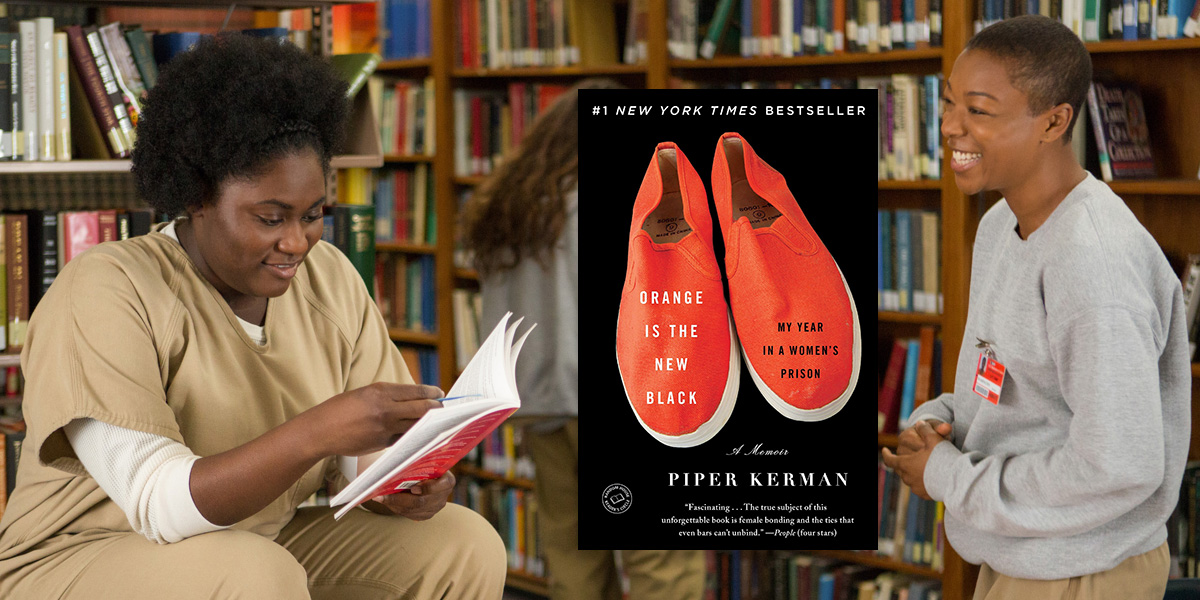
Piper Kerman, Orange Is the New Black: My Year in a Women’s Prison (2010)
Two hundred women, no phones, no washing machines, no hair dryers—it was like Lord of the Flies on estrogen.
*
Essential stats: The most important stat about “nice blond lady” Kerman’s extremely buzzy memoir of her time in a women’s federal prison is, of course, that it was adapted into the long running television show (2013-2019) of the same name, which in the New York Time’s look back at the decade in culture, Wesley Morris called “the best show on TV, in any format.” It was Netflix’s most watched original series this decade. In fact, many reviewers concluded that the show was much better than its source material—but then again, the show had a lot more time.
What did the critics say? Opinions were mixed. In Slate, Jessica Grose wrote:
If you pick up Kerman’s book looking for a realistic peek inside an American prison, you will be disappointed. Orange Is the New Black belongs in a different category, the middle-class-transgression genre. . . . The tales of these well-educated women follow essentially the same narrative arc: Girl is bored, girl seeks titillating transgression, girl regrets, girl renounces prior misdeeds, girl lives happily ever after. The girl never serves out a life sentence carving deadly points on toothbrushes or ends up a strung-out old lady on a street corner.
J. Courtney Sullivan was somewhat gentler in the Chicago Tribune, calling it “a perceptive, if imperfect inside look at our criminal justice system and the women who cycle through it.”

Ok, so the real import of the book is the show. What made that so good? As TIME’s TV critic Judy Berman wrote, Orange Is the New Black is the most important television show of the decade because not only was it good, but it smashed all the molds around it:
When it came to representation, this wasn’t merely the first prestige show since The Wire built around poor and nonwhite people—or the rare program intended for a general audience that featured more than a token queer regular. It also endowed each of these characters with stereotype-defying specificity. In 2014, when this magazine declared that America had reached a “transgender tipping point,” Laverne Cox’s breakthrough role as trans inmate Sophia Burset made her the face of that moment. For once, women whom mainstream society habitually ignored were being represented in pop culture as individuals with virtues and flaws, rather than as a monolithic mass of degenerates or vixens.
The show’s mix of gallows humor and high tragedy disrupted genre categories to the extent that the Emmys moved it from comedy to drama between Seasons 1 and 2. And over the years, its unflinching depiction of the American justice system has both mirrored and catalyzed intensifying debates around mass incarceration, private prisons, systemic racism, economic inequality and police violence against people of color. Some of these story lines have been controversial: Kohan got blowback for having a guard kill Samira Wiley’s bighearted Poussey Washington at the end of Season 4. Maybe the point was that even Litchfield’s gentlest inmate could be a casualty of police brutality, but many fans just saw another black body sacrificed in service of a plot twist. Still, the conversations that have come out of Orange’s perceived missteps have felt as vital as the ones around its successes.


Michael Lewis, The Big Short (2010)
What are the odds that people will make smart decisions about money if they don’t need to make smart decisions—if they can get rich making dumb decisions? The incentives on Wall Street were all wrong; they’re still all wrong.
*
Essential stats: This is really a book about the 2000s, of course, and what happened to the United States Housing bubble, and all of our credit, but as part of this decade has been defined by all the reeling that happened after the 2008 financial crisis, I think a book that unpacks it should count. Readers agreed; it spent 28 weeks on the New York Times bestseller list. It also was awarded the Robert F. Kennedy Center for Justice and Human Rights Book Award.
What did the critics say? They loved it. “The Big Short is not half the fun of Liar’s Poker, but it is more important,” wrote James Buchan in The Guardian. “Lewis, who lives in Paris, is too worldly to make his parade of short misfits and fantasists into American heroes. In one of those moments of self-knowledge that strike even financiers, Eisman understands that he was shorting not Wall Street but humanity itself. . . The American public has not yet grasped the nature and extent of this crime—but it will, it will.”
And of course, there’s the movie: which may have actually done more to explain what happened to people than the book (or maybe not, it was slightly confusing, and how is Batman involved, and will anyone ever let Jeremy Strong out of that same corporate conference room), and which won an Academy Award for Best Adapted Screenplay:
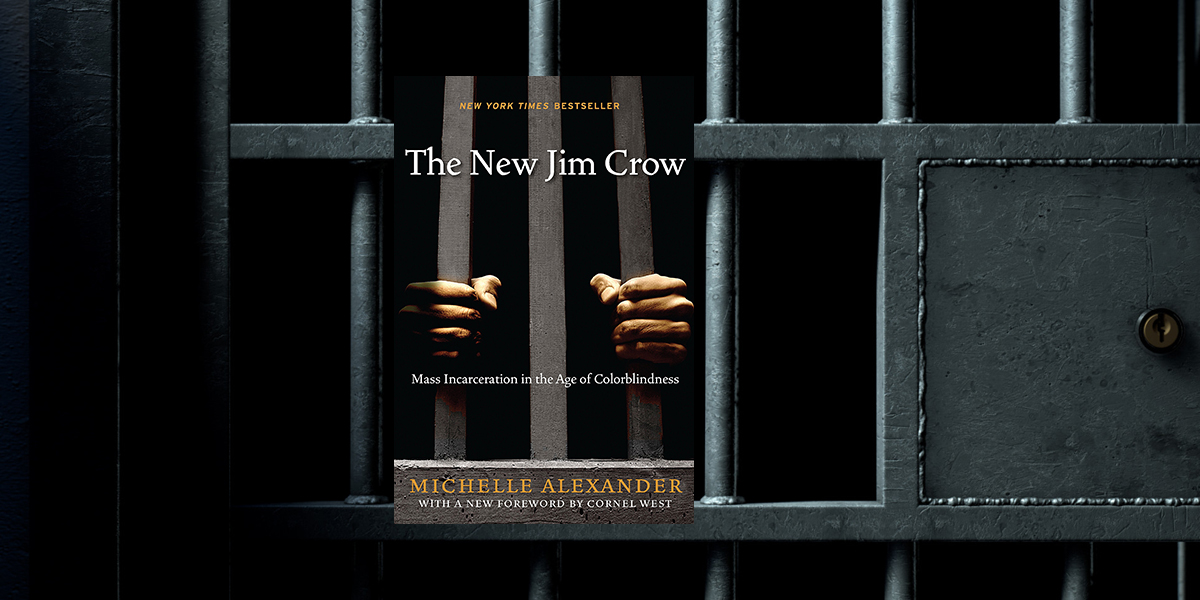
Michelle Alexander, The New Jim Crow (2010)
The nature of the criminal justice system has changed. It is no longer primarily concerned with the prevention and punishment of crime, but rather with the management and control of the dispossessed.
*
Essential stats: In this groundbreaking book, civil rights litigator and legal scholar Alexander argues, essentially, that mass incarceration is our generation’s version of Jim Crow. The New Jim Crow won a slew of awards and critical praise; in The New York Review of Books, Darryl Pinckney wrote that “the literature on race and the criminal justice system is extensive; the film documentaries about the problem tell us things we need to know; the jails keep filling with black and brown people.
Now and then a book comes along that might in time touch the public and educate social commentators, policymakers, and politicians about a glaring wrong that we have been living with that we also somehow don’t know how to face. The New Jim Crow: Mass Incarceration in the Age of Colorblindness by Michelle Alexander is such a work.
What was its impact? Take it from our own Olivia Rutigliano, who wrote:
I read Michelle Alexander’s The New Jim Crow when it first came out, and I remember its colossal impact so clearly—not just on the academic world (it is, technically, an academic book, and Alexander is an academic) but everywhere. It was published during the Obama Administration, an interval which many (white people) thought signaled a new dawn of race relations in America—of a kind of fantastic post-racialism. Though it’s hard to look back on this particular zeitgeist now (when, and I still can’t believe I’m writing this, Donald Trump is president of the United States) without decrying the ignorance and naiveté of this mindset, Alexander’s book called out this the insistence on a phenomenon of “colorblindness” in 2012, as a veneer, as a sham, or as, simply, another form of ignorance. “We have not ended racial caste in America,” she declares, “we have merely redesigned it.” Alexander’s meticulous research concerns the mass incarceration of black men principally through the War on Drugs, Alexander explains how the United States government itself (the justice system) carries out a significant racist pattern of injustice—which not only literally subordinates black men by jailing them, but also then removes them of their rights and turns them into second class citizens after the fact. Former convicts, she learns through working with the ACLU, will face discrimination (discrimination that is supported and justified by society) which includes restrictions from voting rights, juries, food stamps, public housing, student loans—and job opportunities. “Unlike in Jim Crow days, there were no ‘Whites Only’ signs.” Alexander explains. “This system is out of sight, out of mind.” Her book, which exposes this subtler but still horrible new mode of social control, is an essential, groundbreaking achievement which does more than call out the hypocrisy of our infrastructure, but provide it with obvious steps to change.
Here’s Alexander delivering a lecture at the University of Chicago in 2013:

Suzanne Collins, Mockingjay (2010)
It takes ten times as long to put yourself back together as it does to fall apart.
*
Essential stats: It sold 450,000 copies in the first week, and millions of copies since. And it was made into a movie, of course—nope, two major blockbusters, 2014’s The Hunger Games: Mockingjay – Part 1 and 2015’s The Hunger Games: Mockingjay – Part 1. I regret to tell you that while the Hunger Games movies are in general pretty good, these two are not at the top of the list.
Wait, which one was Mockingjay? Okay, yes, it was the third one. The Hunger Games, the book that introduced us all to Katniss Everdeen, was published in 2008, and its sequel, Catching Fire, was published in 2009. But since all four (4) of the movies came out in the last decade, I thought the trilogy/franchise/really genius idea deserved a mention.
Is it any good? Yes. I enjoyed the Hunger Games series in general, but I also appreciated this novel in particular. Unlike so many fantasy series and epic stories, in this book, Collins recognizes that her protagonist would be . . . well, pretty fucked up after everything she went through. And she’s not afraid to show it, and let her fail, and have PTSD. I mean, we all would, it’s just that it doesn’t exactly make for neat heroism, and so many writers and filmmakers ignore it. Anecdotally, it seems that Collins’s treatment of Katniss has started a shift towards emotional verisimilitude in characters like these, which may itself be a major defining moment of the decade.
Also, the series, and someone named PistolShrimps, gave us this, which I personally think about once a week (consider my decade defined):
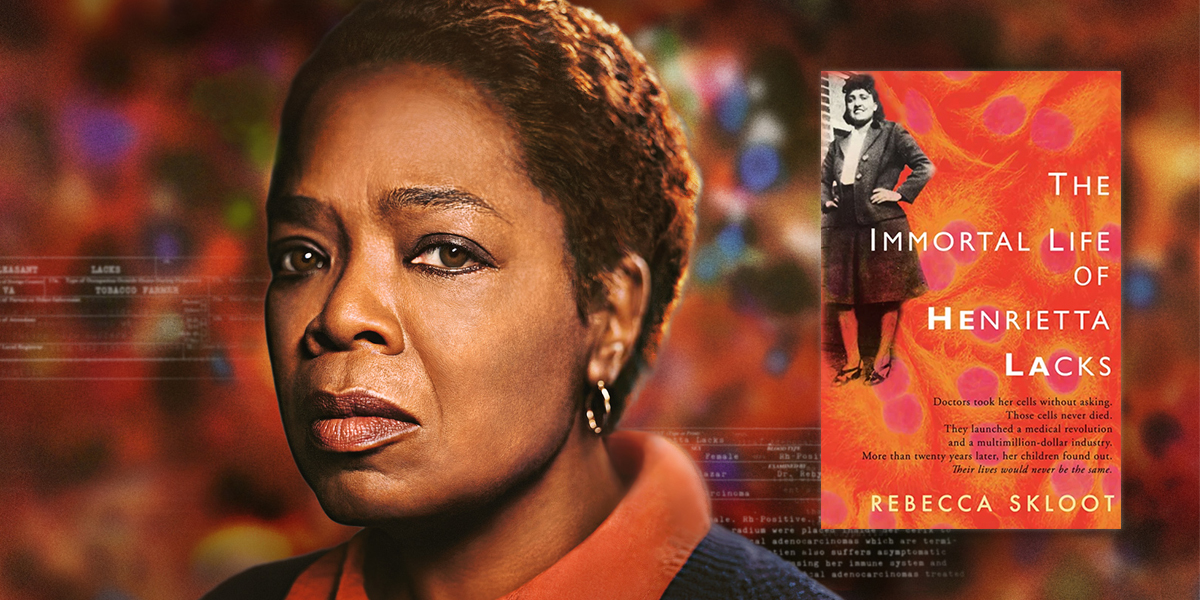
Rebecca Skloot, The Immortal Life of Henrietta Lacks (2010)
She’s the most important person in the world and her family living in poverty. If our mother is so important to science, why can’t we get health insurance?
*
Essential stats: Skloot’s groundbreaking work of history and science won the 2011 National Academies Communication Award, which recognized “excellence in reporting and communicating science, engineering, and medicine to the general public,” as well as the Heartland Prize, the Wellcome Trust Book Prize, and the American Association for the Advancement of Science’s Young Adult Science Book Award. The paperback spent 75 weeks on the New York Times bestseller list, and it is still widely taught in schools.
What made it defining? This book, which uncovered the story of an unknown woman whose cells—harvested without her permission or knowledge—became vital to medicine and science (in terms of developing the polio vaccine, for cloning, for gene mapping, etc.) was one of the first—if not the first—to tackle questions of how issues of race and class affected medical research for a general audience. It’s also the moving story of the Lacks family, who worked with Skloot on this book.
Plus, Oprah Winfrey and Rose Byrne starred in the movie:

Christopher Ryan and Cacilda Jethá, Sex at Dawn (2010)
The campaign to obscure the true nature of our species’ sexuality leaves half our marriages collapsing under an unstoppable tide of swirling sexual frustration, libido-killing boredom, impulsive betrayal, dysfunction, confusion, and shame.
*
Essential stats: Sex at Dawn spent three weeks on The New York Times best-seller list, starting at #24, and won the Ira and Harriet Reiss Theory Award in 2011.
Let’s get right to the drama. This book was incredibly divisive. Dan Savage loved it, calling it “the single most important book about human sexuality” since Kinsey’s Sexual Behavior in the Human Male. It was Peter Sagal of NPR’s favorite book of 2010. It received a lot of criticism from the academic world.
Why was it controversial? It argued, basically, that monogamy is not the natural state of human sexuality. Authors Ryan and Jethá defied conventional wisdom around the development of human sexuality by writing that human beings did not evolve to be monogamous. They drew on research from anthropology, primatology, and other fields to argue that the monogamous nuclear family structure was created for economic reasons after the rise of agrarian life, but that system did nothing to change human beings’ naturally promiscuous instincts, and misunderstanding those instincts has led to misinformation and unhappiness in modern life, also a lot of divorce. Unsurprisingly, this caused a bit of a stir!
Some anthropologists had explored similar ideas before, but Sex at Dawn’s extensive argument, coupled with a writing style geared toward a general audience, brought this conversation to many people for the first time.
How did the authors respond? In a piece for Psychology Today, Ryan wrote that critics who were getting worked up were “talking about themselves, often quite revealingly, at that.” Turns out people have a lot of feelings about monogamy.
So… should we all be polyamorous? Ryan told Salon in 2010 that “We’re not really arguing for any particular arrangement. We don’t even really know what to do with this information ourselves. What we’re trying to do in the book is give people a more accurate sense of where we came from, why we are the way we are, and why certain aspects of life feel like a bad fit. I think a lot of people make a commitment when they’re in love, which is a sort of a delusional state that lasts a couple of years at most. I think it was Goethe who said that love is an unreal thing, and marriage is a real thing, and any confusion of the real with the unreal always leads to disaster.” Great.
Ryan’s TED Talk:
–CS

Tana French, The Dublin Murder Squad Series (2010-2016)
Trust your instincts, Dad always says. If something feels dodgy to you, if someone feels dodgy, you go with dodgy. Don’t give the benefit of the doubt because you want to be a nice person, don’t wait and see in case you look stupid. Safe comes first. Second could be too late.
*
Essential stats: To be fair, Tana French’s Dublin Murder Squad series started in 2007, with the publication of her debut, In the Woods. It was followed by The Likeness (2008), Faithful Place (2010), Broken Harbor (2012), The Secret Place (2014), and The Trespasser (2016). (Her most recent novel, The Witch Elm, is a standalone.) So I’m counting the series as a whole, as it’s been primarily in this decade, despite the fact that my favorite of the books, The Likeness (obviously), is just shy of it. Most of her awards came for In the Woods, but Broken Harbor won the Los Angeles Book Prize and the Irish Crime Fiction Award. And the adaptation of the series has recently debuted on Starz.
Why were these so defining? Tana French has been a major crossover writer between the crime and literary genres; she also inspires fervent fandom. As Laura Miller wrote in The New Yorker:
French’s readers like to go online and rank the books . . . in order of preference, and while there’s no consensus, it’s taken for granted that anybody who’s read one will very shortly have read them all. The early copy of The Trespasser that I presented as a hostess gift this summer was greeted with ecstasy. The recipient spent much of the weekend shuffling around in a robe with the book clutched to her chest and a distracted expression on her face. Most crime fiction is diverting; French’s is consuming. A bit of the spell it casts can be attributed to the genre’s usual devices—the tempting conundrum, the red herrings, the slices of low and high life—but French is also hunting bigger game. In her books, the search for the killer becomes entangled with a search for self. In most crime fiction, the central mystery is: Who is the murderer? In French’s novels, it’s: Who is the detective?
Part of this is down to French’s unusual format. Unlike traditional series, each book has a different protagonist—usually one of the more minor characters from the book preceding it, which means that not only can each book be read as a standalone, but French can do a lot of emotional damage to her detectives (and ask the above question), without running into the whole Harry Potter in book five issue. The series is also, not for nothing, perfect for “binge reading,” which is apparently a thing these days.
Here’s the very atmospheric trailer for the adaptation:
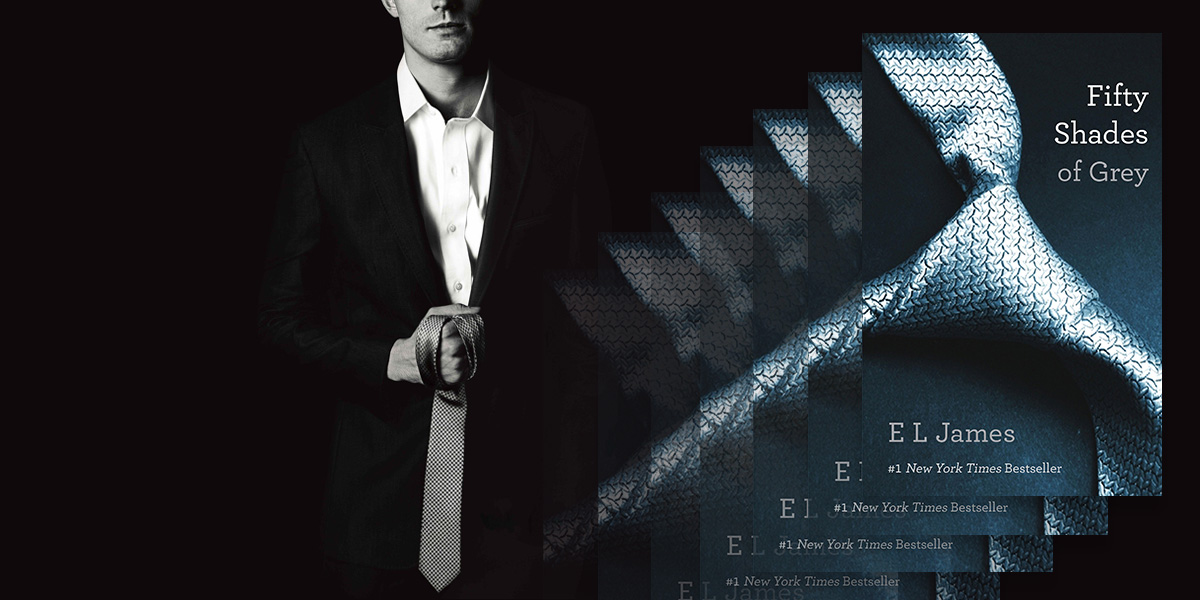
E. L. James, Fifty Shades of Grey (2011)
“Why don’t you like to be touched?”
“Because I’m fifty shades of fucked-up, Anastasia.”
*
Essential stats: Clocking in at a hefty 514 pages, this novel famously began as Twilight fan-fiction and then became the fastest-selling paperback in UK history. It vaulted James to the top of Forbes’s list of highest-earning authors in 2013 with a reported income of $95 million, was translated into 52 languages, and sold over 125 million copies worldwide (as of 2015).
Essential stats according to this industrious Amazon reviewer: “I have discovered that Ana says “Jeez” 81 times and “oh my” 72 times. She “blushes” or “flushes” 125 times, including 13 that are “scarlet,” 6 that are “crimson,” and one that is “stars and stripes red.” (I can’t even imagine.) Ana “peeks up” at Christian 13 times, and there are 9 references to Christian’s “hooded eyes” and 7 to his “long index finger.” Characters “murmur” 199 times and “whisper” 195 times (doesn’t anyone just talk?), “clamber” on/in/out of things 21 times, and “smirk” 34 times. Finally, in a remarkable bit of symmetry, our hero and heroine exchange 124 “grins” and 124 “frowns”… which, by the way, seems an awful lot of frowning for a woman who experiences “intense,” “body-shattering,” “delicious,” “violent,” “all-consuming,” “turbulent,” “agonizing” and “exhausting” orgasms on just about every page.”
Why the necktie? Oh:
And yet, the novel increased sales not of silk neckties, but of “soft cotton rope.”
What do the critics say? Mostly some shade of “ugh.” But Alessandra Stanley put it rather more elegantly in The New York Times, writing “Fifty Shades of Grey is to publishing what Spanx was to the undergarment business: an antiquated product re-imagined as innovation. . . . As female fantasies go, it’s a twofer: lasting love and a winning Mega Millions lottery ticket. And what is shameful about Fifty Shades of Grey isn’t the submissive sex, it’s the Cinderella story.”
Did your mom read it? No, my mom prefers Virginia Woolf.
Though to be fair, everyone’s mom likes this sort of thing:

George R. R. Martin, A Dance with Dragons (2011)
Kill the boy, Jon Snow. Winter is almost upon us. Kill the boy and let the man be born.
*
Essential stats: I mean, it’s . . . Game of Thrones? A Dance with Dragons, like all of the rest of the books, was a huge bestseller, and runs 1,040 pages and almost 415,000 words. In total, the books have sold more than 90 million copies worldwide, and been translated into almost 50 languages (last time anyone checked). And that’s with only 5 of a planned 7 novels completed and published, a fact which causes some fans feelings ranging from anxiety to extreme annoyance.
Why was it so important? The only one of George R. R. Martin’s A Song of Ice and Fire books that was published this decade is the most recent one, A Dance with Dragons, way back in 2011 (A Dance with Dragons = season 5). But there’s no denying that this series has been one of the biggest cultural phenomenons of the decade, if not the biggest, due primarily to the HBO adaptation that ran from 2011 to 2019. That’s almost wall-to-wall cultural relevance. It was absolutely the most discussed television show of the decade, and has been credited with popularizing the genre of fantasy for general consumers (or maybe just making budgets for fantasy television projects balloon). You could (and can) buy every type of related merch, even your own six foot Iron Throne. (Why??) It even inspired Taylor Swift’s latest album.
But wait, isn’t it all about rape and violence and gratuitous female nudity and that one white savior lady? Well, yes. What country do you think you live in? But yeah, though I read and enjoyed the books, I had to stop watching the show at a certain point. Just not worth it. Dragons are very cool, though. Who wants to play D&D later?
Actually, it’s pretty much just a ludicrous soap opera:
And how about that ending?
Hey, who’s better, George R. R. Martin or J. R. R. Tolkien? You’ll just have to decide for yourself:

David Foster Wallace, The Pale King (2011)
How odd I can have all this inside me and to you it’s just words.
*
Essential Stats: Wallace’s unfinished opus of “loneliness, depression and the ennui that is human life’s agonized bedrock” was a finalist for the 2012 Pulitzer Prize and the talk of the book world in the Spring of 2011. Coming in at 548 pages (brief, by Infinite Jest standards), it consists of 50 relatively standalone chapters, many of which focus on the experiences of a handful of employees of the IRS in Peoria, Illinois in 1985.
Wait a second…didn’t David Foster Wallace die in 2008? No flies on you. Indeed he did die, but before his suicide Wallace organized the unfinished manuscript chapters of his third novel in such a way that they could be found by his widow Karen Green, and edited into coherence by his friend and editor Michael Pietsch.
So…is it any good? Well, that depends on who you ask. Most reviewers seemed awed and frustrated in equal measure. The New York Times’ Michiko Kakutani called it “breathtakingly brilliant and stupefying dull—funny, maddening and elegiac.” Jonathan Raban, in his mixed New York Review of Books assessment, wrote: The best one can do is to imagine The Pale King as half a book, at most, and believe its author to have been capable of pulling off the miracle in its unwritten pages—which isn’t inconceivable.” The consensus seems to be that The Pale King is an exhausting, but ultimately worthy, undertaking for DFW stans.
Well, that’s a relief. So his reputation remains unblemished? Em . . . sort of . . . I guess. . . mostly. . .
Perhaps you would like to see some monologues from The Pale King by famos:
–DS

Walter Isaacson, Steve Jobs (2011)
One way to remember who you are is to remember who your heroes are.
*
Essential stats: Isaacson’s landmark biography of Steve Jobs—who, not for nothing, has had a major hand in defining this decade for all of us, for good or ill (spoiler: ill)—was published in October 2011, just 19 days after Jobs’ death. By December, it was already Amazon’s best-selling book of the year. Obviously, it was immediately turned into a film, written by Aaron Sorkin, directed by Danny Boyle, and starring Michael Fassbender as Jobs.
Why was it defining? The cover alone is iconic—and it’s the only part of the book Jobs asked for oversight on. (It’s from a 2006 Fortune magazine photoshoot, and was shot by Albert Watson on film.) But it also marked the end of an era, especially for those who had grown up while Jobs was a world-changing superstar, and worshipped him (my father has a literal book called Are you a Mac Person or a PC Weenie?). And more importantly, as Janet Maslin writes in The New York Times,
Mr. Isaacson treats Steve Jobs as the biography of record, which means that it is a strange book to read so soon after its subject’s death. Some of it is an essential Silicon Valley chronicle, compiling stories well known to tech aficionados but interesting to a broad audience. Some of it is already quaint. . . . And some is definitely intended for future generations.
Can I help myself? No, I’m afraid I am a huge dork, sorry not sorry.

Téa Obreht, The Tiger’s Wife (2011)
The dead are celebrated. The dead are loved. They give something to the living. Once you put something into the ground, Doctor, you always know where to find it.
*
Essential stats: Obhret’s debut novel was a finalist for the National Book Award, and the winner of the Orange Prize for Fiction in 2011—and oh right, she was 25 at the time, which made her the youngest writer ever to receive the latter honor. In 2010, Obreht was named as one of the New Yorker‘s 20 Under 40 and one of the National Book Foundation’s 5 Under 35. Also, the novel sold like hotcakes. You read it. Your friends read it. Your mom read it. Your mom’s friends read it. Look, American love a wunderkind (and sometimes they also love very good books).
What did the critics say? They were pretty much all about it. Michiko Kakutani called it “a hugely ambitious, audaciously written work that provides an indelible picture of life in an unnamed Balkan country still reeling from the fallout of civil war,” and Liesl Schillinger put her finger on the very thing that always so impresses me about Obreht’s writing, that it is “filled with astonishing immediacy and presence, fleshed out with detail that seems firsthand, The Tiger’s Wife is all the more remarkable for being the product not of observation but of imagination.”
Watch Obreht read a bit of the book:

Colson Whitehead, Zone One (2011)
New York City in life was much like New York City in death. It was still hard to get a cab, for example.
*
Essential stats: It was a New York Times bestseller, and much discussed in hushed terms for being a zombie novel written by a literary novelist—like, so crazy, right you guys, pass the Brie?
Why was it defining? This was a decade of genre-bending, and smashing, and dissolving, and while literature has always played with forms and mixed its pots, Whitehead’s literary zombie novel still felt boundary-pushing. Or as Dan Kois put it recently in Vulture:
In a century marked by the erosion of the high-low divide that once separated “literature” from genre fiction, Zone One is the exemplary hybrid, the paragon of what each mode offers the other. Whitehead’s post-apocalyptic experiment—a zombie novel that’s also a 9/11 meditation that’s also a cultural satire—delivers both moving psychological realism and satisfying gore. (The moment when hero Mark Spitz discovers his undead mother feasting on his dad’s corpse will stay with me until the day a zombie chows down on mine.) Whitehead has written terrific novels that more directly address the horrors of American history, but never one that more accurately portrays the horrors of the American present.
The fact that this seems pretty commonplace now (the genre-bending, not the undead mother feasting, it seems important to say) only goes to show the influence Zone One, and other works like, have had on our cultural appetites.
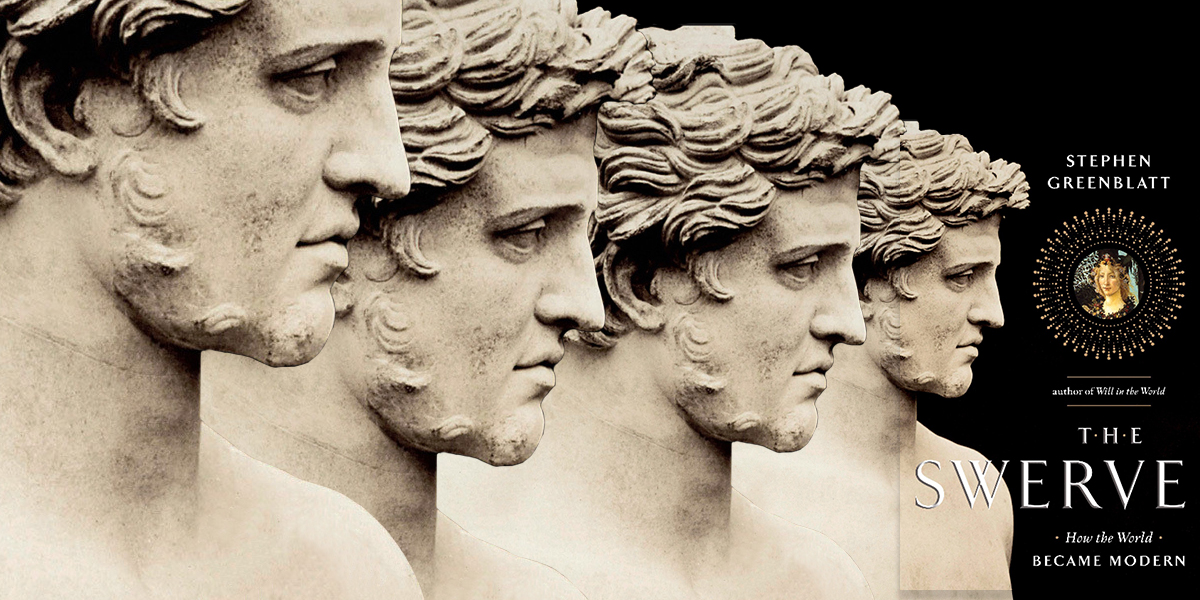
Stephen Greenblatt, The Swerve: How the World Became Modern (2011)
The greatest obstacle to pleasure is not pain; it is delusion.
*
Essential stats: Historian Stephen Greenblatt’s book about the origin of modernity (in a text by Lucretius) won the 2011 National Book Award for Nonfiction and the 2012 Pulitzer Prize for Nonfiction, and provoked much discussion, especially among literary types charmed by the idea that a single book—a single poem!—could have catalyzed the Renaissance.
I remember when everyone was reading this. But didn’t it get debunked or something? Lots of critics loved it. But some, especially historians, noted a disturbing lack of academic rigor and discordance with contemporary scholarship about the Middle Ages in particular.
In his 2012 essay “Why Stephen Greenblatt is Wrong—and Why It Matters” in the Los Angeles Review of Books, Jim Hinch was blunt:
Simply put, The Swerve did not deserve the awards it received because it is filled with factual inaccuracies and founded upon a view of history not shared by serious scholars of the periods Greenblatt studies … The Swerve, in fact, is two books, one deserving of an award, the other not. The first book is an engaging literary detective story about an intrepid Florentine bibliophile named Poggio Braccionlini … brimming with vivid evocations of Renaissance papal court machinations and a fascinating exploration of Lucretius’s influence on luminaries ranging from Leonardo Da Vinci, to Galileo, to Thomas Jefferson, is wonderful. The second Swerve is an anti-religious polemic … Greenblatt’s caricatured Middle Ages might have passed muster with Enlightenment-era historians. Present-day scholarship, especially the findings of archeologists and specialists in church and social history, tells a vastly more complicated, interesting and indeterminate story … it is simply untrue to assert that classical culture was ever lost, ignored or suppressed during the Middle Ages … The Swerve claimed for itself, and received, huge moral and cultural authority it simply didn’t earn.
In 2016, Greenblatt won the prestigious international Holberg Prize, “awarded annually to scholars who have made outstanding contributions to research in the humanities, social sciences, law or theology,” prompting Laura Saetveit Miles, a Professor at the University of Bergen, to write that “The Swerve doesn’t promote the humanities to a broader public so much as it deviously precipitates the decline of the humanities, by dumbing down the complexities of history and religion in a way that sets a deeply unfortunate precedent.
If Greenblatt’s story resonates with its many readers, it is surely because it echoes stubborn, made-for-TV representations of medieval “barbarity” that have no business in a nonfiction book, much less one by a Harvard professor.
. . .
And as I read, the normal person inside me thought: It is important for academics to write in this accessible style and reach broader audiences with stories about the past! This is the great story of modernity!
When I finished, I put down The Swerve on the table, and the academic side of my brain kicked back in. I had let myself read it as fiction. Yet it was supposed to be not fiction. When I thought of it as a scholarly book, and thought of all those thousands and thousands of people out there who read it and believed every word because the author is an authority and wins prizes, I realized: This book is dangerous.
Dangerous or not, a lot of people read it—and it stands in for the ongoing question of why we read things in this decade, and what pleasurable writing allows us to ignore (or accept).

John Jeremiah Sullivan, Pulphead (2011)
When Lytle was born, the Wright Brothers had not yet achieved a working design. When he died, Voyager 2 was exiting the solar system. What does one do with the coexistence of those details in a lifetime’s view? It weighed on him.
*
Essential stats: While not a major bestseller like some of the other books on this list, Pulphead was widely adored by both readers and critics—and its best essay, “Mister Lytle” won a National Magazine Award and a 2011 Pushcart Prize.
What did the critics say? They were universally on board. “In January, John Jeremiah Sullivan entered my life like a crashing meteor,” Ed Caesar wrote in the Sunday Times. “My reaction—and, I now discover, the reaction of many new arrivals at the church of John Jeremiah—was simple and confounded: where had this guy been all our lives?”
What made it defining? As I’ve written before, Pulphead was emblematic of a resurgence of the American essay as a popular literary form. Plus, it touches a lot of American life. Plus plus, it’s devastatingly good.
As a public service, here’s where to read that essay: “Mister Lytle: An Essay”
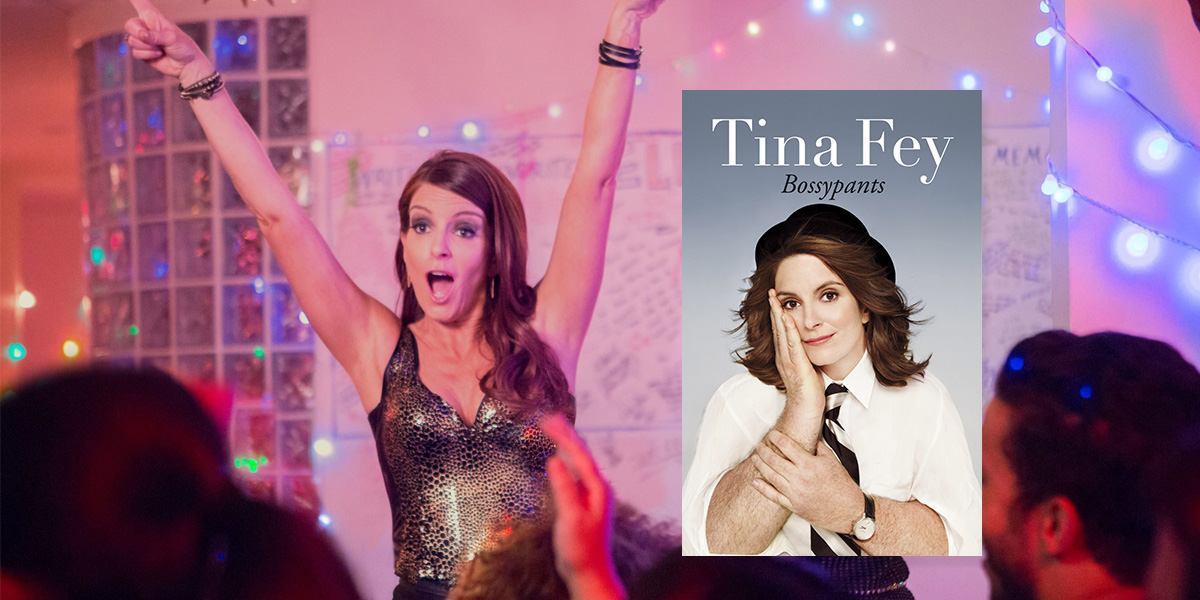
Tina Fey, Bossypants (2011)
If you retain nothing else, always remember the most important rule of beauty, which is: who cares?
*
Essential stats: After a reported $6 million advance, Bossypants sold 3.75 million copies in 5 years. No slouch, Tina.
Why was it defining? It kind of opened the floodgates—or as US News put it, “confirmed a market” for sharp, funny, nonfiction by female comedians, like Mindy Kaling’s Is Everyone Hanging Out Without Me? (2011) and Amy Poehler’s Yes Please (2014). At the very least, it’s one of the best, if not the very best, of that rapidly-expanding genre. “Bossypants isn’t a memoir,” Janet Maslin wrote. “It’s a spiky blend of humor, introspection, critical thinking and Nora Ephron-isms for a new generation.” And for at least some of the new generation, it’s worked.
Here’s an excerpt from the audiobook, which also sold like crazy on Audible:

Ernest Cline, Ready Player One (2011)
You’d be amazed how much research you can get done when you have no life whatsoever.
*
Essential stats: Ernest Cline’s big-hearted, 80s nostalgia-sodden, gleefully nerdy debut novel—which tells the story of an orphan teenage boy in a dystopian United States who enters a worldwide VR game in search of an Easter egg that promises a fortune to the finder—was a New York Times bestseller, translated into twenty languages, and made Cline, in the words of USA Today’s Oldenburg, “the hottest geek on the planet.”
So how many 80s pop culture references does the book contain? So, so many. A ludicrous amount, really. Everything from The A-Team to WarGames, Pac-Man to The Breakfast Club, Donkey Kong to Heathers. If you’re so inclined, you can scroll through this complete list.
What of the inevitable movie adaptation? Thankfully, Steven Spielberg snapped up the rights before Moby could, and last year turned Cline’s puzzle box labor of love into a $175 million CGI juggernaut which, though certainly not without its critics, was generally well-received and grossed $580 million.
If you’re hungry for even more 80s geekery and meta shenanigans: Will Wheaton (of Star Trek: The Next Generation fame), who is mentioned briefly in one of the chapters, narrates the audiobook.
And perhaps you would like to have every single video game in the book explained for you?
–DS

Andy Weir, The Martian (2011)
Yes, of course duct tape works in a near-vacuum. Duct tape works anywhere. Duct tape is magic and should be worshiped.
*
Essential stats: Weir’s self-published “nerd thriller” became a bestseller before it was even a book, and then once it was a book, it became an even bigger bestseller (we’re talking #1 New York Times bestseller), and then a huge blockbuster movie. No big deal.
What makes it defining? This was a decade of digital DIY, in which you could build a brand from your living room and get internet famous, which then sometimes translated to actual famous. Not able to get a literary agent, Weir self-published The Martian on his website in serial form in 2011, and eventually, after requests from readers who wanted to download it to their Kindles, put it on Amazon, for 99 cents, the lowest price the site allows. He sold 35,000 copies in three months. He signed with a literary agent, and Crown Publishing purchased the rights to the book for six figures and re-released it in 2014, and then Ridley Scott adapted it into a film starring Matt Damon in 2015.
Speaking of Matt Damon: Someone actually calculated the (fictional) cost of rescuing Matt Damon over the years. It’s . . . a lot.
Courage Under Fire (Gulf War 1 helicopter rescue): $300k
Saving Private Ryan (WW2 Europe search party): $100k
Titan A.E. (Earth evacuation spaceship): $200B
Syriana (Middle East private security return flight): $50k
Green Zone (US Army transport from Middle East): $50k
Elysium (Space station security deployment and damages): $100m
Interstellar (Interstellar spaceship): $500B
The Martian (Mars mission): $200B
TOTAL: $900B plus change


Denis Johnson, Train Dreams (2011)
He liked the grand size of things in the woods, the feeling of being lost and far away, and the sense he had that with so many trees as wardens, no danger could find him.
*
Essential stats: Johnson’s novella was first published in the Summer 2002 issue of The Paris Review; in this version, it won the O. Henry Award and the Aga Khan Prize for fiction. When it was republished by FSG in 2011, it became a finalist for the 2012 Pulitzer, though no prize was awarded that year (a travesty, we have all agreed, here in the Literary Hub office—though Michael Cunningham has tried to explain it somewhat). It’s the second-most revered book from one of contemporary literature’s most revered writers. It even made the bestseller list.
Why was it defining? Well, I like to believe that this decade was defined in some part by sheer literary excellence. Naive, I know—so I suppose I’ll have to say nostalgia. As K. Reed Petty put it over at Electric Literature:
According to the jacket copy of my edition of Train Dreams, Denis Johnson’s book “captures the disappearance of a distinctly American way of life.” That’s true, but the lost era this novella mourns isn’t the frontier life of our hero, Robert Grainier, in the early twentieth century. It’s 2006, or maybe 1998 or 1981, when we still believed in cowboys (and even called one President).
Train Dreams is a gorgeous, rich book about the classic American myth, but written for a country that’s lost faith in its own mythology.
And maybe it was defining because it wasn’t like anything else we had. And maybe because it was one of those books that a certain kind of person pushed into the hands of everyone they knew. There is some special magic in this book, that is all I know.

Daniel Kahneman, Thinking, Fast and Slow (2011)
A reliable way to make people believe in falsehoods is frequent repetition, because familiarity is not easily distinguished from truth. Authoritarian institutions and marketers have always known this fact.
*
Essential stats: This popular psychology book by Kahneman, laureate of the Nobel Prize in Economics, laid out two different ways the brain thinks—and what that means for our ability to reason and make choices. It was awarded the 2011 Los Angeles Book Prize, and the 2012 National Academies Communication Award, which recognized “excellence in reporting and communicating science, engineering, and medicine to the general public.” It was also a huge global bestseller, selling a million copies its first year.
What was its impact? As The Guardian put it, it “changed the way we think about thinking.” In a review of the book in The Globe and Mail, Janice Gross Stein wrote:
It is impossible to exaggerate the importance of Daniel Kahneman’s contribution to the understanding of the way we think and choose. He stands among the giants, a weaver of the threads of Charles Darwin, Adam Smith and Sigmund Freud. Arguably the most important psychologist in history, Kahneman has reshaped cognitive psychology, the analysis of rationality and reason, the understanding of risk and the study of happiness and well-being. He is among a handful of founders of the field of behavioral economics, a branch of economics that is challenging long-standing economic theory and reshaping the making of public policy. Kahneman’s work speaks to everyone who struggles to understand why human beings think the way they do.
For his part, Steven Pinker called him “the world’s most influential living psychologist,” and told The Guardian that
he pretty much created the field of behavioral economics and has revolutionized large parts of cognitive psychology and social psychology. His central message could not be more important, namely, that human reason left to its own devices is apt to engage in a number of fallacies and systematic errors, so if we want to make better decisions in our personal lives and as a society, we ought to be aware of these biases and seek workarounds. That’s a powerful and important discovery.
But, he points out, while “Thinking, Fast and Slow is an interesting capstone to his career . . . his accomplishments were solidified well in advance of writing it and they’d be just as significant without the book. His work really is monumental in the history of thought.”
Here’s Kahneman’s 2010 TED Talk:
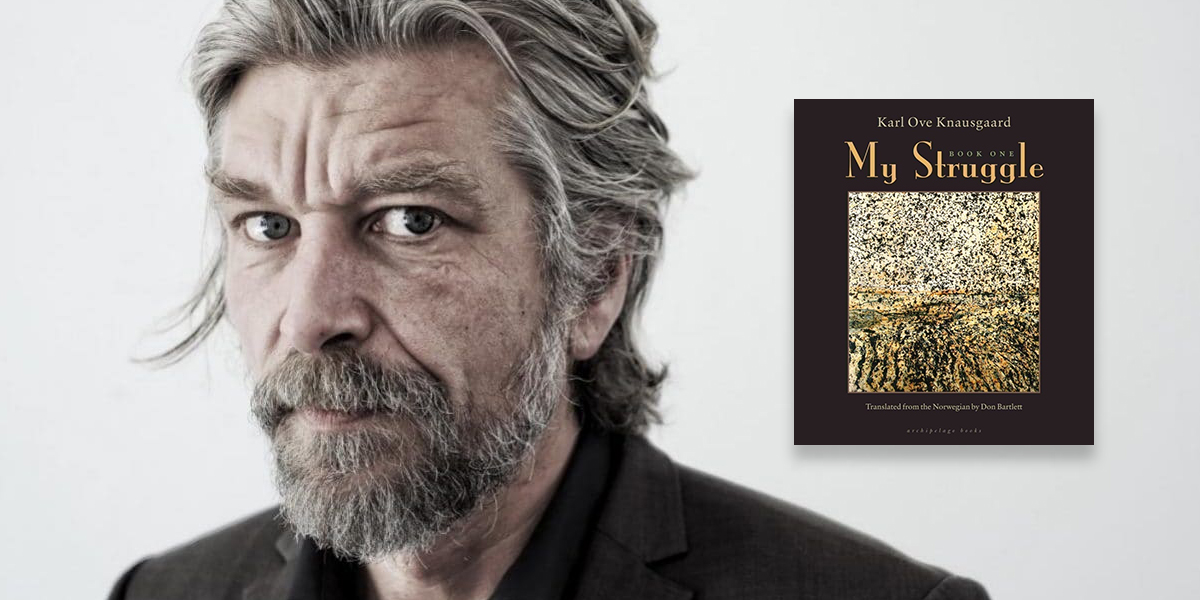
Karl Ove Knausgaard, tr. Don Bartlett, My Struggle: Book 1 (2012)
As your perspective of the world increases not only is the pain it inflicts on you less but also its meaning. Understanding the world requires you to take a certain distance from it. Things that are too small to see with the naked eye, such as molecules and atoms, we magnify. Things that are too large, such as cloud formations, river deltas, constellations, we reduce. At length we bring it within the scope of our senses and we stabilize it with fixer. When it has been fixed we call it knowledge.
*
Essential stats: the first of six books, which would total some 3,600 pages, and which were massive bestsellers in his native Norway, put up modest sales in the US and UK but had outsize impact on the literary landscape.
Why was it defining? A Knausgaard stand-in appeared on Younger feeding candy to Hannah Montana in Sockerbit, which is how, if you’re any sort of publishing-adjacent person, you really know you’ve made it:

Why was it really defining? There are only a few modes of literature that could be said to have definitively defined the decade, and one of them is “autofiction,” of which Knausgaard is the Platonic ideal—or as John Williams put it, “the sun in this genre’s planetary system.” Tying the My Struggle series to Elena Ferrante’s Neapolitan novels (see below), Charles Finch recently wrote:
In overlapping moments, these two Europeans’ respective multivolume novels won huge rapid fame — for being highly personal, very long and perhaps more than anything for the unusual, almost guilty intensity with which people devoured them. (As The Times’s Dwight Garner memorably commented, reading the first volumes of Knausgaard’s My Struggle was like “falling into a malarial fever.”) Above all, they were close to identical in their most serious and unexpected offer to the reader: unmediated access, over many pages, to precisely one other consciousness.
. . .
Knausgaard and Ferrante promise so little. But they give it. Each recounts, in the close first person, the inside of a human life. That’s something innumerable writers have done, obviously, but they seemed to do it in a newly dangerous way — with a pitiless, dispassionate modesty of ambition. Neither narrator extrapolates larger truths from experience. Both trust themselves as far as their own fingertips; Ferrante portrays the intricate social world of working-class Naples, but in a state of constantly renewed bafflement, while Knausgaard (“He broke the sound barrier of the autobiographical novel,” the novelist Jeffrey Eugenides told a reporter for The New Republic) abandons almost all narrative pretense to describe his time on earth as straightforwardly as he can.
The effect this method had on me, and I believe on many people, was one of immediate trust and identification. Somewhere in the stretch between Sept. 11, 2001, and the 2016 election, such limited claims to certainty came to seem not unambitious, but like the only sane rejoinder to the world as it had become. And the length of the books — their uncompressed, occasionally boring plots — created a profound new version of the self-forgetting that the best stories give us.
But are the books amazing or boring? Both, I guess. General consensus in the literary office is that the first book is good, and that the rest of the series descends into annoying navel gazing. This writer’s belief is that the first paragraph of the first book is good, and the rest of the series descends into annoying navel gazing. Don’t @ me with your pearl clutching, Karl Ove stans.
Extra credit: Knausgaard on John Fosse · Knausgaard on ice cream · Knausgaard on writing
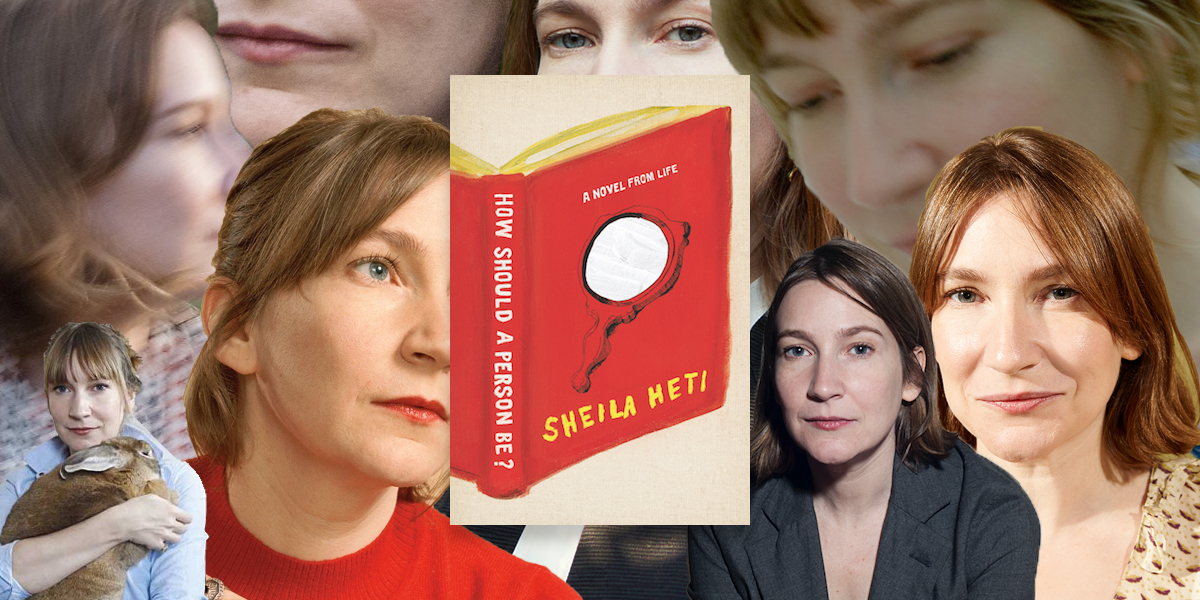
Sheila Heti, How Should a Person Be? (2012)
We live in an age of some really great blow-job artists. Every era has its art form. The nineteenth century, I know, was tops for the novel.
*
Essential stats: It was published in Canada in 2010, and in the US in 2012, after being turned down a bunch.
Why was it so important? How Should a Person Be? is one of the early examples of a literary mode that would itself define the decade: autofiction. It is subtitled “A Novel from Life,” which back in 2012 seemed necessary to explain, as David Haglund did:
What the phrase means to acknowledge is that the novel’s (occasional) action and (incessant) dialogue are largely, though not entirely, factual. The narrator is named Sheila, and the narrator’s friends share first names and occupations with Heti’s real-life friends and collaborators, among them the critic and artist Sholem Krishtalka, the writer and teacher Misha Glouberman (with whom Heti wrote a book of pop philosophy, “The Chairs Are Where the People Go,” published last year), and the painter and filmmaker Margaux Williamson — all of whom, like Heti, live in Toronto, where the book mostly takes place.
Critics couldn’t decide whether it was genius and groundbreaking or insufferable and navel-gazing, which sounds more or less like life to me.

Hilary Mantel, Bring Up the Bodies (2012)
Truth can break the gates down, truth can howl in the street; unless truth is pleasing, personable and easy to like, she is condemned to stay whimpering at the back door.
*
Essential Stats: The second installment in Hilary Mantel’s barnstorming historical fiction trilogy was, like its predecessor, a bestselling, Booker Prize-winning blockbuster of a novel. It was critically-acclaimed, sold a million copies, and was made into a Golden Globe-winning BBC miniseries. It also won the Costa Book Award and was a finalist for the Walter Scott Prize for Historical Fiction.
People are really into sixteenth century English political intrigue then, huh? So it would appear. Thanks to Mantel’s gripping revivification of the court of King Henry VIII, Thomas Cromwell has become one of the most iconic literary characters of the last decade.
It’s been nearly eight years. When will we get to read the concluding volume? Soon! The final part of the trilogy, The Mirror and the Light—which will cover the last four years of Cromwell’s life, from the death of Anne Boleyn to Cromwell’s own execution—is scheduled for release in March 2020.
Will Mantel take home the Booker for that one too? She’s on a serious hot streak, so quite possibly, but as Francis Ford Coppola, Sam Raimi, and the Wachowskis will tell you: it ain’t easy to stick the landing. Already the only woman to win the Booker twice, if The Mirror and the Light does go all the way, Mantel will become the first author in the Prize’s fifty-year history to three-peat.
Here’s the trailer for the Wolf Hall television show:
–DS

Gillian Flynn, Gone Girl (2012)
Cool Girl never gets angry at her man.
*
Essential stats: 432 pages; New York Times hardcover fiction #1 bestseller for 8 weeks; 26 weeks on NPR’s hardcover bestseller list; sold more than two million copies in the first year; adapted into a David Fincher movie with Ben Affleck and Rosamund Pike; made being a “cool girl” way more frightening than it already was.
What made it a phenomenon? The unconventional plot twist, the unreliable (and very, very, bad) female protagonist, the paranoid portrayal of a marriage gone far far awry.
But is it actually any good? I’d say . . . yes. Despite the fact that my esteem for it began fading as soon as I finished the last page, I enjoyed the hell out of it while it lasted, and it certainly ticks a lot of boxes, including those marked “ingenious” and “scary” and “pretty sexy”. Not bad!
I mean, relatable:
Your girl Gillian on Armchair Expert:

Cheryl Strayed, Wild (2012)
I knew that if I allowed fear to overtake me, my journey was doomed. Fear, to a great extent, is born of a story we tell ourselves, and so I chose to tell myself a different story from the one women are told. I decided I was safe. I was strong. I was brave. Nothing could vanquish me.
*
Essential stats: Everybody read this book, a memoir of Strayed’s turbulent youth and her hike along the Pacific Crest Trail. It was a #1 New York Times bestseller for 7 weeks and a general betseller for longer (the paperback, published in 2013, was on the list for 126 weeks), the first selection for Oprah’s Book Club 2.0., and adapted into a film by (and starring) Reese Witherspoon.
What’s its legacy? This is the book that launched a thousand hiking trips—including that of one Lorelai Gilmore, though to be fair, she doesn’t make it past the pissy park ranger in the recent Netflix revival of Gilmore Girls. The book also launched the career of Cheryl Strayed, who is also known as Dear Sugar. Plus, it’s pretty great. (Just ask Jessie Gaynor, Lit Hub’s resident Wild mega-fan.)


John Green, The Fault in Our Stars (2012)
Maybe okay will be our always.
*
Essential stats: When The Fault in Our Stars was published in 2012, John Green was already strongly A Thing. He had already published five other novels (his debut, Looking For Alaska won the Michael L. Printz Award in 2006) and he was a pioneering vlogger (please enjoy that two-word time capsule). The Fault in Our Stars is the story of two teenagers who meet at a cancer support group and fall in love. Tears were jerked, unrealistic expectations about high school relationships were set, and copies were sold. The book debuted at #1 on the New York Times Best Seller list for children’s chapter books, and held onto that spot for seven weeks. As of 2014, it had sold over 10 million copies.
Did the critics like it? Sure—they’re not made of stone! In her review at NPR, Rachel Syme said of Green: “[He] writes books for young adults, but his voice is so compulsively readable that it defies categorization. He writes for youth, rather than to them, and the difference is palpable.” Writing for Time, Lev Grossman called it “damn near genius.”
But did Willem Dafoe like it? Enough to appear in the 2014 film adaptation, along with Shailene Woodley, Ansel Elgort, and Laura Dern.
Okay?
Okay.
–JG

Ben Fountain, Billy Lynn’s Long Halftime Walk (2012)
Somewhere along the way America became a giant mall with a country attached.
*
Essential stats: This satirical war novel—about a group of Iraq War veterans who, after being captured on film embroiled in a brief but intense firefight, are hailed as heroes and sent on a surreal victory tour of the US—was a New York Times bestseller, won the National Book Critics Circle Award, and was a finalist for the National Book Award. It was also adapted into a feature film by Ang Lee.
Would you call it Catch-22 for the Iraq War generation? Well, Joseph Heller’s novel is more mad-cap and surreal, but they’re both biting examinations of how the American war machine is marketed and fed, so yes, I suppose I would.
Was it reviewed by any real-life veterans? Indeed it was. Reviewing the novel for the Daily Beast, author and Iraq War vet Matt Gallagher wrote of Billy Lynn:
This postmodern swirl of inner substance, yellow ribbons, and good(ish) intentions is at the core of Ben Fountain’s brilliant Bush-era novel, Billy Lynn’s Long Halftime Walk… For more than a decade, service members have returned home from Iraq and Afghanistan to find themselves strangers in strange lands, from Disney World to the Mall of America to Texas Stadium. No, Billy Lynn isn’t satire topped with sprinkles of realism. It’s the exact opposite, and Fountain does an estimable job of channeling that experience and psychology. And he does so not with the wit and winking of the jester, but with the blunt ferocity of the herald.
What happened with the film adaptation? It was the first ever feature film using an extra-high frame rate of 120 frames per second (?), which presented a significant number of logistical challenges for Lee and his team, from the cast not being able to wear make-up or utilize traditional film lighting to the realization that only five theaters in the entire world were equipped to show it at its highest resolution and maximum frame rate. While it did receive some positive reviews, overall critics and audiences were left a little cold by Lee’s technological innovations.
Here’s the trailer, in case you haven’t seen it:
–DS
Edward St. Aubyn, The Patrick Melrose Novels (2012)
People never remember happiness with the care that they lavish on preserving every detail of their suffering.
*
Essential stats: This Picador omnibus contains the first four Patrick Melrose novels: Never Mind, Bad News, Some Hope, and Mother’s Milk.
Hang on, aren’t these books from the ’90s? Well, yes. St. Aubyn first published Never Mind, the first novel in the series, in 1992—but it was the publication of this garishly-colored omnibus in 2012 that turned the underground whispers I had been hearing forever into roars. Plus, as it was meant to, it fast-tracked readers to At Last, the final installment of the Patrick Melrose saga, which also came out in 2012.
And then, of course, there was the BBC miniseries, a 2018 Benedict Cumberbatch passion project that brought even more attention to the quietly perfect books.
So what makes them defining? In the decade of autofiction, they both were and weren’t—they offered an alternate path to the Knausgaard/Heti/Lerner mode: a much more British one. Plus, for a while there it felt like there were only two types of people: those who loved the Patrick Melrose novels, and those who had never heard of them.

Susan Cain, Quiet: The Power of Introverts in a World That Can’t Stop Talking (2012)
There’s zero correlation between being the best talker and having the best ideas.
*
Essential stats: Cain’s accessible explainer, or as one critic put it, “part affirmation, part social commentary, part self-help primer,” on introversion—and how the world (and especially the workplace) is set up to reward extraversion instead—was on the hardcover bestseller list for 16 weeks, and in paperback, it hung on for 138 weeks. By 2015, it had sold 2 million copies worldwide.
What was its impact? It seems like common knowledge now, but many people had never been aware of the true differences between introverts and extroverts before reading—or hearing about—this book. Anecdotally, I know several people who read it and felt like something about their lives had finally been solved, and non-anecdotally, they weren’t alone. Cain’s book did a lot to popularize the term, and certainly to help it enter our everyday lexicon: as Laura M. Holson writes in The New York Times, “it is at least partly because of her efforts that The Huffington Post, BuzzFeed and the like are now teeming with personality quizzes and posts like Can You Survive This Party as an Introvert? and 26 Cat Reactions Every Introvert Will Understand.”
Cain’s TED talk on the power of introverts:

Robert A. Caro, The Passage of Power (2012)
Ask not what you have done for Lyndon Johnson, but what you have done for him lately.
*
Essential stats: The 736-page tome won the National Book Critics Circle Award, the Los Angeles Times Book Prize (2012; Biography), the Mark Lynton History Prize, the American History Book Prize, and the Biographers International Organization’s Plutarch Award, and was a finalist for the National Book Award for Nonfiction. Whew.
Um, LBJ in the 2010s? Yes, obviously this is a history book about LBJ, the final installment in the series Caro began in 1982, so it’s not as immediately topical or groundbreaking as some of the others on the list, but it is widely acknowledged as Caro’s masterpiece, and is certainly one of the best history books of the decade. As our own Molly Odintz wrote:
There’s something profoundly moving about the vastness of these works—Caro is 83 now, and has dedicated an enormous part of his life to this singular project. His wife is his only approved research assistant, and together, they’ve upended half a century of LBJ criticism to reveal the complex, problematic, but always striving core of a sensitive soul.
Here’s Caro speaking at the LBJ library:

Chris Ware, Building Stories (2012)
It’s somehow more comforting to imagine that one’s suffering is unique, and to measure against what one doesn’t know, rather than against what one does.
*
Essential stats: Ware’s 2012 graphic novel—er, graphic box full of 14 “easily misplaced elements” that can be read in any order—was published 12 years after Jimmy Corrigan and was widely hailed as his masterpiece; it won him a slew of awards, including an Eisner Award (the National Book Award of the comics world) and the Lynd Ward Graphic Novel Prize.
Wait, a box? Yep. Building Stories was as much a triumph of form as of storytelling, a thumbed nose at an increasingly digital reading world. It came in a box, and in the box, a series of books and leaflets in varying sizes. “The organizing principle of Building Stories is architecture, and — even more than he usually does — Ware renders places and events alike as architectural diagrams,” writes Douglas Wolk in The New York Times Book Review.
He’s certain of every detail of these rooms, and tends to splay their furnishings out diagonally to show how they fit together. Every visual observation of bodies or nature is ruthlessly adjusted to the level of symbol, rendered in a minimal number of hard, perfectly even, perfectly straight or curved lines. Elaborate strings of micro-panels explode scenes’ components outward through time or through a character’s thought patterns; mandala-ish page compositions arrange associative chains of text and pictures around a central image. The florist’s young daughter appears, practically life-size, at the middle of one of the biggest double-page sequences in the book.
I still don’t really get it? This should help:
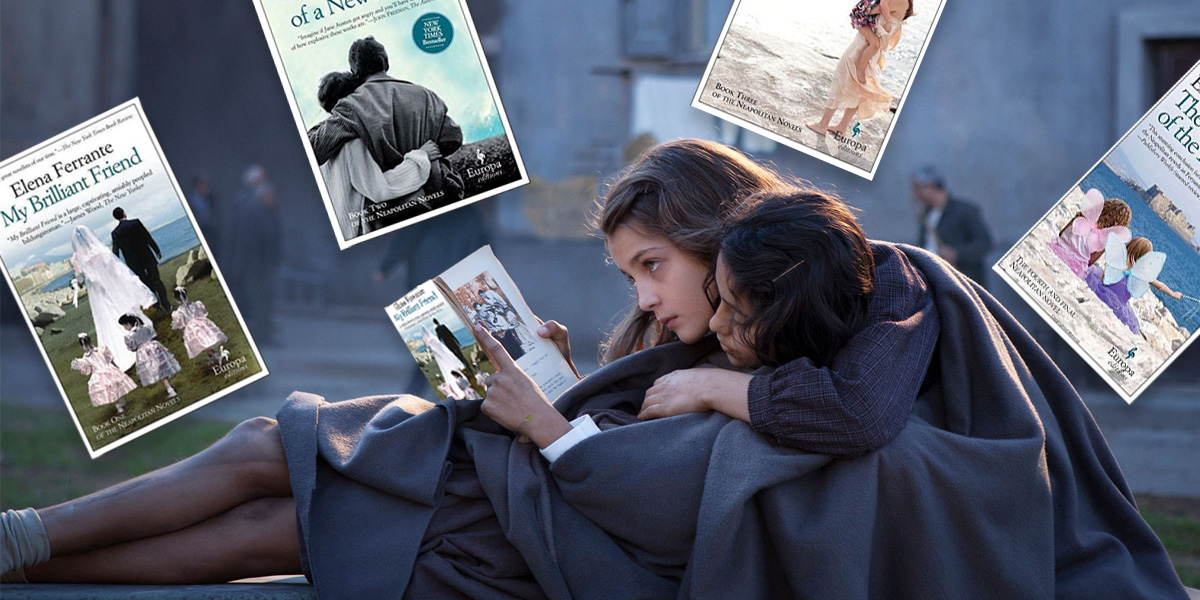
Elena Ferrante, tr. Ann Goldstein, The Neapolitan Novels (2012-2015)
“I feel no nostalgia for our childhood: it was full of violence. Every sort of thing happened, at home and outside, every day, but I don’t recall having ever thought that the life we had there was particularly bad. Life was like that, that’s all, we grew up with the duty to make it difficult for others before they made it difficult for us.”
*
Essential stats: 4 books*, one long story, all bestsellers. Plus, a gorgeous HBO adaptation that . . . not that many people talked about for some reason. (Is it that hard to read subtitles?) Merve Emre called My Brilliant Friend “not just any novel, but a novel that had surpassed ordinary best-seller status to emerge, instead, as an event, a sensation, a literary pathology: “Ferrante fever,” as readers had taken to calling the frenzy that greeted the publication of each Neapolitan novel—the midnight-release parties; the grave discussions about the books’ covers; the jostling reviews, with each critic claiming to know her art more intimately than the critic who came before.”
*For the record: My Brilliant Friend (2012), The Story of a New Name (2013), Those Who Leave and Those Who Stay (2014), and The Story of the Lost Child (2015)
What made them a phenomenon? Books as highbrow soap opera. Decades-long epic about women. Female friendship, female friendship, female friendship.
Speaking of Ferrante fever: Don’t pretend you didn’t have it. Maybe you even watched the documentary:
And it isn’t over.
Definitely related: DON’T COME FOR ELENA, doxxers. Seriously.
Expert’s tip: The Days of Abandonment is secretly better. And a lot shorter. Don’t @ me.
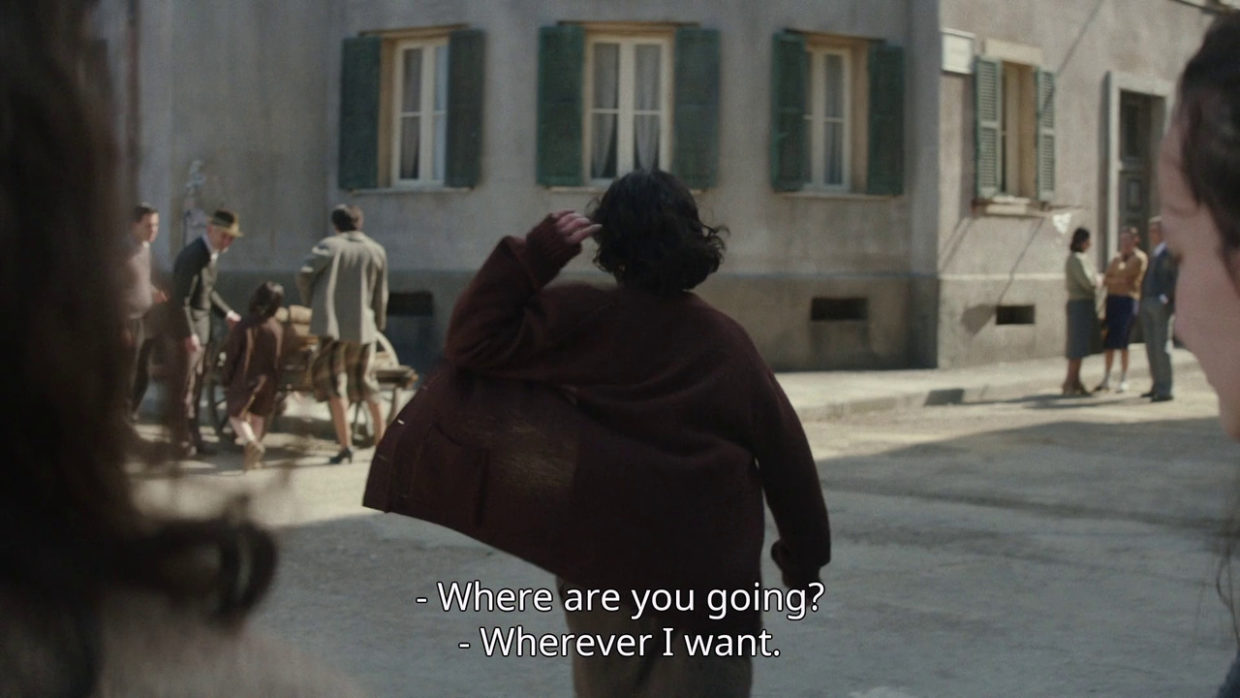
Extra credit: Elena Ferrante: Master of the Epic Anti-Epic · Ann Goldstein on Translating Elena Ferrante · Naples, The Reading List: Your Guide to the City of Elena Ferrante.

Malala Yousafzai, I Am Malala (2013)
We realize the importance of our voices only when we are silenced.
*
Essential Stats: This inspirational autobiography by the young Pakistani activist and Nobel laureate (who was shot by the Taliban for standing up for female education) has been translated into over forty languages, sold over two million copies, and been banned in Yousafzai’s home country.
Fun Audio Book Fact: The audio book edition of I Am Malala, narrated by the writer and activist Neela Vaswani, won the 2015 Grammy Award for Best Children’s Album.
What’s Malala Yousafzai up to now? As well as continuing to break down barriers preventing more than 130 million girls around the world from going to school though her work at the Malala Fund, Yousafzai is currently studying Philosophy, Politics, and Economics at Oxford University.
Watch Yousafzai’s Nobel Prize speech here:
–DS
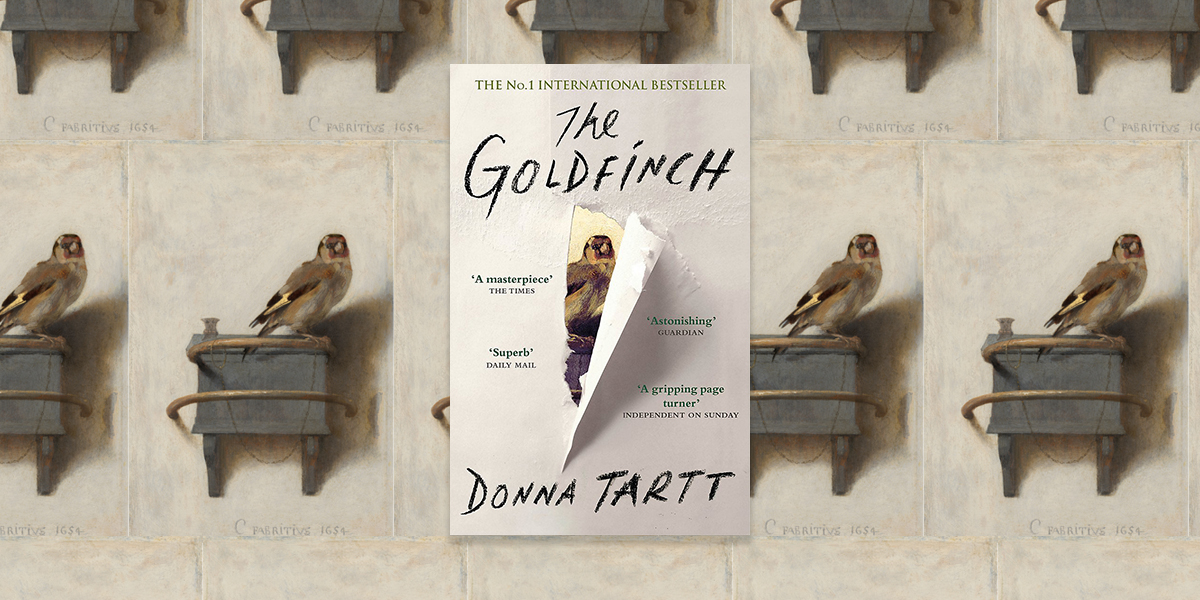
Donna Tartt, The Goldfinch (2013)
Caring too much for objects can destroy you. Only—if you care for a thing enough, it takes on a life of its own, doesn’t it? And isn’t the whole point of things—beautiful things—that they connect you to some larger beauty?
*
Essential stats: Tartt’s longest, most Dickensian novel was, of course, an international #1 bestseller, and spent more than 30 weeks on the New York Times list, selling some million and a half copies in the first year. It won the Pulitzer Prize and the Andrew Carnegie Medal for Excellence in Fiction in 2014, and was shortlisted for the National Book Critics Circle Award and the Baileys Women’s Prize.
Why was it defining? Well, the revered lady Tartt only blesses us with a novel once a decade, so every time she does it’s a major event. But this novel was more than that: it was without question the most anticipated and discussed novel of the year—so big that even the Frick, a stuffy (if lovely) museum in New York City that happened to have the painting in question on hand, became a major tourist destination.
But it also sharply divided critics. As Evgenia Peretz put it in Vanity Fair, in addition to the mountains of praise (and, you know, that Pulitzer) the book also received “some of the severest pans in memory from the country’s most important critics and sparked a full-on debate in which the naysayers believe that nothing less is at stake than the future of reading itself.”
Wait, what happened to the future of reading? Spoiler alert: it’s still there.
Okay, whew, go on: Michiko Kakutani loved it, citing “the Russian masters” and calling it “enthralling.” James Wood sniffed in The New Yorker that it was “a virtual baby: it clutches and releases the most fantastical toys,” but also that it was for babies: “Its tone, language, and story belong to children’s literature.” After Tartt was awarded the Pulitzer, Wood told Vanity Fair: “I think that the rapture with which this novel has been received is further proof of the infantilization of our literary culture: a world in which adults go around reading Harry Potter.” Yikes.
As Peretz wrote, “No novel gets uniformly enthusiastic reviews, but the polarized responses to The Goldfinch lead to the long-debated questions: What makes a work literature, and who gets to decide?” That is, is it about the story, or the way the story is told? Is it about what the critics think, or what the readers think? The answer, of course, is that it is about all of these, and none, and everyone should just decide for themselves what they like and leave it at that.
To cap things off, there’s the terrible film adaptation:
But hey, seriously, friend to friend, is the book any good? As a reasonably well-read senior editor at a literary website and the most devoted fan of The Secret History there ever was, I say: I mean, it could have used some more editing. But boy was it fun.

Lawrence Wright, Going Clear: Scientology, Hollywood, and the Prison of Belief (2013)
He could easily invent an elaborate, plausible universe. But it is one thing to make that universe believable, and another to believe it. That is the difference between art and religion.
*
Essential stats: Wright’s exposé of Scientology, for which he talked to some 200 “current and former Scientologists,” was the natural extension of his shocking profile of film director and screenwriter Paul Haggis (who got “all the way to the top” of the Church of Scientology, and resigned after the church’s support of Prop 8, and therefore talked to Wright), which he published to much awe and attention in The New Yorker in 2011. When Going Clear was published in 2013, it was a finalist for both the National Book Awards and the National Book Critics Circle Awards, and it became the basis for a 2015 HBO documentary film directed by Alex Gibney.
What’s so defining about it? This book the reason a lot of people even know about Scientology, much less any of the details. In The New York Review of Books, Diane Johnson called it “a true horror story, the most comprehensive among a number of books published on the subject in the past few years,” and wrote that Wright seems to have a particular ability to understand and explain issues related to religion, recovered memory, fanaticism, “and deviance—and the nerve to withstand objections and threats. With this set of qualifications, he is able to put Scientology into its broadly American social setting.” Americans took notice.
What did the Scientologists say? Oh boy, did they hate it! They have a whole website devoted to hating it and “correcting its numerous errors,” which is called “How Lawrence Wright Got It So Wrong.” Ahead of the HBO documentary’s premiere, the Church of Scientology took out full page ads in newspapers including The New York Times to denounce it, asking, in large font, “Is Alex Gibney’s Upcoming HBO “Documentary” a Rolling Stone/UVA Redux?” Coincidentally (?) Gibney told Rolling Stone that he’s never received “more blowback” for a film. He began to get huge numbers of angry letters—”They’re handwritten,” he said, “so it has the appearance of a spontaneous reaction . . . but the language is so similar”—but the vitriol was even worse for the ex-members who appear in the film. “Some of them have had physical threats, people threatening to take their homes away, private investigators following them. That’s the part that’s really heartbreaking.”

Claire Messud, The Woman Upstairs (2013)
We’re not the madwomen in the attic—they get lots of play, one way or another. We’re the quiet woman at the end of the third-floor hallway, whose trash is always tidy, who smiles brightly in the stairwell with a cheerful greeting, and who, from behind closed doors, never makes a sound. In our lives of quiet desperation . . . not a soul registers that we are furious.
*
Essential stats: The Woman Upstairs is a novel narrated by Nora Eldridge, an elementary school teacher who has set aside her artistic aspirations because of societal and familiar pressures. In the novel she recounts how she once became enamored with a new family that moved to town, the cosmopolitan Shahids. The Woman Upstairs is a novel about female anger and while it is considered literary fiction, it has also been described as a psychological thriller for the manner that Messud increases suspense by yielding her protagonist’s incisive anger. Claire Messud, author of the best-selling, acclaimed novel, The Emperor’s Children, has been recognized with an Addison Metcalf Award and a Strauss Living Award and, for The Woman Upstairs, she was longlisted for Canada’s 2013 Giller Prize.
What kind of conversation did it spark? In truth, the lasting legacy of The Woman Upstairs may be the result not of the book itself, but of an interview that she did around it with Publishers Weekly. The interviewer asked: “I wouldn’t want to be friends with Nora, would you? Her outlook is almost unbearably grim.” Messud responded:
For heaven’s sake, what kind of question is that? Would you want to be friends with Humbert Humbert? Would you want to be friends with Mickey Sabbath? Saleem Sinai? Hamlet? Krapp? Oedipus? Oscar Wao? Antigone? Raskolnikov? Any of the characters in The Corrections? Any of the characters in Infinite Jest? Any of the characters in anything Pynchon has ever written? Or Martin Amis? Or Orhan Pamuk? Or Alice Munro, for that matter? If you’re reading to find friends, you’re in deep trouble. We read to find life, in all its possibilities. The relevant question isn’t “is this a potential friend for me?” but “is this character alive?” Nora’s outlook isn’t “unbearably grim” at all. Nora is telling her story in the immediate wake of an enormous betrayal by a friend she has loved dearly. She is deeply upset and angry. But most of the novel is describing a time in which she felt hope, beauty, elation, joy, wonder, anticipation—these are things these friends gave to her, and this is why they mattered so much. Her rage corresponds to the immensity of what she has lost. It doesn’t matter, in a way, whether all those emotions were the result of real interactions or of fantasy, she experienced them fully. And in losing them, has lost happiness.
This exchange set off a huge conversation about the “likability” of characters in fiction, and the double standard around our expectations of likability for both female characters and female writers. Most people agreed with Messud—though some, notably, weren’t entirely ready to give up keeping characters as friends.
Has Claire Messud done it again? As Ron Charles of The Washington Post explained, The Woman Upstairs tackled women’s anger; it tackled feminism of the 21st century. He wrote that “a more polemic, far less enjoyable novel would hand us the answer. But Messud isn’t writing an op-ed, and her story’s feminist critique of America rubs raw against her deconstruction of sisterhood. What eventually rises above these gender issues is Nora’s pained howl. It doesn’t matter if you’re a man or a woman: It’s hard not to feel your own shameful anxieties and fragile hopes being flayed by these braided strands of confession and blame.

Is anger the way to go for feminists? Well, there has been bra-burning in the past, and a spike in horror and thrillers featuring the lethal woman—for lack of a better term—whose leader is, of course, Amy Dunne from Gillian Flynn’s Gone Girl so . . . who knows? To be determined.
–CET

Sheryl Sandberg with Nell Scovell, Lean In (2013)
What would you do if you weren’t afraid?
*
Essential stats: This self-help-slash-business book by the chief operating officer of Facebook—which was, basically, an argument that women hold themselves back (albeit unintentionally) in their careers, and advice for how to counteract that trend—made a huge splash when it was published in 2013, becoming an international #1 bestseller. It remained in the New York Times list for over a year, and sold more than 4.2 million copies worldwide. Perhaps most tellingly, the phrase “lean in” has entered the lexicon, and it hasn’t left, even as people (or at least people I know) have soured on her message. Sandberg also founded a nonprofit organization with the same name, dedicated “to offering women the ongoing inspiration and support to help them achieve their goals.”
That sounds pretty good, no? More leaders who are women? Um, it depends on who you are, I guess. Like, Leaning In doesn’t really work if you aren’t already a white lady with time and resources to burn. Surprising no one, bell hooks puts it well in an essay unpacking Sandberg’s version feminism and her approach’s clear lack of intersectionality:
To women of color young and old, along with anti-racist white women, it is more than obvious that without a call to challenge and change racism as an integral part of class mobility she is really investing in top level success for highly educated women from privileged classes. The call for gender equality in the corporate American is undermined by the practice of exclusivity, and usurped by the heteronormative white supremacist bonding of marriage between white women and men. Founded on the principles of white supremacy and structured to maintain it, the rites of passage in the corporate world mirror this aspect of our nation. Let it be stated again and again that race, and more importantly white supremacy, is a taboo subject in the world according to Sandberg.
And Sandberg’s message was demanding: “She does what too many successful women before her have done: blaming other women for not trying hard enough,” wrote Avivah Wittenberg-Cox in Harvard Business Review. “But women in the US now represent the majority of college graduates, the majority of MAs and the majority of PhDs. How much harder do you want them to “lean in”?” Soon, she says, “every resistant man on the planet” will be able to use her argument against women. “Women must simply become more ambitious, more assertive, more . . . male. Then maybe we can promote them.”
Also, it didn’t really work for a lot of people: Even former evangelists began to sour after a while, once they actually tried Leaning In and discovered its limitations. After Sandberg’s mishandling of Facebook’s involvement with Russian hackers in 2018, many declared Leaning In officially Over.
For the lasting cultural feeling towards the book, take it from Michelle Obama, who while promoting her own memoir, Becoming, told a sold-out stadium: “I tell women, that whole ‘you can have it all’—nope, not at the same time; that’s a lie. And it’s not always enough to lean in, because that shit doesn’t work all the time.”
Sandberg’s 2010 TED Talk, “Why We Have Too Few Women Leaders,” which started it all:
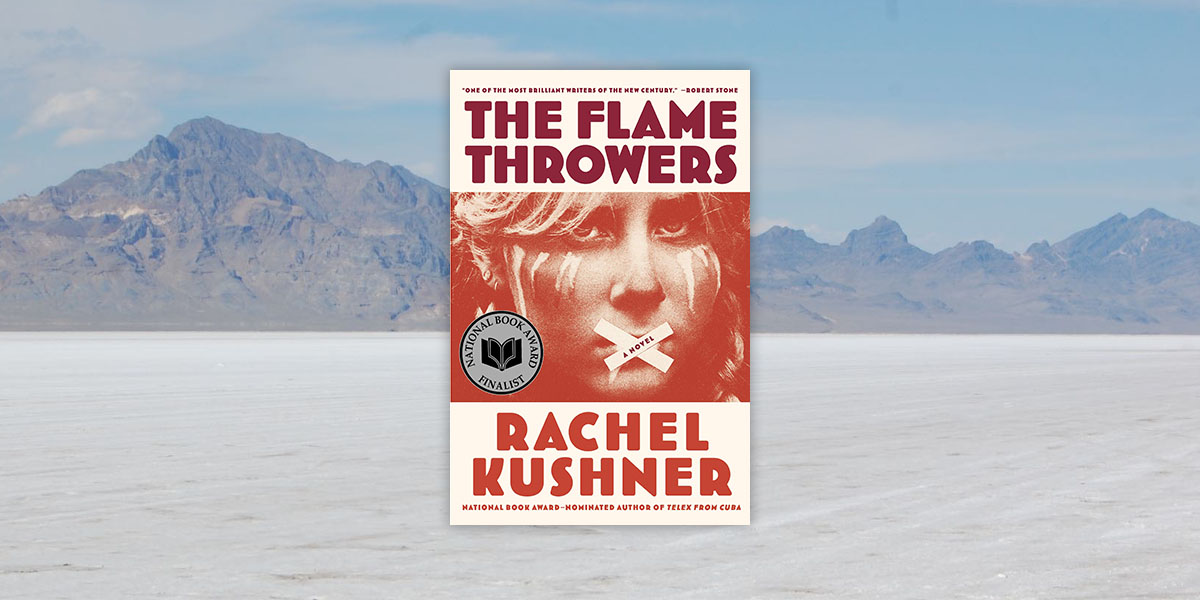
Rachel Kushner, The Flamethrowers (2013)
The desire for love is universal but that has never meant it’s worthy of respect. It’s not admirable to want love, it just is.
*
Essential stats: It was a bestseller and a National Book Award finalist; it was New York magazine’s favorite book of the year, and it was on pretty much everyone else’s list—because, and this of course is the most important stat of all, everyone you knew in 2013 was reading it.
What did the critics say? There was some arguing. James Wood loved it, and so did Ron Charles, and Maud Newton, and Christian Lorentzen, and Tom Bissell—a veritable who’s who of book reviewers. But in The New York Review of Books, Frederick Seidel was less enthused, complaining that the book was “somehow lacking in feeling.” Heat but no warmth, as he put it. Shortly thereafter, Nicholas Miriello rebutted Seidel’s review (imagine!) in The Los Angeles Review of Books, calling it “gallingly condescending” and “often inadequate” and noting that “Seidel at times doesn’t even bother writing complete sentences, let alone a sound argument.” Zing. He concludes:
Ultimately, the problem with this review is that Seidel seems to think he, not the book, is the star of the essay, and so we are treated to endless personal asides—his motorcycles, his gasps, his pondering of why he was chosen to review this book—and unsupported opinion that blends into repurposed summary that blends into more unsupported but cruel opinion once more. The review doesn’t come out and say it, not explicitly anyway, but its form, its mere existence says enough: The book doesn’t deserve a proper review, Seidel is implying, so I haven’t given it one.
Suffice it to say, the book was polarizing, and its fans passionate. But wait, just one more, which is close to my heart: at Tablet, Adam Kirsch wrote:
What makes The Flamethrowers a book for our moment is the way it implodes all the usual assumptions about what gender means in literature. Are “women’s novels” supposed to have robin’s-egg-blue covers and deal with domestic issues and personal relationships and offer likable protagonists?
. . .
Kushner is out to create a mystique, and her book is full of portentous atmosphere and self-conscious cool. In other words, The Flamethrowers manages to be a macho novel by and about women, which may explain why it has been received so enthusiastically by the critics.
. . .
The novel itself is, if not “mansplaining,” at least always insisting on its own mystique. But a novelist should not be a mythmaker, not when one of the greatest powers of the novel is the ability to penetrate the myths we make about ourselves—to show how things really work, instead of how they claim to work. The Flamethrowers is too cool, too stylish; in this it resembles some of the most famous writing of the 1970s, including Robert Stone’s novels and Joan Didion’s essays.
This, you may not be shocked to learn, irritated yours truly—and it irritated Kushner too, though she was nicer about it than I was.
About the cover: Interesting story. As Kushner wrote in The Paris Review:
The first image I pinned up to spark inspiration for what would eventually be my novel The Flamethrowers was of a woman with tape over her mouth. She floated above my desk with a grave, almost murderous look, war paint on her cheeks, blonde braids framing her face, the braids a frolicsome countertone to her intensity. The paint on her cheeks, not frolicsome. The streaks of it, dripping down, were cold, white shards, as if her face were faceted in icicles. I didn’t think much about the tape over her mouth (which is actually Band-Aids over the photograph, and not over her lips themselves). This image ended up on the jacket of The Flamethrowers, whose first-person narrator, introduced in this issue, in the story “Blanks,” is a young blonde woman. A creature of language, silenced.
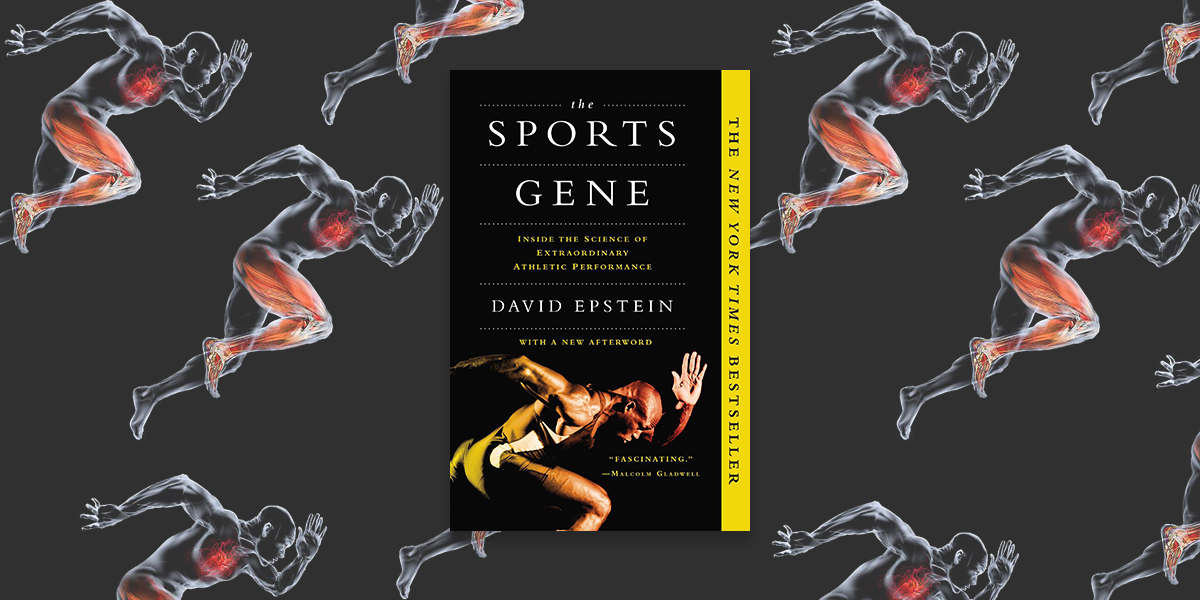
David Epstein, The Sports Gene (2013)
Without both genes and environments, there are no outcomes.
*
Essential stats: Epstein’s exploration of the impact of both nature and nurture on athletic performance was a New York Times bestseller, and was nominated for the PEN/ESPN Award for Literary Sports Writing.
Why was it defining? Epstein took on sticky topics—race, upbringing, gender, and culture—in an accessible, scientific attempt to answer the question: what makes a professional athlete (and what doesn’t)? He defies accepted knowledge (like the 10,000 hour rule) and while he doesn’t come up with an answer, per se, as Richard Moore puts it, his embrace of ambiguity leads to “a much deeper truth.”
Watch Epstein’s TED Talk:
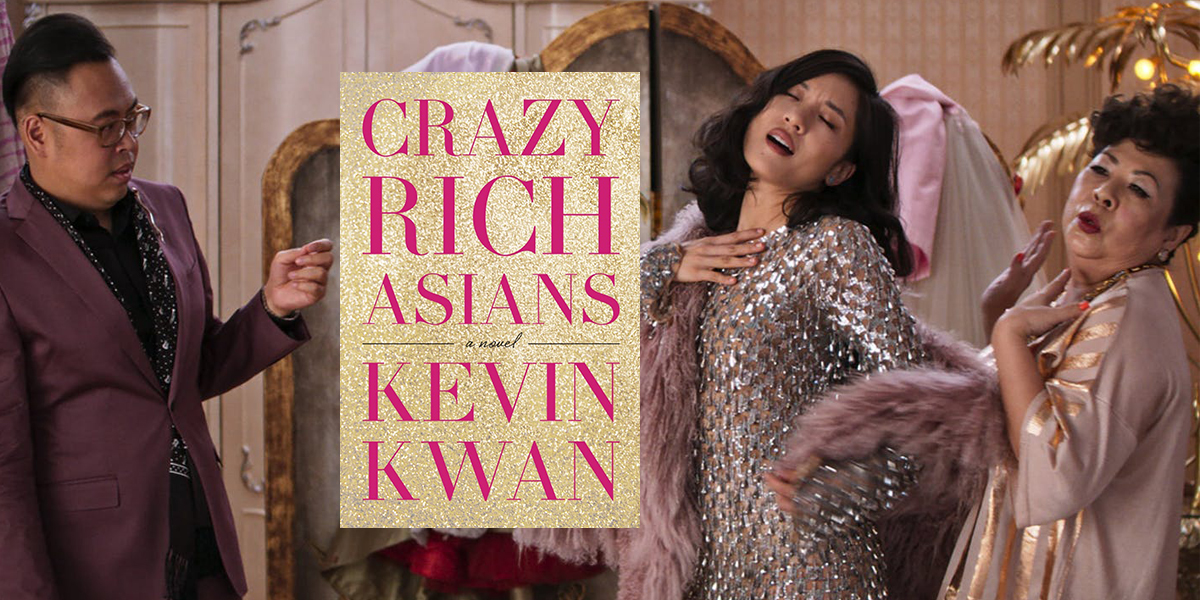
Kevin Kwan, Crazy Rich Asians (2013)
Aiyoooooh, finish everything on your plate, girls! Don’t you know there are children starving in America?
*
Essential stats: Kwan’s satirical romantic comedy was an international bestseller, and of course sales were plumped—to over 1.5 million copies—by the splashy, delightful 2018 film adaptation, which, not for nothing, made $238.5 million worldwide, against a $30 million budget—which made it the highest-grossing romantic comedy in a decade.
What was Kwan up to, writing this book? “I wanted to introduce a contemporary Asia to a North American audience,” Kwan said of the novel, which was based on his own childhood in Singapore. “It’s a world that actually exists, and if anything, it’s toned down [in the book].”
What is its lasting legacy? Critics loved the book, but the way to American hearts is through the screen—and the screen adaptation was a very welcome cultural phenomenon in this country. It was the first major American motion picture to feature a majority Asian and Asian-American cast in a contemporary setting since 1993’s The Joy Luck Club (also a literary adaptation, of course). “For decades, Asian Americans working in the film and television industry have carried the impossible burden of fixing a system that has tended to punish, stereotype and ignore them,” Karen K. Ho wrote in her TIME cover story called “Crazy Rich Asians Is Going To Change Hollywood.”
After years of saying otherwise, Hollywood has finally realized that telling more inclusive stories is just good business. . . [and] there will be other definitions of success, beyond the numbers. [John M.] Chu dreams of this movie being repeatedly played on a television channel like TBS, and he has heard directly from fans about how it has changed the way they see themselves—including men who tell him they’re “proud to be an Asian dude” and those who never would’ve watched a romantic comedy before. “I didn’t know we would get that kind of reaction,” he says.
Lots and lots of people wrote about how important the film was to them personally, and here’s hoping it does in fact signal a shift in the kinds of stories we get to see represented in mass popular culture.
This is director Jon Chu’s original casting call:
“We just didn’t want to miss anybody,” he told the Times. “I wanted this to be the Avengers of Asian actors.”
And of course, the trailer:

George Saunders, Tenth of December (2013)
Dad had once said, Trust your mind, Rob. If it smells like shit but has writing across it that says Happy Birthday and a candle stuck down in it, what is it?
Is there icing on it? he’d said.
*
Essential stats: The collection debuted at #3 on the New York Times bestseller list—quite a feat for a literary collection. And everyone gushed over it. The week it was published—this is the first week of January, mind you—The New York Times Magazine ran a cover story headlined “George Saunders Has Written the Best Book You’ll Read This Year.”
What made it so defining? First of all, it was the major mainstream breakthrough of a longtime writer’s writer—it was sold out on Amazon on the day of its release, a fact that gave me great hope for the American mind. But also, as Charles Finch put it, while one obvious choice for the Sub-Genre of the Decade Award is autofiction, “it could easily be that we will remember the 2010s for producing the lovely slipstream fiction of authors like George Saunders, Kelly Link and Colson Whitehead, a subtler cousin of magical realism, and thus perhaps more closely reflective of how truly surreal things have gotten.”
Read the title story: here.
Here’s Saunders reading from the book and speaking at Google:

Thomas Piketty, tr. Arthur Goldhammer, Capital in the Twenty-First Century (2014)
When the rate of return on capital exceeds the rate of growth of output and income, as it did in the nineteenth century and seems quite likely to do again in the twenty-first, capitalism automatically generates arbitrary and unsustainable inequalities that radically undermine the meritocratic values on which democratic societies are based.
*
Essential stats: French economist Piketty first published Capital in the Twenty-First Century in 2013 in France; the English translation was published a few months later—in fact, its English language publication date was moved up after a prodigious amount of hype (and preorders). Unusual for a book from an academic press, indeed. This 700 page book became a huge (and unlikely) bestseller, shooting to #1 on the Amazon and New York Times lists, selling out everywhere and becoming Harvard University Press’s best selling book ever. Naturally, it has been adapted into a documentary.
What was the basic argument? That the meritocracy is a lie—and that inequality is not an accidental failing but a structural feature of capitalism, and the state needs to step in to rectify it. (Here’s a good explainer if you want more.)
What made it defining? It made an extremely strong case for the above argument—and brought it to the fore of the cultural conversation, at least for those who were paying attention. Branko Milanovic, a former senior economist at the World Bank, called it “one of the watershed books in economic thinking.” Paul Krugman called it “the most important economics book of the year—and maybe of the decade.” Later, he called it a “bona fide phenomenon” and wrote:
Other books on economics have been best sellers, but Mr. Piketty’s contribution is serious, discourse-changing scholarship in a way most best sellers aren’t. And conservatives are terrified. Thus James Pethokoukis of the American Enterprise Institute warns in National Review that Mr. Piketty’s work must be refuted, because otherwise it “will spread among the clerisy and reshape the political economic landscape on which all future policy battles will be waged.”
Well, good luck with that.
Was it just the right book at the right time? Maybe! Economist Stephanie Kelton thought so, writing that the “Piketty phenomenon” was a timely one:
The Occupy movement laid the groundwork for a great debate. What was happening to America? Were we witnessing the rise of a plutocracy or the emergence of a meritocracy? Chris Hayes and Joe Stiglitz made the case on the left, while Tyler Cowen and David Brooks provided a counter-narrative for the right. Both sides had a loyal following, but it was Piketty whose meticulous examination of the evidence, seemed to provide the impartial proof audiences were craving. The left was right. The wealthy owed their fortunes to their forefathers and the Congressman who wrote the loopholes for their tax accountants to exploit. It’s a conclusion that confirmed many priors, which probably explains much of its success.
I mean, who ever heard of a “rock-star economist” before?
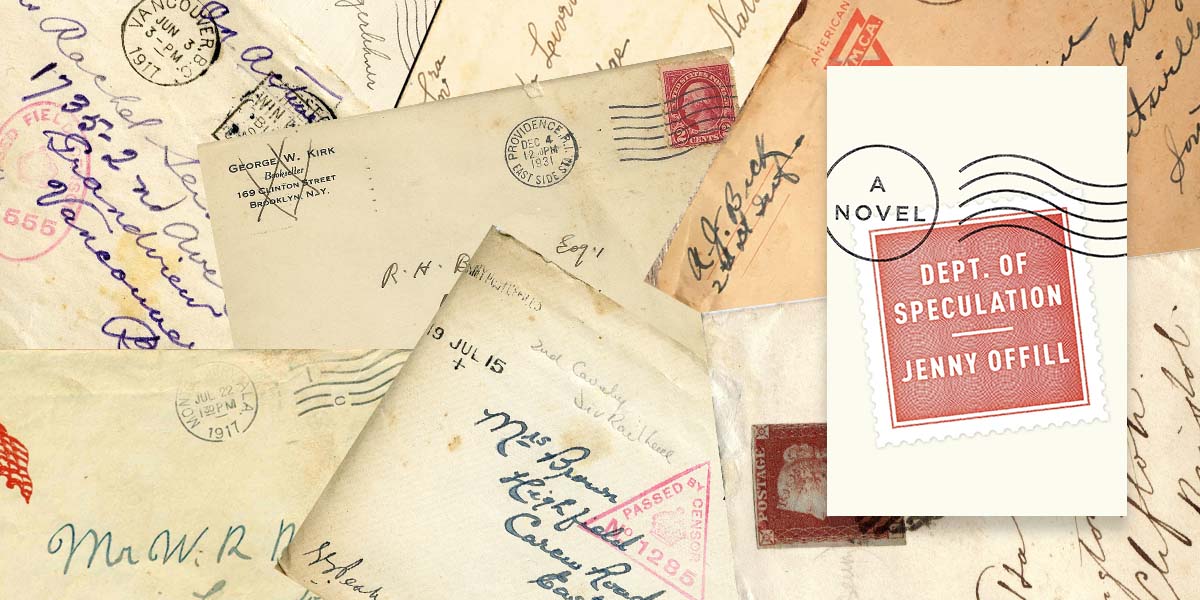
Jenny Offill, Dept. of Speculation (2014)
Three things no one has ever said about me:
You make it look so easy.
You are very mysterious.
You need to take yourself more seriously.
*
Essential stats: Named one of “The 10 Best Books of 2014” by The New York Times Book Review and also pretty much everyone you know; shortlisted for the Folio Prize, the Pen/Faulkner Award and the L.A. Times Fiction Award.
Biggest gift to literary discourse: the term “art monster.” As in:
My plan was to never get married. I was going to be an art monster instead. Women almost never become art monsters because art monsters only concern themselves with art, never mundane things. Nabokov didn’t even fold his own umbrella. Vera licked his stamps for him.
Oh, and it seemed to change the minds of a number of people who thought “domestic” fiction was lame.
What did the critics say?
A book this sad shouldn’t be so much fun to read … a riposte to the notion that domestic fiction is humdrum and unambitious. From the point of view of an unnamed American woman, it gives us the hurrahs and boos of daily life, of marriage and of parenthood, with exceptional originality, intensity and sweetness … thoughts and recollections have an aphoristic neatness to them, enhanced by the way each paragraph is set alone on the page, white space above and below … almost every one of these vignettes is interesting and perfectly put … a shattered novel that stabs and sparkles at the same time. It is the kind of book that you will be quoting over and over to friends who don’t quite understand, until they give in and read it too. (John Self, in The Guardian)
The novel is, at times, reminiscent of Renata Adler’s Speedboat with a less bitter edge … moves quickly, but it is also joyously demanding because you will want to keep trying to understand the why of each fragment and how it fits with the others … Offill is a smart writer with a canny sense of pacing; just when you want to abandon the fragmented puzzle pieces of the novel, she reveals a moment of breathtaking tenderness … especially engaging when it describes new motherhood … For better or worse, this is not so much a book about their marriage; it is a book about the wife’s marriage. It would be interesting to read the other story to this marriage, to know more of the husband, the father — but Offill still makes it seem as if the wife’s version of the marriage is story enough and, perhaps, the only story that matters. (Roxane Gay, in The New York Times Book Review)
Here’s Offill reading from the book at the British Library:

Elizabeth Kolbert, The Sixth Extinction (2014)
Though it might be nice to imagine there once was a time when man lived in harmony with nature, it’s not clear that he ever really did.
*
Essential stats: Kolbert’s much-lauded “unnatural history,” which began its life as a 2009 New Yorker piece with the same name, was a New York Times bestseller, a finalist for the National Book Critics Circle Award, and the winner of the 2015 Pulitzer Prize in General Nonfiction.
What’s the gist? We’re in the middle of the planet’s sixth mass extinction, and it’s our own fault.
What made it defining? It gave an accessible account of some of the ravages we’ve inflicted on our planet to readers at large. Her writing in this volume, as Michiko Kakutani put it in The New York Times,
is the very model of explanatory journalism, making highly complex theories and hypotheses accessible to even the most science-challenged of readers, while providing a wonderfully tactile sense of endangered (or already departed) species and their shrinking habitats. She writes as a popularizer—or interpreter—of material that has been excavated by an army of scientists over the years and, in many cases, mapped by earlier writers.
Perhaps you’d like to hear Kolbert give a lecture on the topic:

Bryan Stevenson, Just Mercy (2014)
Each of us is more than the worst thing we’ve ever done.
*
Essential stats: Stevenson’s memoir and moving call to action was a #1 New York Times bestseller, the winner of of the Carnegie Medal for Excellence in Nonfiction, the NAACP Image Award for Nonfiction, and a Books for a Better Life Award; it was a finalist for the Los Angeles Times Book Prize and the Kirkus Reviews Prize. It was adapted into a film starring Michael B. Jordan, which is slated for wide release this Christmas.
Why is is defining? As Ted Conover put it in The New York Times, “unfairness in the Justice system is a major theme of our age.
DNA analysis exposes false convictions, it seems, on a weekly basis. The predominance of racial minorities in jails and prisons suggests systemic bias. Sentencing guidelines born of the war on drugs look increasingly draconian. Studies cast doubt on the accuracy of eyewitness testimony. Even the states that still kill people appear to have forgotten how; lately executions have been botched to horrific effect.
This news reaches citizens in articles and television spots about mistreated individuals. But Just Mercy, a memoir, aggregates and personalizes the struggle against injustice in the story of one activist lawyer.
Since its publication, it has been a mainstay of “Common Reading” programs in high school, college, and graduate school, which speaks for itself: anything that young, curious people are reading en masse will have some impact on the present—and future. We hope.
Here’s the trailer:
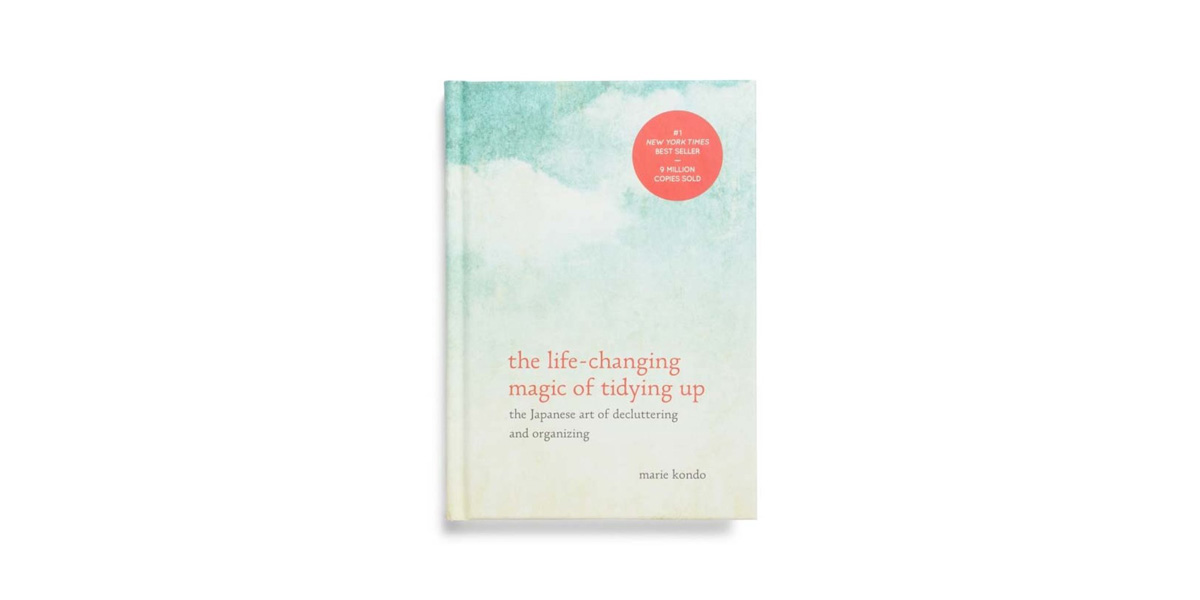 Marie Kondo, The Life-Changing Magic of Tidying Up (2014)
Marie Kondo, The Life-Changing Magic of Tidying Up (2014)
“The question of what you want to own is actually the question of how you want to live your life.”
*
Essential stats: Marie Kondo’s self-help book about the joy of organizing has been published in over 30 countries; it was a bestseller in the US as well as Japan and Europe—a sticker on the cover of every copy I have seen IRL boasts “2 million copies sold,” so I expect it is much more by now; in 2015, when the book sold more copies than any other work of nonfiction in this country, TIME listed her as one of its 100 most influential people, and Jamie Lee Curtis called her a “modern-day Mary Poppins.” Oh, and who could forget her Netflix reality show, Tidying Up with Marie Kondo?

Does this advice spark joy? “The best way to choose what to keep and what to throw away is to take each item in one’s hand and ask: “Does this spark joy?” If it does, keep it. If not, dispose of it. This is not only the simplest but also the most accurate yardstick by which to judge.” (Not if we’re talking about books!!!!!)
What is the “Marie Kondo Effect”? Ask your local, overwhelmed thrift store manager.
But what is it all really about? Women’s invisible labor, obviously. (What isn’t?)
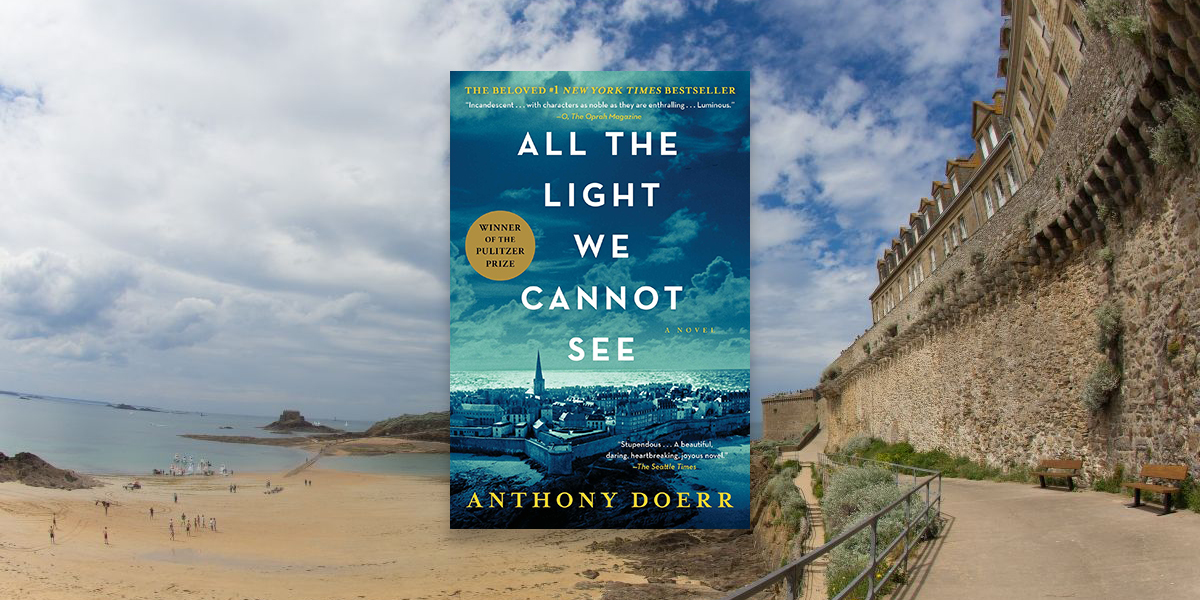
Anthony Doerr, All the Light We Cannot See (2014)
Open your eyes and see what you can with them before they close forever.
*
Essential stats: Doerr’s insanely popular WWII novel, about a blind French teenager and a German soldier whose paths collide in occupied France, spent an unheard of 130 consecutive weeks on the New York Times Best Seller list. It also bagged the Pulitzer Prize and the Andrew Carnegie Medal for Excellence in Fiction and was a National Book Award finalist. After 56 printings of the hardcover edition, there are now more than 4 million copies of All the Light We Cannot See in circulation across all formats in North America alone.
So people liked it then. Many, many, many people, yes. Though some took issue with its sentimental depiction of the Holocaust.
Will they be making a TV adaptation? Duh. Netflix and 21 Laps (the Stranger Things production company) are developing a limited series as we speak.
But will you cry? This person did:
–DS

Naomi Klein, This Changes Everything (2014)
So we are left with a stark choice: allow climate disruption to change everything about our world, or change pretty much everything about our economy to avoid that fate. But we need to be very clear: because of our decades of collective denial, no gradual, incremental options are now available to us.
*
Essential stats: Klein’s climate crisis manifesto was an instant New York Times and international bestseller, and it won Canada’s prestigious Hilary Weston Writers’ Trust Prize for Nonfiction. In 2015, it was adapted into a documentary by Avi Lewis.
What was the basic argument? That we can’t address climate change properly without overhauling our economic system as well.
What made it defining? It was groundbreaking and hopeful in its approach to a massive problem that we were only just starting to really deal with (again) in 2014. Bill McKibben wrote: “This is the best book about climate change in a very long time—in large part because it’s about much more. It sets the most important crisis in human history in the context of our other ongoing traumas, reminding us just how much the powers-that-be depend on the power of coal, gas and oil. And that in turn should give us hope, because it means the fight for a just world is the same as the fight for a livable one.”
And in the New York Times Book Review, Rob Nixon wrote that it was “a book of such ambition and consequence that it is almost unreviewable,” but felt comfortable, in the end, calling it “the most momentous and contentious environmental book since Silent Spring.”
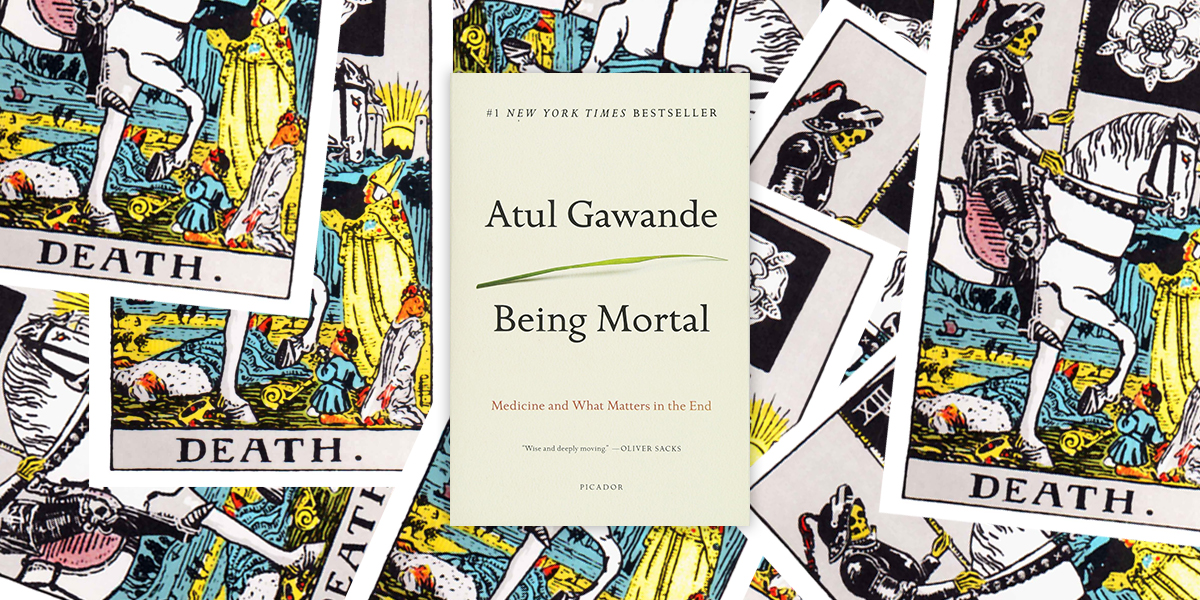
Atul Gawande, Being Mortal (2014)
Death is the enemy . . . But the enemy has superior forces. Eventually, it wins. And in a war that you cannot win, you don’t want a general who fights to the point of total annihilation. You don’t want Custer. You want Robert E. Lee . . . someone who knows how to fight for territory that can be won and how to surrender it when it can’t.
*
Essential stats: New Yorker writer and practicing surgeon Gawande’s personal—but also well-researched—book about the failings in the way we treat age, illness, and death was a bestseller, and hailed by many as a potentially industry changing—or at least life-changing—book.
What’s the gist? That medicine as it stands strangely ignores the fact that all people will eventually die—and in doing so fails to help people achieve “well-being” as opposed to simple survival at all costs.

What did readers think? It was widely read, celebrated, and passed around. As one reviewer put it, “Being Mortal is completely irrelevant for any readers who do not have elderly relations, do not know anyone who is old or in failing health, and do not themselves expect to become old. Otherwise, this is must-read stuff.” Well then.
You can watch the Frontline documentary episode on Gawande and his methods: here.
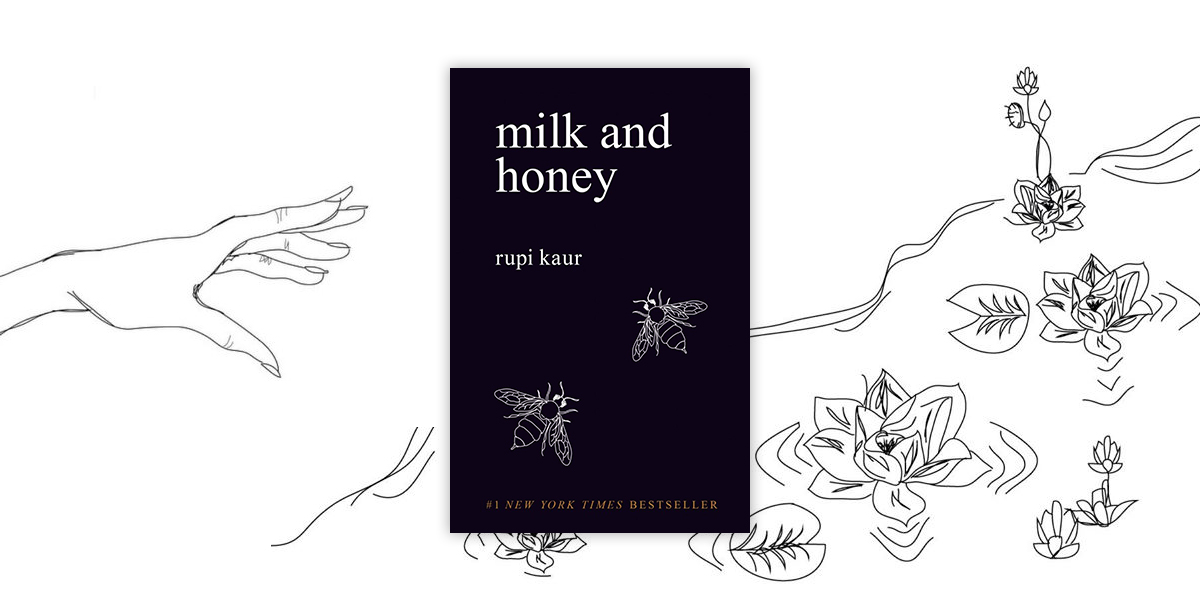
Rupi Kaur, Milk and Honey (2014)
i am a museum full of art
but you had your eyes shut
*
Essential stats: In this case, the most essential stat is 3.8 million—the number of Instagram followers Rupi Kaur had at last count. She’s an Instapoet, and a wildly successful one. Milk and Honey, her first collection, has sold over 5 million copies (in 2016, it outsold The Odyssey by a factor of ten), spent 77 weeks on the New York Times Best Seller list, and spawned countless thinkpieces about whether Kaur’s widely beloved, (very) simple poems were Good or Bad for poetry as a whole.

Did the critics like it? It’s more difficult to find a review of Milk and Honey in a major publication than it is to find an unexpected metaphor in Milk and Honey. In the New York Times’ “Inside the List” column, Gregory Cowles wrote “Much of Kaur’s appeal comes from this artless vulnerability, like a cross between Charles Bukowski and Cat Power.” A profile in The Guardian notes that “[h]er poetry does not need heavy analysis.” Are these observations sexist? Depends who you ask!
And about those parodies… Two college students created a parody book called Milk and Vine, in which they added linebreaks and illustrations to the text from Vine videos. Yep, that one became an Amazon bestseller, too.
Did she save poetry?
Poetry can only save
itself from drowning
in the discourse.
Did she kill poetry?
Poetry is strong
like granite and
women.

–JG
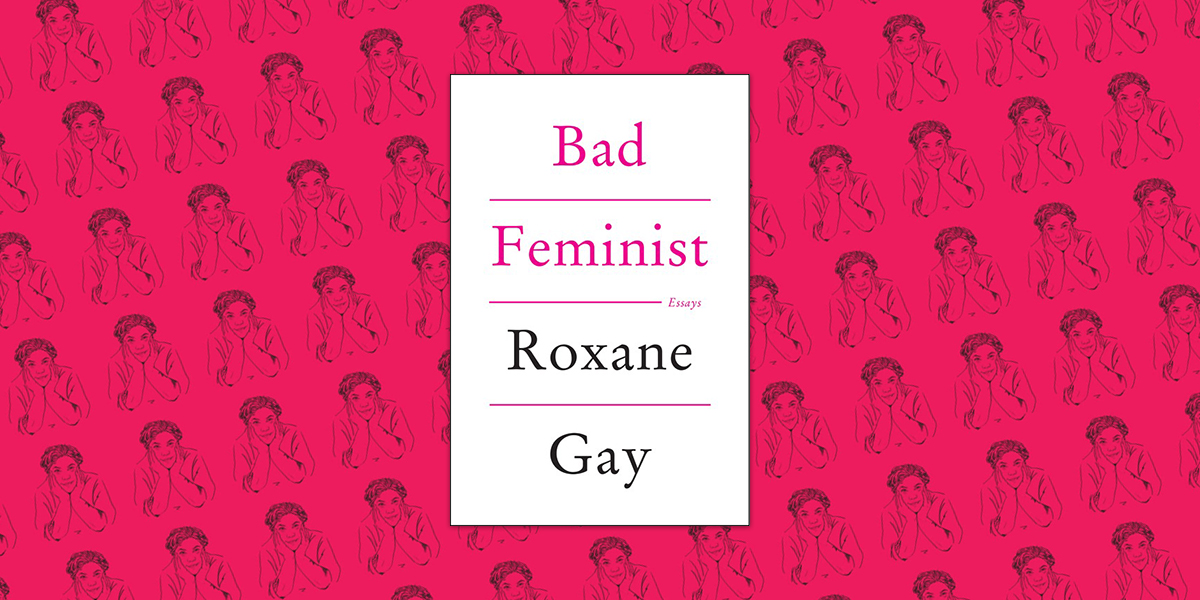
Roxane Gay, Bad Feminist (2014)
At some point, I got it into my head that a feminist was a certain kind of woman. I bought into grossly inaccurate myths about who feminists are—militant, perfect in their politics and person, man hating, humorless. I bought into these myths even though, intellectually, I know better. I’m not proud of this. I don’t want to buy into these myths anymore. I don’t want to cavalierly disavow feminism like far too many other women have done.
I also want to be myself. Bad feminism seems like the only way I can both embrace myself as a feminist and be myself.
*
Essential stats: This decade has without a doubt been the decade of Roxane Gay. Over the last decade, the professor, cultural critic, and novelist has published not only the bestselling Bad Feminist, but also the story collections Ayiti (2011) and Difficult Women (2017), the novel An Untamed State (2014), and the memoir Hunger (2017). She writes for The New York Times, World of Wakanda, and your Twitter feed. She edited the anthology Not That Bad: Dispatches from Rape Culture (2018). She inspired this Reductress article: “Bad Feminist Still Hasn’t Read Bad Feminist.” This really only scratches the surface.
What does it mean to be a “bad feminist”? For Gay, it means liking the color pink, and dresses, and babies, and listening “to thuggish rap at a very loud volume even though the lyrics are degrading to women and offend me to my core,” while still being committed to fighting “misogyny, institutional sexism that consistently places women at a disadvantage, the inequity in pay, the cult of beauty and thinness, the repeated attacks on reproductive freedom, violence against women, and on and on.”
Yep, in 2014, this was all pretty revolutionary for a whole lot of people. The fact that you think the above is obvious is probably at least in part due to Gay’s work and attendant popularity.
Your minimum assignment: Read the title essay at VQR.
tl;dr? Watch Gay’s TED Talk instead:
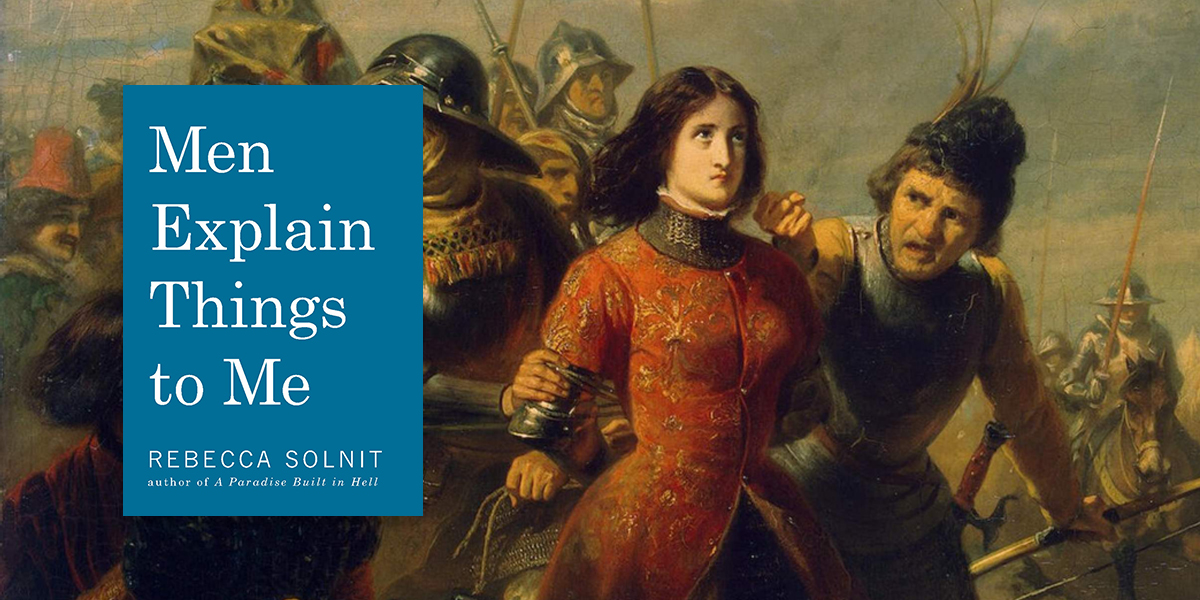
Rebecca Solnit, Men Explain Things to Me (2014)
Men explain things to me, still. And no man has ever apologized for explaining, wrongly, things that I know and they don’t.
*
Essential stats: Rebecca Solnit’s essay “Men Explain Things to Me” went viral in 2008, inspiring her essay collection of the same name, which spans 130 pages and seven essays total.
Gifts to the culture: The term “mansplaining” and every joke we’ve made about it since then. Need we say more?
Not, like, unrelated: Women Listening to Men in Western Art History.
What does Solnit think about the term? At first, she didn’t love it. She told Jessica Valenti for The Guardian in 2014: “A really smart young woman changed my mind about it. I used to be ambivalent, worrying primarily about typecasting men with the term. (I have spent most of my life tiptoeing around the delicate sensibilities of men, though of course the book Men Explain Things to Me is what happens when I set that exhausting, doomed project aside.) Then in March a PhD candidate said to me, ‘No, you need to look at how much we needed this word, how this word let us describe an experience every woman has but we didn’t have language for.'”
Why is the book important? Beyond mansplaining, the essays in the collection give language to the often-invisible dynamics of gender and power that govern our world. And since the 2016 presidential election, that task has felt all the more urgent. Alice Gregory, writing for The New York Times Magazine in 2017, described why Solnit has become a central figure for the resistance against the Trump administration: “In the Trump era, Solnit, who writes against corruption of all kinds—environmental, political, social—seems herself wholly uncorrupted: by these sorts of discussions of commercial popularity; by the harried activity of online life; by the social spheres of Washington, D.C., and New York City; by the aesthetic fetishization that so many women writers are subject to.”
Here’s her conversation with Jia Tolentino:
Extra credit: Solnit writes for Lit Hub a lot. All of it is good.
–CS

Ben Lerner, 10:04 (2014)
Art has to offer something other than stylized despair.
*
Essential stats: Lerner’s works themselves are strangely un-garlanded, despite the fact that they’re always on everybody’s best of lists and (depending on what kind of circles you run in, I suppose) lips. But 10:04 was shortlisted for the 2014 Folio Prize and the NYPL Young Lions Fiction Award, and, perhaps more tellingly, the year after this book was published, Lerner was awarded a MacArthur “Genius” Grant.
Why was it defining? Love him or hate him, Ben Lerner has become such a touchstone of literary culture that it’s hard to believe all of his novels were written in the last decade. He’s another master of autofiction (and metafiction), and to a large degree, he’s the novelist that the largest number of other young (white, male) novelists aspire to be—he’s one of the defining voices of a literary generation. So his definitive scope is admittedly smaller than some of the other writers on this list—but it’s just as vibrant. (For me, 10:04 is the peak of his work so far, but others may disagree.)
Here’s Lerner on false starts:

Yuval Noah Harari, Sapiens: A Brief History of Humankind (2014)
How do you cause people to believe in an imagined order such as Christianity, democracy or capitalism? First, you never admit that the order is imagined.
*
Essential stats: The book, a popular science account of the evolution of humanity, was originally published in Hebrew in 2011; once it was published in English, in both the US and the UK, it became a major international bestseller, and was published in at least 45 languages. In 2017, after OTP Jamie and Camilla bonded over their love for the book on Love Island (OH YES, MY FRIENDS), the book saw a 23% bump in sales in the UK. That summer, also likely due to the publication of Harari’s next bestseller, Homo Deus, Sapiens hit 1 million copies sold in English worldwide. At the news, Harari said:
As a historian, I’ve always known how exciting history can be, and I am glad I could help many other people experience it. It is wonderful to see how Sapiens has struck a chord with people from so many different countries. Perhaps its success is because we now live in a global world, and all humankind faces a set of collective problems—so people all over the world are interested in our collective story as a species.
Bill Gates listed it as one of the ten books he’d bring to a desert island. “This look at the entire history of the human race sparked lots of great conversations at our family’s dinner table,” he wrote. “Harari also writes about our species today and how artificial intelligence, genetic engineering and other technologies will change us in the future.” As of last summer, Sapiens and Homo Deus had sold a combined 12 million copies globally.
Why was it such a hit—and why was its hit-ness so protracted? In The Guardian, Alex Preston writes: “Sapiens has become a publishing phenomenon and its wild success is symptomatic of a broader trend in our book-buying habits: a surge in the popularity of intelligent, challenging nonfiction, often books that are several years old.
[T]he story of Sapiens is about a book becoming part of a national conversation. “Readers like to read the same book, particularly if it’s a good and interesting one,” [James] Daunt [of Waterstones] says, “because they like to discuss it. But with something like Sapiens, which is a challenging book, and perhaps one you wouldn’t expect to be at the top of the bestseller lists, let alone for years on end, you need to get enough people to read it to ignite that interest.” At a time when politics is more furious and fragmented than ever, when technology is colonizing our everyday existence, when medicine is reshaping our lives, we still look to books to make sense of things, to feel ourselves part of a great communal effort to understand our age. These are serious times and they demand serious, intelligent and challenging books.
So people love it. What about the critics? Many reviewers in Harari’s field were less than impressed. “Nobody can be an expert about everything,” Charles C. Mann sniffed in The Wall Street Journal,
and it’s not exactly surprising that Mr. Harari’s sweeping summations are studded with errors—there are always fleas on the lion, as a teacher of mine once told me. The question is whether there is a lion under the fleas. Sapiens is learned, thought-provoking and crisply written. It has plenty of confidence and swagger. But some of its fleas are awfully big.
Philosopher Galen Strawson more or less agreed in The Guardian. “Much of Sapiens is extremely interesting,” he wrote, “and it is often well expressed. As one reads on, however, the attractive features of the book are overwhelmed by carelessness, exaggeration and sensationalism.” Well, then it’s not surprising it’s so popular.
And there’s a new book, right? There is. 21 Lessons for the 21st Century was published in 2018.
Harari and Jared Diamond in conversation:

Chimamanda Ngozi Adichie, We Should All Be Feminists (2014)
My own definition of a feminist is a man or a woman who says, “Yes, there’s a problem with gender as it is today and we must fix it, we must do better.” All of us, women and men, must do better.
*
Essential Stats: This book-length essay by Chimamanda Ngozi Adichie, whom Barack Obama refers to as “one of the world’s great contemporary writers,” tries to define feminism for the 21st century. Adichie argues for the necessity of feminism by drawing on anecdotes from her experience of sexism at home in Nigeria and by showing why the constructs of masculinity ingrained in our society are harmful. The well-argued, colorful essay is an eloquent call to arms: We should all be feminists. It was a New York Times bestseller and was subsequently translated into 32 languages. You may have also heard of it from the eponymous TED talk, that took place at TEDx Euston in London, and went viral, garnering more than five million views.
What came first—the book or the TED Talk? The TED Talk did come first, in April 2013, and then after it went viral and became a fixture of twenty-first century discussions of feminism, the talk was adapted to book form. You can still watch the iconic TED talk here or if you like reading better, you can simply order the book.
What was its impact? Well, pretty gigantic, if we judge how it resonated across mediums and platforms of popular culture. Excerpts of it were featured on T-shirts at Dior’s Paris Fashion Week in 2017 (though because we can’t have nice things and this decade has been all about corporatizing feminism, the white cotton shirt cost $710, which prompted some backlash and a quick move by the brand to donate part of the profits to Rihanna’s foundation). In response to having become a fashion icon, the literary author joked, “I think it’s very important that brilliant women step up and be hot babes.” If high fashion weren’t enough, Beyoncé also included parts of Adichie’s talk in her 2013 song, “***Flawless,” and even credited her on the track. Adichie’s talk has even made an impact on academia, influencing critical analyses of gender politics and feminist studies.

Also, Rihanna:

–CET
Claudia Rankine, Citizen: An American Lyric (2015)
because white men can’t
police their imagination
black men are dying
*
Essential stats: Citizen was a New York Times bestseller and a finalist for the National Book Critics Circle Award in both poetry and criticism; it won in poetry. It was a finalist for the National Book Award. It also won the Pen Center USA, NAACP Image Award, and Forward Prize in that genre. In 2016, Rankine was awarded a MacArthur “Genius” Grant, and in 2017, she was awarded a Guggenheim.
Why was it defining? Who would have foreseen that one of the most important books of the decade in any genre would be ostensibly a work of poetry? (Though of course it would be better described as a hybrid of text, image, genre, and form.) Maybe a few people, but certainly a smaller number than those who would have foreseen that one of the most important books of the decade would have been a challenging but widely accessible treatise on racism in America. As Holly Bass put it in The New York Times Book Review:
The challenge of making racism relevant, or even evident, to those who do not bear the brunt of its ill effects is tricky. Rankine brilliantly pushes poetry’s forms to disarm readers and circumvent our carefully constructed defense mechanisms against the hint of possibly being racist ourselves … The writing zigs and zags effortlessly between prose poems, images and essays. This is the poet as conceptual artist, in full mastery of her craft. And while the themes of this book could have been mined from any point in America’s history, Rankine sets the whole collection resolutely in the present. Contemporary content and contemporary form mirror each other … it’s like viewing an experimental film or live performance. One is left with a mix of emotions that linger and wend themselves into the subconscious … Rankine creates an intentionally disorienting experience, one that mirrors the experience of racial micro-aggressions her subjects encounter. … throws a Molotov cocktail at the notion that a reduction of injustice is the same as freedom.
Caroline Wozniacki imitating Serena Williams, one of the many moments of racism in pop culture Rankine unpacks in this book:
Also, read Rankine on Serena Williams: here.
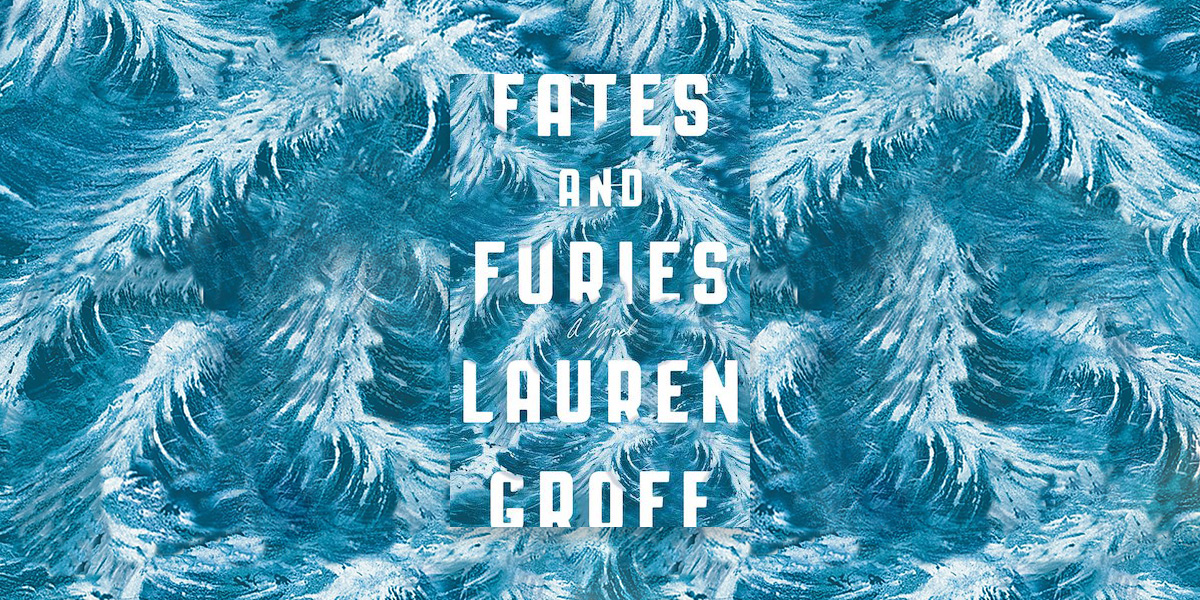
Lauren Groff, Fates and Furies (2015)
Please. Marriage is made of lies. Kind ones, mostly. Omissions. If you give voice to the things you think every day about your spouse, you’d crush them to paste. She never lied. Just never said.
*
Essential stats: Groff’s delicious, masterful novel was a New York Times bestseller and a finalist for the National Book Award and the National Book Critics Circle Award, but that doesn’t really cover it.
What made it defining? It was basically the highbrow Gone Girl, for one thing. But more importantly for this section: Fates and Furies was the book everyone you knew was reading in 2015, including everyone you didn’t actually know because they were a famous person that you followed on Instagram. It was, according to Laura Miller and also to me, the year’s most talked-about novel—not least because it was President Barack Obama’s favorite book of the year.
It even inspired some jazz. Well, why not?
That’s a pretty cool cover: Yep. And if you ask me, it’s still influencing book cover design. (It’s by Rodrigo Corral and Adalis Martinez, by the way.)
While we’re here: We should all revisit Groff’s mic-drop By the Book interview. And oh, right, her mic-drop answer to that question that only female writers are ever asked. We stan!
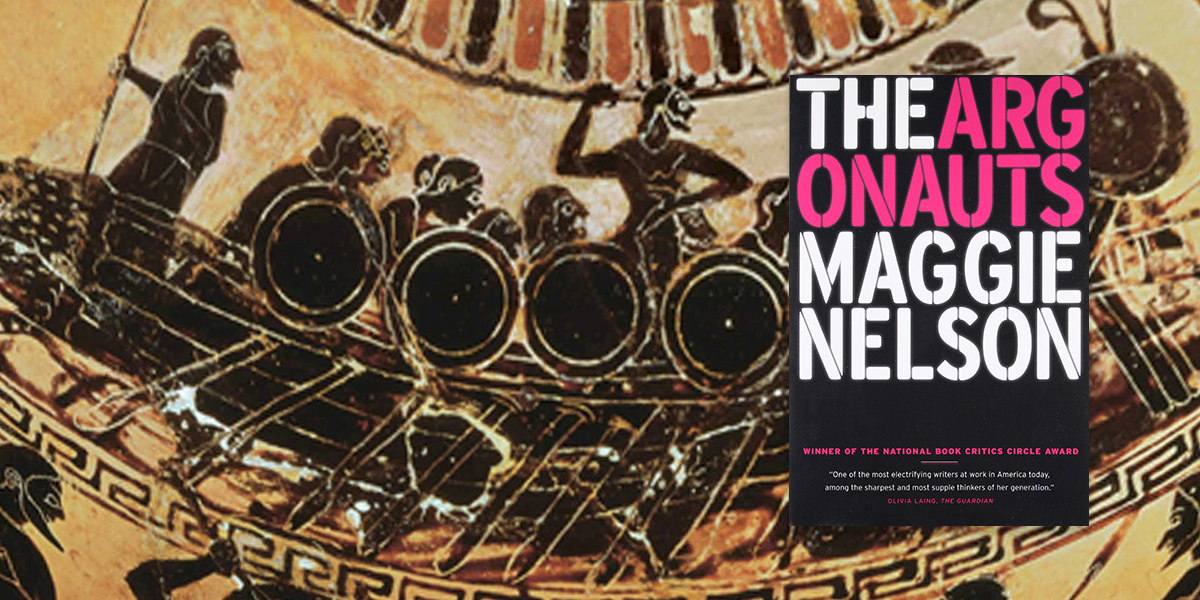
Maggie Nelson, The Argonauts (2015)
Empirically speaking, we are made of star stuff. Why aren’t we talking more about that?
*
Essential stats: Nelson’s groundbreaking work of “autotheory” was awarded the National Book Critics Circle Award in criticism and was a New York Times bestseller. In 2016, Nelson won a MacArthur “Genius” grant.
Why was it defining? In a decade in which discussions of gender, desire, sexuality, and the porous boundaries inherent in all of these have come starkly to the fore, The Argonauts is a clear and important book: a memoir and a work of theory at once, covering Nelson’s relationship with the artist Harry Dodge, who is fluidly gendered, and how they built a family together. It is important as social criticism, it is important as memoir and, frankly, it is important as art.
Watch this salon given at Barnard in honor of Nelson and the book:

Marlon James, A Brief History of Seven Killings (2015)
Killing don’t need no reason. This is ghetto. Reason is for rich people. We have madness.
*
Essential stats: Marlon James’ epic, dizzying, symphonic, and violent-as-hell third novel—a decades-spanning portrait of Jamaica (encompassing a host of gangsters, CIA agents, journalists, musicians, and businessmen) revolving around an assassination attempt on Bob Marley— was National Book Critics Circle Award finalist, one of Entertainment Weekly’s Top 10 Fiction Books of the Decade, and received the 2015 Man Booker Prize.
How epic are we talking? Epic. 704 pages. 75 characters. 5 sections, each named after a musical track and covering the events of a single day, bursting with more voices and dialects and slang than you can shake a stick at.
A beach read then. Did the critics like it? Yup.
“…epic in every sense of that word: sweeping, mythic, over-the-top, colossal and dizzyingly complex. It’s also raw, dense, violent, scalding, darkly comic, exhilarating and exhausting—a testament to Mr. James’s vaulting ambition and prodigious talent.” –Michiko Kakutani, The New York Times
“If the purpose of reportage is to tell us what happened, and the purpose of fiction is to show us how it felt, then James has succeeded on both counts.” –Emily Raboteau, Bookforum
“A Brief History of Seven Killings calls for a stout heart, strong stomach and prodigious powers of concentration, but the reader so equipped will be rewarded with an experience he or she will not soon forget. The novel makes no compromises, but is cruelly and consummately a work of art.” –Katherine A. Powers, The Minneapolis Star Tribune
After James won the Booker, how proud was the state of Minnesota of its adopted son? Very proud indeed. Mark Dayton, Governor of the land of 10,000 lakes, declared Wednesday, October 28, 2015 to be Marlon James Day in Minnesota.
Here’s James reading from the book:

Helen Macdonald, H is for Hawk (2015)
I think of what wild animals are in our imaginations. And how they are disappearing—not just from the wild, but from people’s everyday lives, replaced by images of themselves in print and on screen. The rarer they get, the fewer meanings animals can have. Eventually rarity is all they are made of. The condor is an icon of extinction. There’s little else to it now but being the last of its kind. And in this lies the diminution of the world. How can you love something, how can you fight to protect it, if all it means is loss?
*
Essential stats: Macdonald’s genre-bending memoir-cum-nature book was a runaway bestseller on both sides of the pond, and won the Samuel Johnson Prize and Costa Book of the Year award. In 2016, it also won France’s Prix du Meilleur Livre Étranger.
What did the critics say? In TIME, Lev Grossman wrote: “Macdonald’s first sight of her bird, when the breeder lifts her out of the cardboard box she travels in, is one of the most memorable passages I’ve read this year, or for that matter this decade.” In The New York Times, Dwight Garner wrote that Macdonald’s “beautiful and nearly feral” memoir “reminds us that excellent nature writing can lay bare some of the intimacies of the wild world as well. Her book is so good that, at times, it hurt me to read it. . . . H Is for Hawk seems to me a small, instant classic of nature writing, expansive in ways that recall Annie Dillard’s Pilgrim at Tinker Creek (1974), and as in touch with cruelty. It has, as well, some of the winding emotional reverb of Cheryl Strayed’s Wild (2012).”
Perhaps you would like to watch Macdonald train another goshawk?
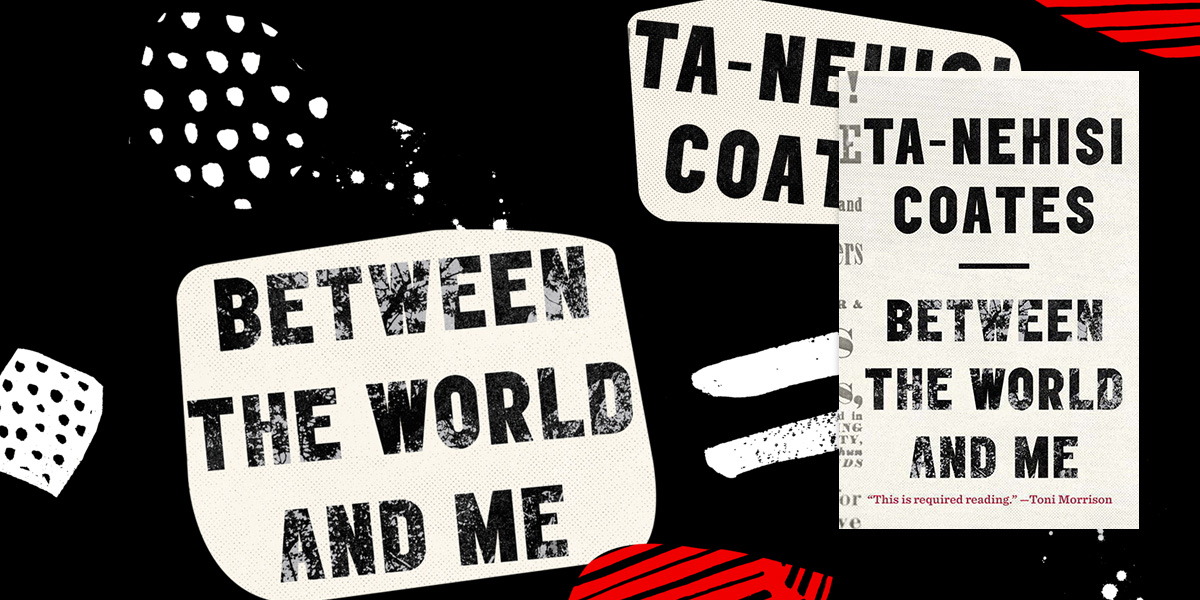
Ta-Nehisi Coates, Between the World and Me (2015)
I would not have you descend into your own dream. I would have you be a conscious citizen of this terrible and beautiful world.
*
Essential stats: Coates’s powerful treatise on race in America, styled as a letter to his son, won the 2015 National Book Award for Nonfiction, and the Kirkus Prize, and was also a finalist for the Pulitzer Prize that year. It was #1 on the New York Times bestseller list for three weeks. While Coates was already known as a public intellectual, this is the book that vaulted him into being a household name. The Guardian recently ranked it as the seventh best book of the 21st century.
Why was it so defining? It was a frank, personal account of being black in America, by a brilliant thinker, that came right as the frequency of murders of black people by police were coming to the forefront of widespread (white) consciousness. “I am writing you because this was the year you saw Eric Garner choked to death for selling cigarettes;” Coates explains in the book’s opening.
[B]ecause you know now that Renisha McBride was shot for seeking help, that John Crawford was shot down for browsing a department store. And you have seen men ini uniform drive by and murder Tamir Rice, a twelve-year-old child whom they were oath-bound to protect. And you have seen men n the same uniforms pummel Marlene Pinnock, someone’s grandmother, on the side of a road. And you know now, if you did not before, that the police departments of your country have been endowed wtih the authority to destroy your body.
“What is clear now is that he has indisputably inherited the mantle of “America’s conscience,” wrote Thomas Chatterton Williams of Coates in The Washington Post. “It is a role he has sought—and also been thrust into—in the age of Obama. This is both a coveted and a dangerous position to be in.”
But here’s the kicker: “I’ve been wondering who might fill the intellectual void that plagued me after James Baldwin died,” Toni Morrison wrote after reading an early copy. “Clearly it is Ta-Nehisi Coates.” Hard to get more defining than that.
Coates at the Chicago Humanities Festival:

Viet Thanh Nguyen, The Sympathizer (2015)
We don’t succeed or fail because of fortune or luck. We succeed because we understand the way the world works and what we have to do. We fail because others understand this better than we do.
*
Essential stats: It’s already hard to remember that The Sympathizer was USC professor Nguyen’s debut—it, and he, are now such vital parts of the literary landscape. The novel was awarded the 2016 Pulitzer Prize, as well as the Dayton Literary Peace Prize, The Center for Fiction First Novel Prize, the Carnegie Medal for Excellence in Fiction, and a host of other prizes. It was also a bestseller, of course—the paperback alone was on the Los Angeles Times list for 70 weeks. As for Nguyen himself, he was awarded both a MacArthur “Genius” Grant and a Guggenheim Fellowship in 2017.
What made it defining? The Sympathizer is the most important war novel of the decade. It upended our deeply entrenched, America-centric views of the Vietnam War, which, as Philip Caputo pointed out in The New York Times, was a “very literary war.” But The Sympathizer, he writes, whose author was “born in Vietnam but raised in the United States, brings a distinct perspective to the war and its aftermath. His book fills a void in the literature, giving voice to the previously voiceless while it compels the rest of us to look at the events of 40 years ago in a new light.” Or as our own Jonny Diamond put it:
The Sympathizer is an American novel about an American War, a devastating and needless conflict that created hundreds of thousands of refugees, new Americans (we were all new here, at some point) who found a home in the empire that displaced them, and who’ve made it better. Our cultural account of the American war in Vietnam has never been fully “ours” because it has neglected and actively excluded the perspectives of these refugees and their descendants. The Sympathizer is a vital work of art that begins to redress that imbalance.
Here’s Nguyen on Late Night with Seth Meyers:
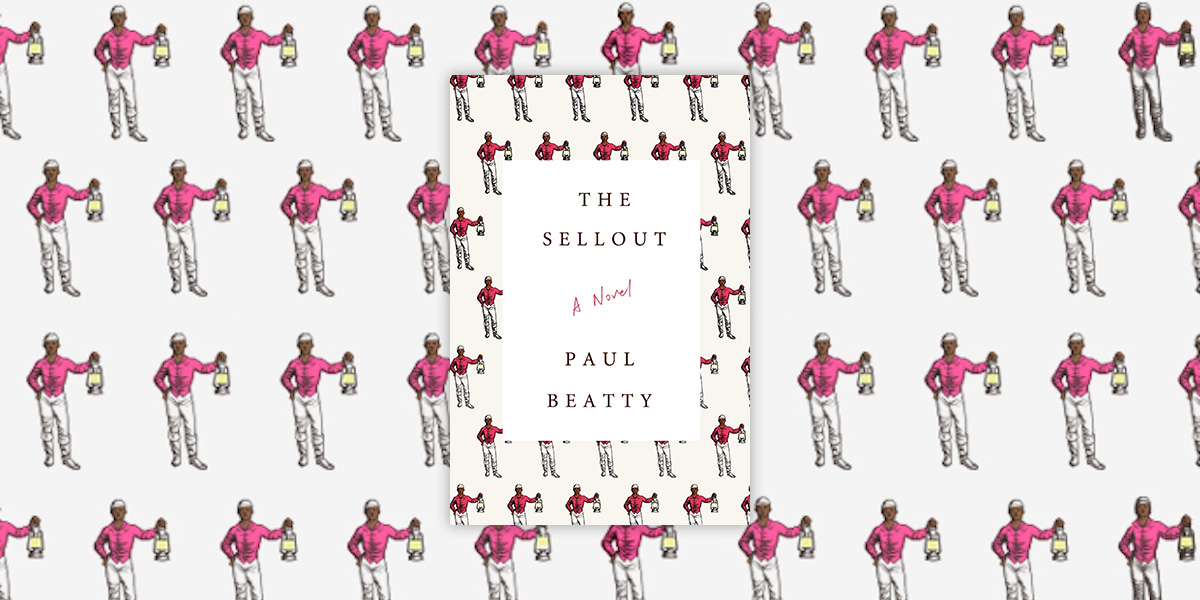
Paul Beatty, The Sellout (2015)
That’s the problem with history, we like to think it’s a book—that we can turn the page and move the fuck on. But history isn’t the paper it’s printed on. It’s memory, and memory is time, emotions, and song. History is the things that stay with you.
*
Essential stats: In 2016, The Sellout won the Man Booker Prize, making Beatty the first American writer to win that award. In her announcement chair of judges Amanda Foreman, said:
The Sellout is one of those very rare books that is able to take satire, which is in itself a very difficult subject and not always done well, and it plunges into the heart of contemporary American society and, with absolutely savage wit, of the kind I haven’t seen since Swift or Twain, both manages to eviscerate every social taboo and politically correct, nuanced, every sacred cow, and while both making us laugh, making us wince. It is both funny and painful at the same time and it is really a novel of our times.
The book also won the National Book Critics Circle Award. And not for nothing, at least one critic called it “a masterful work that establishes Beatty as the funniest writer in America.”
Would you say it was one of the best novels of the decade? I would indeed. “Paul Beatty’s Booker Prize-winning masterpiece is one of the funniest—and most human—novels I’ve ever read,” our own Jessie Gaynor wrote.
Not only that, it made me feel entirely vindicated for insisting upon comedy. The Sellout is so sharp you might not notice it’s cut you until you’ve already feeling faint. It’s a combination of laugh-out-loud comedy, precision social satire (rooted in a deep understanding of history), and literary tour de force. It’s so good it made me use the phrase “tour de force.” . . . It is, in addition to being one of the great satirical novels of the decade, and maybe of all time, a celebration of blackness in an allegedly post-racial era (keep in mind, this was 2015).
Listen to Beatty read from the novel at Politics & Prose:
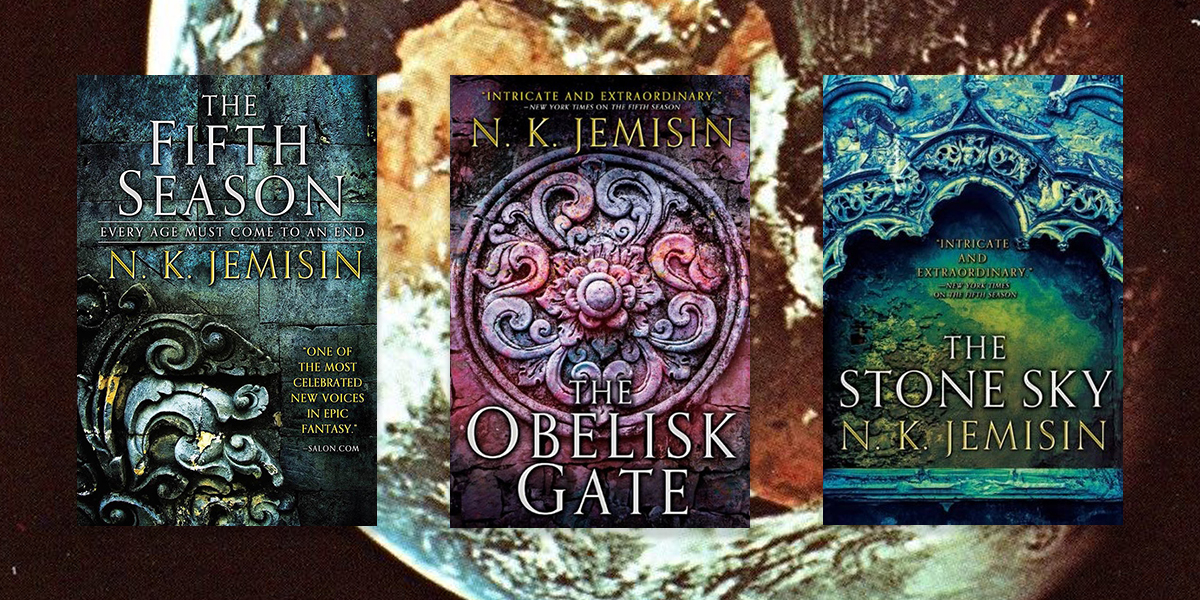
N. K. Jemisin, The Broken Earth Trilogy (2015-2017)
When we say “the world has ended,” it’s usually a lie, because the planet is just fine. But this is the way the world ends. This is the way the world ends. This is the way the world ends. For the last time.
*
Essential stats: All three novels in Jemisin’s trilogy (The Fifth Season, The Obelisk Gate and The Stone Sky) won Hugo awards for Best Novel (the Hugo being the most prestigious award in science fiction, of course). When The Fifth Season won in 2016, it made Jemisin the first black writer to win the award in that category. (Which is absurd, but there it is.) She is also the only writer to have won the Hugo for Best Novel in three consecutive years.
What did the critics say? For the most part, they knew what they were looking at: a new classic of the genre. In the Verge, Andrew Liptak wrote:
Every now and again there comes a work that seeks to redefine the face of genre literature, from Ursula K. Le Guin’s The Left Hand of Darkness to William Gibson’s Neuromancer. With the Broken Earth trilogy, Jemisin has made a place for herself among these greats, pulling off a landmark story that blends fantasy, science fiction, and post-apocalyptic tropes. Finishing The Stone Sky left me utterly breathless by the scale and scope of what Jemisin accomplished in these three books—narratively, technically, and thematically.
In a nutshell: I think this is the contemporary series is the most likely to still be on required reading lists in 50 years—if the world hasn’t actually ended by then, of course.
And of course: they’re making a television show.

Harper Lee, Go Set a Watchman (2015)
Prejudice, a dirty word, and faith, a clean one, have something in common: they both begin where reason ends.
*
Essential stats: According to Amazon, Harper Lee’s posthumous follow up to Great American Novel To Kill a Mockingbird was the most pre-ordered book on that site since the final installment of Harry Potter.
I heard it reveals that Atticus Finch was a racist all along, is that true? Well, sorta. While the book was originally promoted as a “sequel” to Lee’s beloved, Pulitzer Prize-winning To Kill a Mockingbird, it now seems that it was in fact something closer to a first draft (though not everyone is convinced). In which, well, yes, Atticus is a racist, who has attended at least one Klan meeting, and who asks Scout leading questions like “Do you want Negroes by the carload in our schools and churches and theaters? Do you want them in our world?” RIP the best dad in literature. Is it weird to say it’s no more than we deserve?
But is it any good? Reviews were mixed. General opinion is . . . not really.
So why is it defining? I mean, dredging up pages from a famous author that should never have seen the light of day on the strength of our nostalgia for a feel-good book about a white savior, only to find that if you poke harder he’s really not that great after all? That sounds just exactly like this decade.
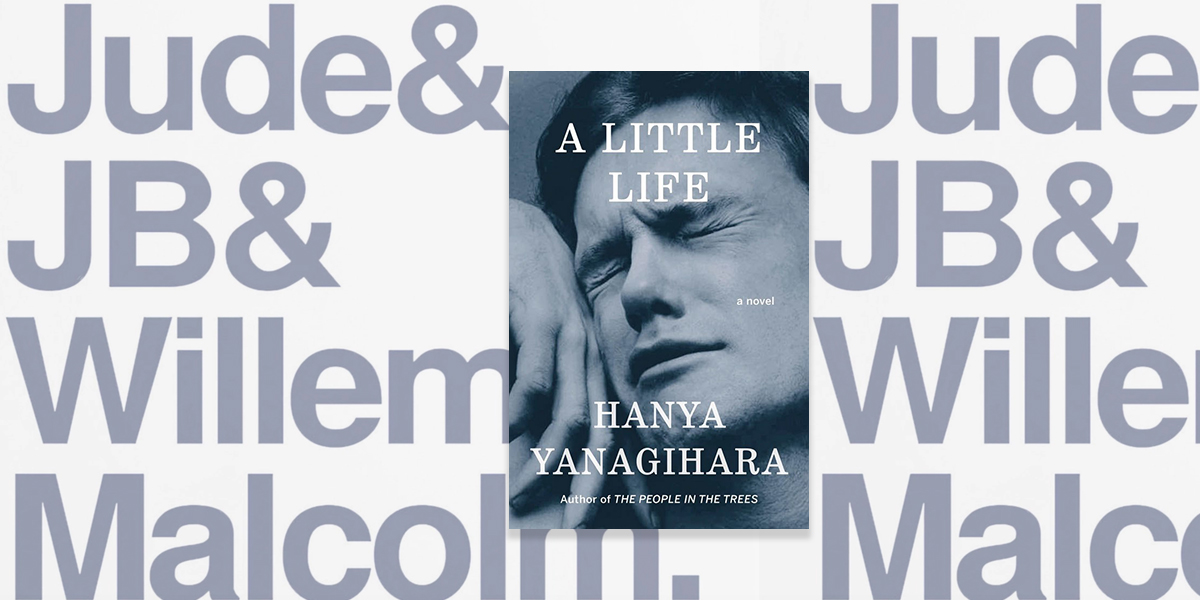
Hanya Yanagihara, A Little Life (2015)
You won’t understand what I mean now, but someday you will: the only trick of friendship, I think, is to find people who are better than you are—not smarter, not cooler, but kinder, and more generous, and more forgiving—and then to appreciate them for what they can teach you, and to try to listen to them when they tell you something about yourself, no matter how bad—or good—it might be, and to trust them, which is the hardest thing of all. But the best, as well.
*
Essential stats: Yanagihara’s extremely difficult, extremely ambitious, unusually disturbing 814-page novel won the 2015 Kirkus Prize, and was a finalist (or shortlisted) for the Booker, the National Book Award, the Andrew Carnegie Medal for Excellence in Fiction, and the International Dublin Literary Award. No one expected it to become a bestseller, for the reasons listed above, but somehow it did, becoming a bona fide phenomenon and “the sleeper literary hit of the summer.” Absolutely everyone who read it took a picture of themselves holding it up in front of their face. I mean, there was merch. Merch worn by Antoni, the robot trapped in a human body on Queer Eye. It was also, not for nothing, one of the best novels of the decade, in the opinion of this establishment.
What did the critics say? Opinions were split, even polarized. Garth Greenwell hailed it as a candidate for the “great gay novel,” writing for The Atlantic that “in this astonishing novel, Yanagihara achieves what great gay art from Proust to Almodóvar has so often sought: a grandeur of feeling adequate to ‘the terrifying largeness, the impossibility of the world.'” On the other hand, in The New York Times Book Review, Carol Anshaw took issue with the abstraction of Yanagihara’s New York City, writing that her “success in creating a deeply afflicted protagonist is offset by placing him in a world so unrealized it almost seems allegorical, with characters so flatly drawn they seem more representative of people than the actual thing. This leaves the reader, at the end, wondering if she has been foolish for taking seriously something that was merely a contrivance all along.”
But tell me, is it worth it? This reader says yes. Hysterical Realism 4 Eva.
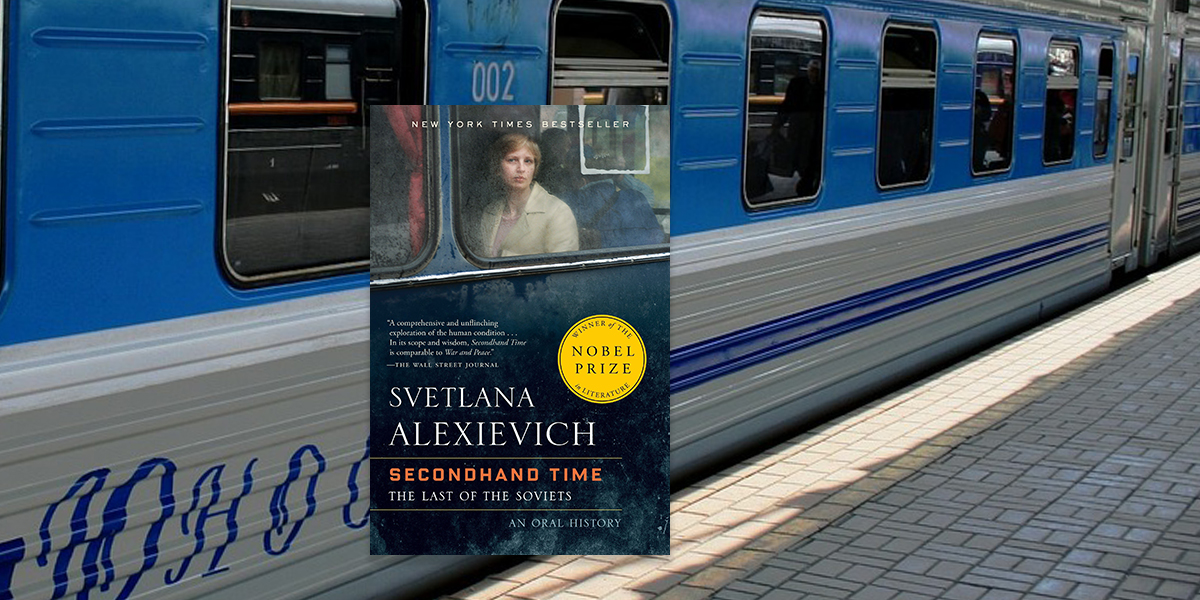
Svetlana Alexievich, Secondhand Time (2016)
No one had taught us how to be free. We had only ever been taught how to die for freedom.
*
Essential stats: The 2015 Nobel Prize-winning Belarusian writer’s account of the end of the Soviet Union, told through the stories of ordinary citizens, Secondhand Time was a mammoth, intimate, twenty-year undertaking that cemented Alexievich’s legacy as the “chronicler of the Russian-Soviet soul” and one of the foremost oral historians of all time. According to The Guardian, it is the best book of the decade (and the third best of the 21st century).
How Bleak is it? I mean, yes, unsurprisingly it’s pretty damn bleak. Secondhand Time is 450 pages of worn-out Russians detailing their daily lives during the fall of the Soviet Union—an idea so powerful that it once held sway over a third of the world—and what it’s like to live in the new Russia left in its wake. It’s all pretty heartbreaking.
How was it received in Russia? Not well. The book caused a fair amount of controversy and outrage when it was first published in Russia, where reviewers called it a “slanderous piece of fantasy” and part of a “hysterical chorus of malign attacks.”
You got any cool quotes from the Nobel Prize folks about her? Damn right we do. Announcing her win, the Swedish Academy praised Alexievich’s “polyphonic writings,” describing them as a “monument to suffering and courage in our time.”
Alexievich on the BBC:
–DS

Colson Whitehead, The Underground Railroad (2016)
America, too, is a delusion, the grandest one of all. The white race believes—believes with all its heart—that it is their right to take the land. To kill Indians. Make war. Enslave their brothers. This nation shouldn’t exist, if there is any justice in the world, for its foundations are murder, theft, and cruelty. Yet here we are.
*
Essential stats: Prize-palooza. It won the Pulitzer, the National Book Award, the Arthur C. Clarke Award, and the Andrew Carnegie Medal for Excellence. It was longlisted for the Booker. Oprah chose it for her book club. Barry Jenkins is adapting it into a miniseries, hopefully with Walton Goggins and Chadwick Boseman. The Guardian put it on their absurdly premature list of the best books of the 21st century. Whitehead was on TIME‘s list of the 100 most influential people in 2017, with Oprah herself writing the citation (see below). In 2019, he made the cover. Plus, it was a huge bestseller.
The stat that actually matters: Everyone—everyone—was reading it. I’ve never seen a book more ubiquitous on the subway.
Here’s Oprah herself on The Underground Railroad:
From the first page of Colson Whitehead’s extraordinary novel The Underground Railroad I knew I was reading something ground-shifting. I’ve been a student of African-American history since about age 14, and I thought I knew just about everything there was to know about slavery and the Freedom Train. But that’s what’s so powerful about great literature: it deepens your perspective, opens your consciousness and allows you to be in the shoes of its characters, journeying alongside them.
In the year since I first read this book, it has been affirming to see how it’s been embraced, winning the Pulitzer Prize and becoming a No. 1 best seller. I believe that’s because Colson has a vision about what it means to make art. He didn’t just write a historical novel about slavery and courage and the beating heart of freedom. Although the struggle continues and our challenges are not behind us, the brilliance of his vision is that he reminds us that, like his heroine Cora, we can never give up hope, can never stop trying.
Whitehead in conversation with WAMU reporter Jonathan Wilson at Politics & Prose:

Lindy West, Shrill (2016)
Feminism is really just the long slow realization that the things you love hate you.
*
Essential stats: West’s first memoir was a New York Times bestseller, and the winner of The Stranger Genius Award. Right now, Amazon ranks it as the #23 bestseller in Hunting & Fishing Humor. (Sorry, this is no shade to Shrill, only shade to Amazon.) “Lindy West is the troll-fighting feminist warrior you’ve been waiting for,” the L.A. Times crowed. They were right.
Why was it important: In this decade, Lindy West has become one of the essential feminist voices in the culture. She’s funny, she’s brilliant, and she’s always, always unafraid. This book wasn’t the beginning of that, but it was her breakout moment. Take it from Caitlin Moran, who said “It’s literally the new Bible.” Ok!
Wait, isn’t this a show? Yep, Elizabeth Banks adapted West’s memoir into a television show for Hulu.
And one final moment to bask in the glory of West’s wedding dress (sorry, simply couldn’t be helped):

“It was a gorgeous, chaotic, loving, perfect day,” she wrote. “And I was fat as hell the whole time.”
I skipped the bridal boutiques altogether. My friend, artist and designer Mark Mitchell, and I conceived of the most beautiful dress we could imagine, which, according to the old orthodoxies, just happened to be the least “flattering” dress possible for a fat chick: a strapless, skin-tight mermaid gown exploding with silk flowers. The flowers—my god, the wisteria!—added extra bulk in areas I’m supposed to try and “slim”. The silhouette accentuated my stomach instead of camouflaging it. My arms looked like what they are—strong, and big. I didn’t wear Spanx. I was beautiful.
You really, really, love to see it.
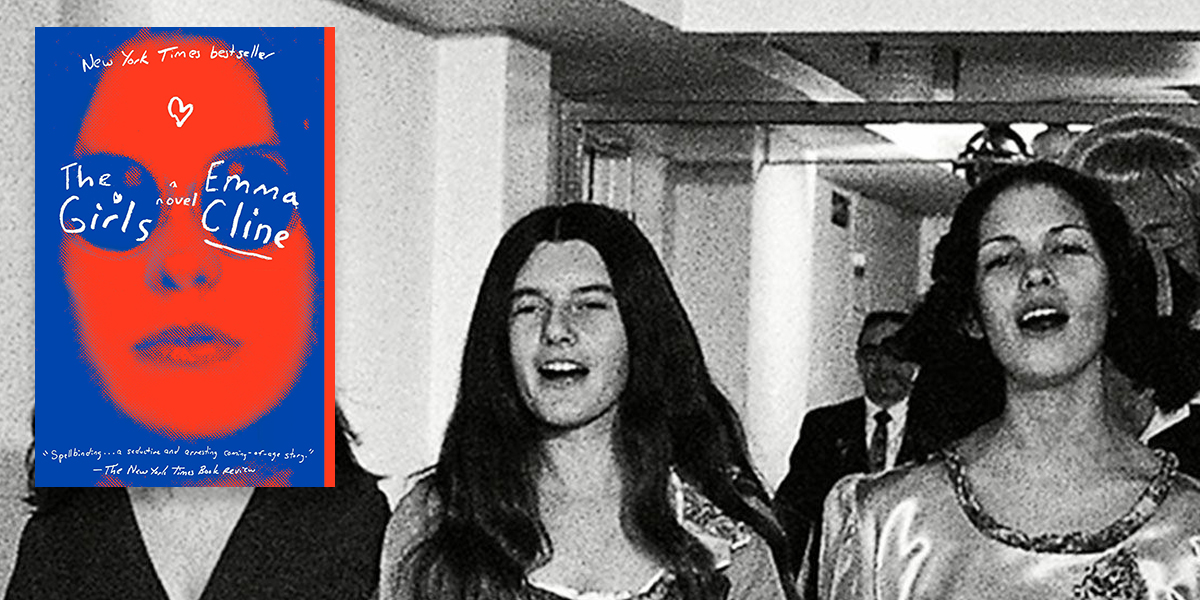
Emma Cline, The Girls (2016)
Poor Sasha. Poor girls. The world fattens them on the promise of love. How badly they need it, and how little most of them will ever get. The treacled pop songs, the dresses described in the catalogs with words like ‘sunset’ and ‘Paris.’ Then the dreams are taken away with such violent force; the hand wrenching the buttons of the jeans, nobody looking at the man shouting at his girlfriend on the bus.
*
Essential stats: Cline’s debut novel, based on the Manson Family murders, sold for a “rumored $2 million and change” in 2014 after a 12-way auction. It was an instant bestseller at spent 12 weeks on the New York Times list; Cline was named one of Granta‘s Best Young American Novelists, and it was on pretty much everybody’s best-of-the-year list.
What made it such a phenomenon? Well, it had everything Americans love—freaks, sex, dead girls, drugs, the same old stories of our wicked past retold—and was the debut of a young (27!), blonde-haired, blue-eyed woman, a pretty wunderkind, if you will, which is the other thing Americans reliably love. People were as obsessed with her as they were with her novel. Everything about it, including the lush writing, was seductive as hell.
What did the critics say? On the one hand, Ron Charles in The Washington Post: “The most remarkable quality of this novel is Cline’s ability to articulate the anxieties of adolescence in language that’s gorgeously poetic without mangling the authenticity of a teenager’s consciousness. The adult’s melancholy reflection and the girl’s swelling impetuousness are flawlessly braided together…[F]or a story that traffics in the lurid notoriety of the Manson murders, The Girls is an extraordinary act of restraint. With the maturity of a writer twice her age, Cline has written a wise novel that’s never showy: a quiet, seething confession of yearning and terror.
On the other, Dwight Garner, who memorably titled his Times review “The Girls Has a Great Start. Too Bad About the Rest.” I don’t think he cost her any book sales, though.
You know it’s a hit when someone claims you stole it: Like Cline’s ex-boyfriend did. Get lost, buddy.
Cline in conversation with Ellen Sussman:

Margot Lee Shetterly, Hidden Figures (2016)
Sometimes, she knew, the most important battles for dignity, pride, and progress were fought with the simplest of actions.
*
Essential stats: Shetterly’s groundbreaking history book about the three black, female mathematicians who fueled the space race was a #1 New York Times bestseller and won the Anisfield-Wolf Book Award in 2017. As you may have heard, it was also adapted into a film starring Taraji P. Henson, Octavia Spencer, and Janelle Monáe, which, just like the women it highlights, rather exceeded expectations.

What did the critics say? “When we think of the aeronautical boom today, we speak instead of the astronauts, we conceive of gawky, brilliant, skinny white boys,” Maya Gittelman wrote. “This is no accident, but a continuation of the very injustice and erasure that Shetterly confronts and combats with her work … Restoring the truth about the individuals who were at once black, women and astounding mathematicians, in a world that was constructed to stymie them at every step, is no easy task. Shetterly does it with the depth and detail of a skilled historian and the narrative aplomb of a masterful storyteller.” Exactly what we needed this decade.

Not for nothing: It has now become one of those touchstone comp books—meaning that it has spawned a host of book pitches (and book deals), with lots of writers describing their books as “Hidden Figures meets x.” To which I say: good.


Carlo Rovelli, tr. Simon Carnell and Erica Segre, Seven Brief Lessons on Physics (2016)
We are made of the same stardust of which all things are made, and when we are immersed in suffering or when we are experiencing intense joy we are being nothing other than what we can’t help but be: a part of our world.
*
Essential stats: The essays in Rovelli’s cult hit started out as a series of newspaper columns, published in the Italian paper Il Sole 24 Ore, and when they were originally collected into a book in that country, it blew up, outselling Fifty Shades of Grey. It went on to become a bestseller in several other countries—it’s been translated into at least 41 languages—including the United States.
But he remained humble: “Every publisher has been calling me once a week trying to force me to sign a blank contract,” he told Evening Standard in 2015. “‘Write whatever you want, it doesn’t matter what you send us.’ But I’ve said no to everything. I’m a scientist, a university professor. If an angel appeared before me and asked would I rather solve quantum gravity or sell 10 million copies of my book, I’d say I’d rather solve quantum gravity. It hasn’t changed anything in my life and I’m certainly not becoming rich.” (I bet that’s changed.)

What are these lessons? You can read an overview here.
Ok, but what’s the pitch? “Broaden your universe in eighty pages.” (No wonder it was a sensation.)
Here’s Rovelli’s lecture at The Royal Institution:

J. D. Vance, Hillbilly Elegy (2016)
What separates the successful from the unsuccessful are the expectations that they had for their own lives. Yet the message of the right is increasingly: It’s not your fault that you’re a loser; it’s the government’s fault.
*
Essential stats: Vance’s memoir of growing up in Ohio in a family with “Appalachian values” was a huge #1 New York Times Bestseller and was frequently cited during and after the 2016 election, as a kind of explanation for why certain Americans were willing to vote for Donald Trump. It was received quite positively by critics when it first came out, but a backlash slowly unfurled. A film adaptation starring Amy Adams and Glenn Close and directed by Ron Howard is slated for 2020.
I heard there was some controversy about this book. What was it? Well. The problem is that Hillbilly Elegy is a mostly personal memoir that Vance framed as the Answer (at last!) to the question What’s Wrong with Rural America???—but an answer that included no broader framework of inequality, capitalism, or intersectionality (“working class” frequently being used to mean “white working class”), and promoted a boostraps-heavy narrative that basically blamed poor people for being poor. Here’s what’s wrong with rural America, Vance tells us, and it’s their own fault.
Any good bits? A school of resistance has sprung up in his wake, with writers like Elizabeth Catte, who also writes about Appalachia, finding readers in rebuttal. As one Literary Hub editor said, “He inspired so much good writing that it’s almost okay for me.” A second Literary Hub editor added, “But fuck that guy.”
Or you can always watch his TED talk and decide for yourself:

Jesmyn Ward, Sing, Unburied, Sing (2017)
Sometimes the world don’t give you what you need, no matter how hard you look. Sometimes it withholds.
*
Essential stats: It won the National Book Award and was on almost everyone’s list of the best books of the year—including President Obama’s. It was also a finalist for the Kirkus Prize, the Andrew Carnegie Medal, the Aspen Words Literary Prize, and the National Book Critics Circle Award. Not too shabby. Ward was on TIME‘s list of most influential people in 2018—in the citation, Empire co-creator Lee Daniels wrote that she “captures the African-American experience with authenticity and nuance. She is a modern-day William Faulkner, painting tapestries of an America that has not been heard.” He wasn’t the first person to compare Ward to Faulkner, either.
But what’s the deal: For someone with two National Book Awards, Jesmyn Ward is still relatively (and bizarrely) under-read—or maybe just under-discussed. (Which is a defining fact all of its own.)
Listen to an excerpt here:
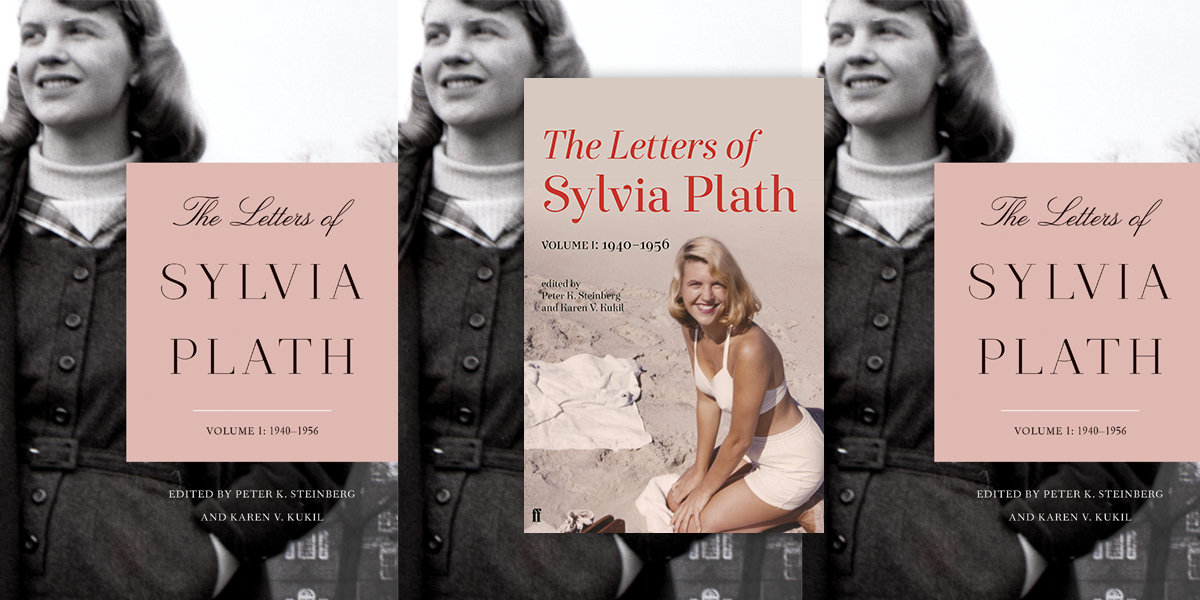
Sylvia Plath, The Letters of Sylvia Plath, Vol. 1: 1940-1956 (2017)
My biggest trouble is that people look at me and think that no serious trouble has ever troubled my little head. They seldom realize the chaos that seethes behind my exterior. As for the who Am I, what am I angle…that will preoccupy me till the day I die.
*
Essential stats: This collection of Plath’s letters, edited by Peter K. Steinberg and Karen V. Kukil, contained many that had never before been published, including sixteen letters Plath wrote to Ted Hughes while they were apart after their honeymoon. Though the second volume was more revealing about Plath’s life and the abuse she suffered from Hughes, this one was much more discussed.
How come? Or what’s so defining about the letters of a long-dead poet? Well, it wasn’t so much the letters themselves as the cover, you see. The UK version—but not the US version, interestingly—featured a smiling Plath in her bikini (or, as she herself described it, “a neat two-piece white Jantzen bathing suit”). It’s a famous picture, but it stirred up quite a controversy. Cathleen Allyn Conway called the photograph “a visual antithesis to the ambitious, intellectual poet,” and wrote, “Why is her work, so heavy with symbolism and myth, which documents the frustrating consequences of transgressive womanhood, marketed with so little thought and respect? . . .
Presenting female writers as sexualized and frivolous diminishes their intellectual credentials, tarnishes their work as slight, not to be taken seriously. Plath’s poems were visceral and impolite; her novel was about madness. The image that best represents a writer of her range and talent is not, as she wrote about in her poem “The Applicant,” the “living doll” on biographies and collections and broadsheets “everywhere you look”, forever emblazoned on our consciousness as a 22-year-old bronzed blonde in a bikini.
She pointed out that Plath only kept her blonde hair for three months; she preferred herself as a brunette. Lots of other writers agreed, decrying the cover, but there was also backlash to the backlash (of course)—Emily Van Duyne, who is writing a book about Plath, took issue with the whole thing, and in particular with Conway’s hair color argument, writing:
this furthers Hughes’ dangerous idea that Plath, or any of us, has a single, definitive “self,” an idea we visit almost exclusively upon the heads of women writers. We celebrate Whitman’s celebration of himself, with its numinous notion that “I am large, I contain multitudes.” We have no problem reconciling the idea that he was both queer and a hetero-braggart who claimed to have fathered six illegitimate children, yet we take to task a photograph of a bikini-clad Plath in her college years — as though she could not possibly be both the genius she was, and a woman who was body confident, sexy, happy to smile for the camera.
In these very (digital) pages, Nichole LeFebvre was torn—and so were some of the writers and thinkers she polled on the subject. I like what Lisa Russ Spaar told her: “how can we guess, in retrospect, how Plath would have wanted to portray herself as we approach the end of the second decade of the twenty-first century? To paraphrase the poet A. R. Ammons, touch the universe anywhere, you touch it everywhere. Our reactions to those images must reveal much about ourselves, which is one of the great gifts of history, of literature, of art.”
But still. In a nutshell:
I’m waiting for the day Ted Hughes appears in a bathing suit on the cover of his Selected Letters. https://t.co/ZbO80LsY3M
— Ann Townsend (@anntownsendpoet) July 5, 2017
(Well, someone obliged):
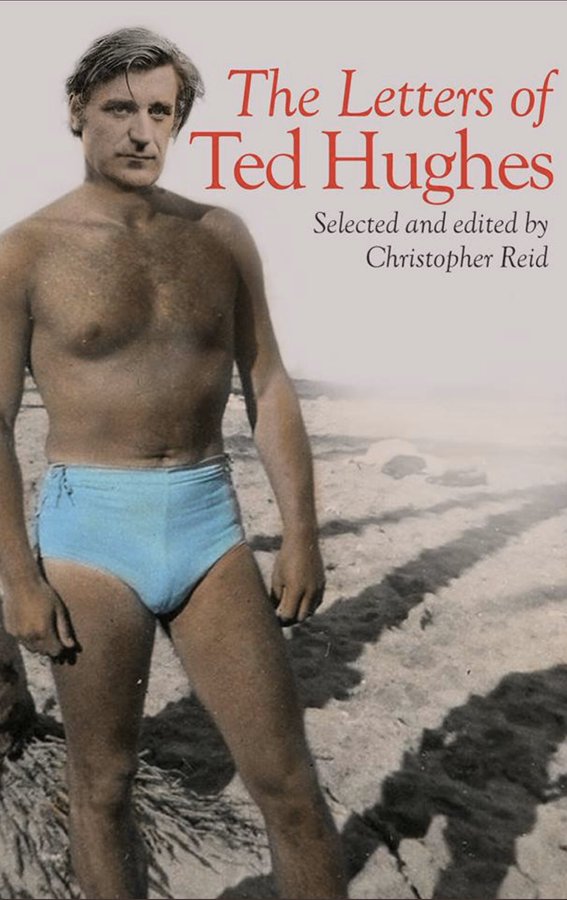
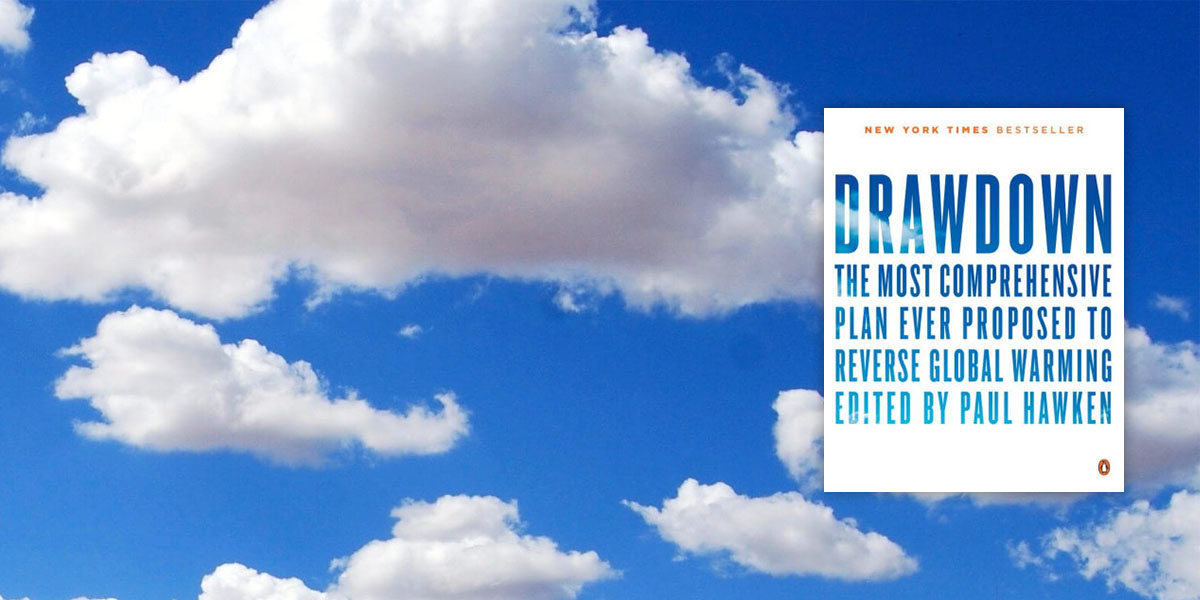
Paul Hawken, Drawdown (2017)
We see global warming not as an inevitability but as an invitation to build, innovate, and effect change, a pathway that awakens creativity, compassion, and genius. This is not a liberal agenda, nor is it a conservative one. This is the human agenda.
*
Essential stats: The bestselling Drawdown lays out 100 potential solutions for climate change, as complied by Project Drawdown, which itself was founded by the legendary, highly influential environmental writer Hawken.
What is “drawdown” anyway? According to Hawken, it is “the point in time when greenhouse gas concentrations peak in the atmosphere and begin to go down on a year-to-year basis.”
What’s the significance of the book? As David Roberts put it in Vox:
For all the hand-wringing on climate change over the years, discussion of solutions remains puzzlingly anemic and fractured. A few high-profile approaches, mainly around renewable energy and electric cars, dominate discussion and modeling. Until 2017, there was no real way for ordinary people to get an understanding of what they can do and what impact it can have. There was no single, comprehensive, reliable compendium of carbon-reduction solutions across sectors.
Now there is.
Listen to Hawken talk about it:

Samin Nosrat, Salt, Fat, Acid, Heat (2017)
“Season food with the proper amount of salt at the proper moment; choose the optimal medium of fat to convey the flavor of your ingredients; balance and animate those ingredients with acid; apply the right type and quantity of heat for the proper amount of time—do all this and you will turn out vibrant and beautiful food, with or without a recipe.”
*
Essential stats: New York Times Bestseller; winner of the 2018 James Beard Award for Best General Cookbook and multiple IACP Cookbook Awards; named one of the best books of the year by: NPR, BuzzFeed, The Atlantic, The Washington Post, Chicago Tribune, Rachel Ray Every Day, San Francisco Chronicle, Vice Munchies, Elle.com, Glamour, Eater, Newsday, Minneapolis Star Tribune, The Seattle Times, Tampa Bay Times, Tasting Table, Modern Farmer, Publishers Weekly, etc. etc. etc. Oh, and perhaps you’ve heard of the Netflix show?
Or to put it another way: It’s The Joy of Cooking for the modern chef.
What makes this book different from all the other cookbooks? I’ll let the legendary Alice Waters explain, in her citation for Nosrat’s inclusion on TIME‘s 2019 most influential people list:
Years ago, Samin Nosrat taught me how to make fresh mozzarella bocconcini; I remember she was so encouraging, showing me how to carefully hand-form the little bocconcini in hot water. There is magic in the way Samin teaches. She wins you over immediately with an irresistible combination of warmth, honesty, deep understanding of cooking and that ebullient laugh of hers. If anyone can show us how to cook, it is Samin.
So it’s no surprise that her book Salt, Fat, Acid, Heat and her Netflix series are both so groundbreaking. Her book is rich with science and technique but never feels weighty; it has a joyful, whimsical quality that demystifies cooking in a very personal way. You can feel that same exuberant curiosity and radical openness in Samin’s series—she’s learning from the farmers who take care of the land, the women making their grandmothers’ recipes and of course her own mother, who taught Samin how to make tahdig, Persian crisped rice.
Samin shows us what a beautiful experience it is to understand your ingredients—where they come from, who grew them, how alive they are, how people around the world transform them in delicious, diverse ways. I love the passion and poise with which Samin delivers this message about food. Because in the end, it’s a universal message, and it’s one we have forgotten: that cooking is about care.

Yum.

Naomi Alderman, The Power (2017)
It doesn’t matter that she shouldn’t, that she never would. What matters is that she could, if she wanted. The power to hurt is a kind of wealth.
*
Essential stats: Alderman’s bestselling science fiction novel—which asks what might happen if women developed physical dominance over men (in this case via the power to electrocute them with a touch)—won the Baileys Women’s Prize for Fiction, and was named by both The New York Times and President Barack Obama as one of the best books of the year. Obviously, it’s going to be adapted as a television show.
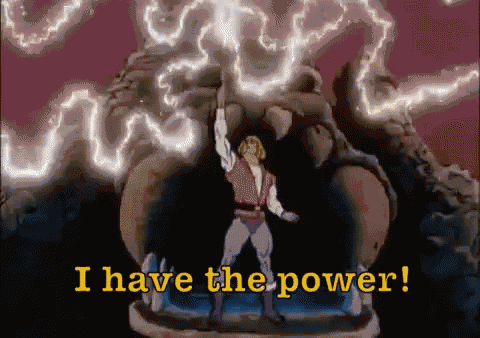
Why was it important? It was instantly hailed as a new feminist classic—and was a timely publication in the height of the #MeToo movement. In The Washington Post, Ron Charles wrote, “Alderman has written our era’s Handmaid’s Tale, and, like Margaret Atwood’s classic, The Power is one of those essential feminist works that terrifies and illuminates, enrages and encourages.” It is also about, as the title suggests, power itself—which is, or should be, the most urgent topic of our times.
So should all the women in the world get to electrocute people? Probably not, I guess. But it would be nice for a while.

Angie Thomas, The Hate U Give (2017)
What’s the point of having a voice if you’re gonna be silent in those moments you shouldn’t be?
*
Essential stats: Thomas’s young adult debut was an instant #1 bestseller on The New York Times young adult list, where it remained for a whopping 80 weeks. It was the most searched-for book on Goodreads in 2017, won a host of awards for children’s and young adult literature, and, perhaps most revealing, it was one of the ten most challenged books in the country in both 2017 (when it was “considered “pervasively vulgar” and because of drug use, profanity, and offensive language) and 2018 (when it was “deemed “anti-cop,” and for profanity, drug use, and sexual references”). In 2018, it was adapted into a feature film starring Amandla Stenberg. It was also one of the first novels to directly engage with the Black Lives Matter movement.
What does that title mean? It is, of course, a reference to Tupac Shakur’s concept of THUG LIFE: “The Hate U Give Little Infants Fucks Everybody.”
What did the critics say? They loved it. Over at Vox, Constance Grady wrote:
The Hate U Give is a didactic issues novel for teenagers. It is also a good book. Those two categories intersect only rarely, but The Hate U Give—a debut novel by Angie Thomas—manages the balancing act with aplomb … It was probably inevitable that someone would write a YA novel about police shootings, but it was not inevitable that it would be a good book. Whenever a societal problem becomes a national obsession, some adult will write a book about it for teenagers; usually the result is a Go Ask Alice–style stew of fearmongering and breathless sensationalism. But The Hate U Give is charming and funny and carefully crafted, and Starr’s witty, observant, pop culture–inflected voice is a delight … The specificity and whimsy of ideas like the anger scale of breakup songs is what keeps The Hate U Give moving so deftly through its heavy subject matter; it stays warm and focused and grounded in character even when it’s dealing with big, amorphous ideas like systemic racism. The result is a book so thoughtful and so fun to read that you’ll want to Bruno Mars it.

Michael W. Twitty, The Cooking Gene (2017)
The food is in many cases all we have, all we can go to in order to feel our way into the past.
*
Essential stats: The book, which received a James Beard Award, was on the list of NPR’s Best Books of 2017 and a finalist for the Kirkus Prize. It went through five hardcover printings and was released in paperback last July.
Why was it defining? Twitty’s exploration of the foodways of the American South, rooted in his own story as a black, gay, Jewish man, epitomizes a recent shift in food writing toward narratives that reckon with the social and political power structures that created our food systems.
What did critics say? Padma Lakshmi, Nigella Lawson, and many other heavy-hitters in the food world loved it. Sho Spaeth wrote for Serious Eats: “Much of Twitty’s work can be described as that of reclamation—of African American identity, of African American cuisine, of the security and comfort of the kitchen, and, above all, of the ownership of the largely white scholarship surrounding the African American experience. … It is an avenue for catharsis, a way to dispel the evil that is the product of ignorance, willful or otherwise.” Dr. Henry Louis Gates wrote, “Slavery made the world of our ancestors incredibly remote to us. Thankfully, the work of Michael W. Twitty helps restore our awareness of their struggles and successes bite by bite, giving us a true taste of the past.”
Michael Twitty on PBS:
And see more: on Afroculinaria.
–CS

Tara Westover, Educated (2018)
My life was narrated for me by others. Their voices were forceful, emphatic, absolute. It had never occurred to me that my voice might be as strong as theirs.
*
Essential stats: Westover’s first book, a memoir of growing up in a Mormon survivalist family, and of reconciling her upbringing with her thirst for education, debuted at #1 on The New York Times bestseller list. As of this writing, it has been on the list ever since, for 88 weeks straight.
Why is it so good? As Alec MacGillis put it in The New York Times:
Tara Westover’s new tale of escape, Educated, makes [J.D.] Vance’s seem tame by comparison. Where Vance wrote affectingly of showing up at Ohio State and Yale Law with the limited preparation provided by his middling schools in Middletown, Ohio, Westover describes showing up in college with no schooling at all. Where Vance describes a family contending with the all-too-common burdens of substance abuse, Westover lays bare a family cursed by ideological mania and outlandish physical trauma. If Vance’s memoir offered street-heroin-grade drama, Westover’s is carfentanil, the stuff that tranquilizes elephants.
The extremity of Westover’s upbringing emerges gradually through her telling, which only makes the telling more alluring and harrowing. The basics are these: Now in her early 30s, she was the youngest of seven in a survivalist family in the shadow of a mountain in a Mormon pocket of southeastern Idaho. Her father, Gene (a pseudonym), grew up on a farm at the base of the mountain, the son of a hot-tempered father, and moved up the slope with his wife, the product of a more genteel upbringing in the nearby small town. Gene sustained his growing family by building barns and hay sheds and by scrapping metal in his junkyard; his wife, Faye (also a pseudonym), chipped in with her income from mixing up herbal remedies and from her reluctant work as an unlicensed midwife’s assistant and then midwife.
Bill Gates is her biggest fan: She was one of TIME‘s most influential people of 2019, and in her citation, Bill Gates wrote:
If you haven’t read Educated yet, chances are you know someone who has. Tara Westover’s brilliant memoir has been on the best-seller list since its release, and for good reason. Her story of growing up in a Mormon survivalist home—and eventually escaping to earn a doctorate from Cambridge University—is hard to put down.
I had the opportunity to sit down with Tara last year, and she’s somehow even more impressive in person. Her unique perspective on polarization in America feels especially important right now. Educated isn’t a political book, but it touches on common divides in our country: red states vs. blue states, rural vs. urban, college-educated vs. not. Tara has a lot of smart things to say about overcoming those divides, and I’m glad Educated’s success has given her a platform to use her voice. I look forward to reading—or seeing!—what comes next from her.
And here she is on Ellen:
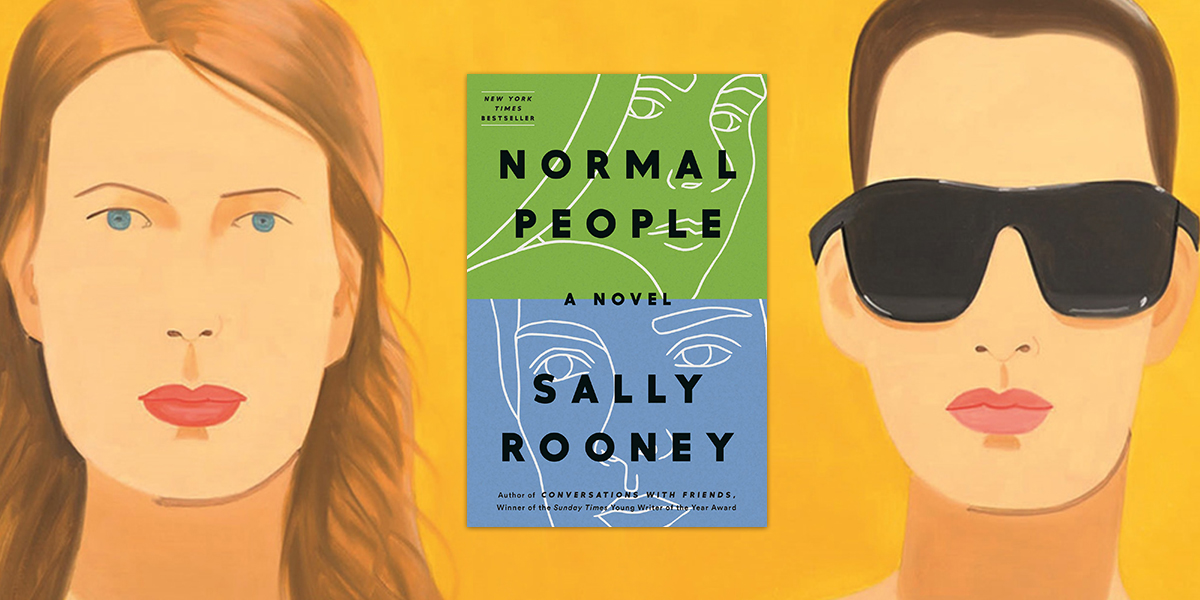
Sally Rooney, Normal People (2018)
It was culture as class performance, literature fetishized for its ability to take educated people on false emotional journeys, so that they might afterwards feel superior to the uneducated people whose emotional journeys they liked to read about.
*
Essential stats: The novel debuted at #3 on the New York Times bestseller list. It was longlisted for the Booker prize, and The Guardian listed it as one of the best books of the 21st century, which is either wildly premature or pretty accurate about how long this century will last. This year, TIME included Rooney on its 100 Next list; Meg Wolitzer wrote the citation.
How iconic is it? Well, to be fair, Conversations with Friends is more iconic as an object (please see Shiv reading it in the season two finale of Succession, obviously), but Normal People is the book that made Rooney a superstar. Plus, secret for you: the books are very similar, so I feel you can just take them together, as two halves of one project, as it seems they were meant.
Was it the First Great Millennial Novel? Is Sally Rooney the Voice of a Generation? A lot of people thought so. (I, on the other hand, found this sort of reductive and annoying.) Still, she struck a major chord. David Canfield headlined a profile about Rooney “Sally Rooney is capturing what it feels like to be alive right now.” Carrying a Sally Rooney book became an Instagram status symbol—her fandom was often described as cultish. The media storm invited some meta-media critiques, like why no one could shut up about her appearance, or whether books were allowed to be both smart and primarily about women. Egads!
But is the book that good? Um, sorry, but yes. Novelist Andrew Martin described Normal People as “almost physically impossible to stop reading once begun” (though still not as good as Conversations with Friends). I think they are both great, and as discussed above, there is no need to choose.
What’s next? An adaptation of the novel is currently filming, though my Irish colleagues think the skies look a tad too clear for verisimilitude.

Tommy Orange, There There (2018)
We are the memories we don’t remember, which live in us, which we feel, which make us sing and dance and pray the way we do, feelings from memories that flare and bloom unexpectedly in our lives like blood through a blanket from a wound made by a bullet fired by a man shooting us in the back for our hair, for our heads, for a bounty, or just to get rid of us.
*
Essential stats: Tommy Orange’s debut won just about all the most coveted first novel prizes in 2018: the National Book Critic Circle’s John Leonard Prize, the Hemingway Foundation/PEN Award, the Center for Fiction’s first novel prize, the . It was a finalist for the Pulitzer Prize; the committee called it “a compassionate debut that, through 12 Native American narrators making their way to a California powwow, offers a chorus of voices struggling with questions of identity and authenticity.” It was a surprise bestseller, and according to our sources, it was one of the best debut novels of the decade.
Why is it defining? At last, publishing—or if not publishing in general, then at least the bestseller list—is getting a little less monolithic. Once, a novel like this, no matter how good, would have been relegated to a special interest pile. But now, American readers are catching on to the notion that these stories are crucial for all of us. And it seems that readers are finally looking beyond Sherman Alexie as the single mainstream Indigenous literary hero—when it’s more than past time.
What did the critics say? More or less, they were all variations on “Yes, Tommy Orange’s New Novel Really Is That Good.”
Here’s Orange on Seth Meyers:
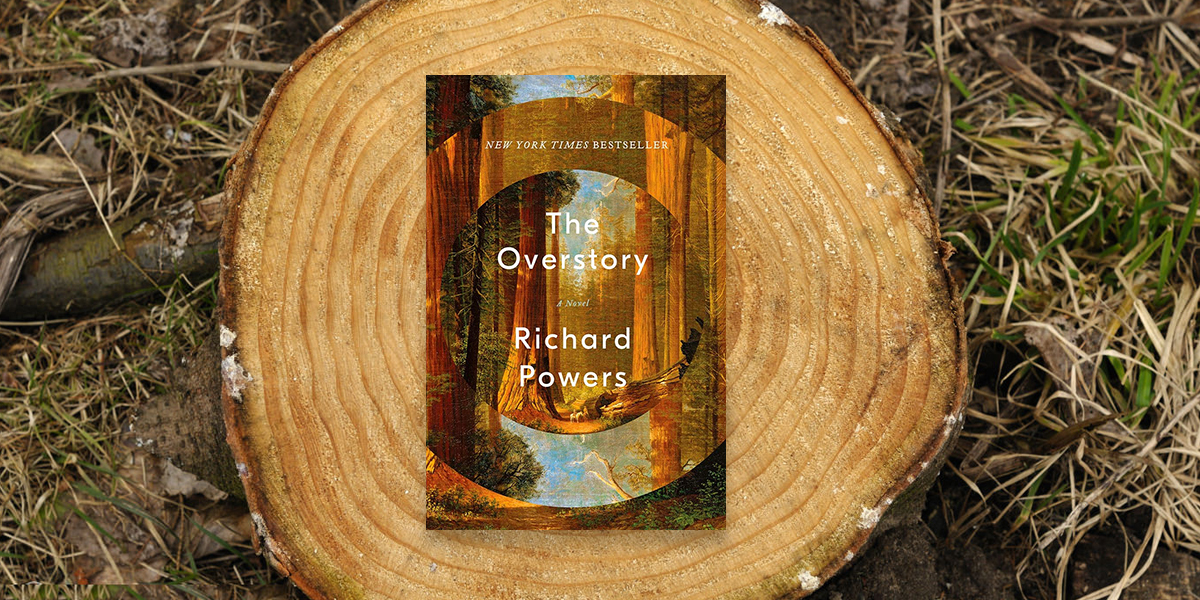
Richard Powers, The Overstory (2018)
The best arguments in the world won’t change a person’s mind. The only thing that can do that is a good story.
*
Essential stats: It was a New York Times bestseller; it was shortlisted for the 2018 Booker Prize, and won the 2019 Pulitzer Prize for fiction.
Isn’t this the book that has trees as characters instead of humans? Well, not really. As our own Jonny Diamond put it in his argument for the book as one of the best novels of the decade:
While Powers does introduce several recurring tree characters—a landlocked and lonely chestnut that measures the generations of a single family, a monumentally giant redwood that’s home to eco activists—the lasting importance of this elegiac epic of climate collapse will be the way it takes environmental activism seriously. Powers’ human characters are heartbroken about the destruction of the planet, and they act upon it in all the messy, complicated ways one might expect from non-trees; but they are taken seriously—they are not quirky Franzonian extras, sprinkled through the narrative for a little radical spice. Here is a novel that contains within it layers of sadness and quiet hope; its concerns are ours, its characters are us. Deep time for dark times.
In a nutshell: This is one of the first major, mainstream literary works to centralize climate change and environmental concerns. It will not be close to one of the last.
Extra credit: A profile of Powers by Kevin Berger; 17 Writers on the Role of Fiction in Addressing Climate Change.

Sarah Smarsh, Heartland (2018)
The American Dream has a price tag on it. The cost changes depending on where you’re born and to whom, with what color skin and with how much money in your parents’ bank account. The poorer you are, the higher the price. You can pay an entire life in labor, it turns out, and have nothing to show for it. Less than nothing, even: debt, injury, abject need.
*
Essential stats: Smarsh’s memoir of growing up in a poor family in rural Kansas was an instant New York Times bestseller, and was a finalist for both the National Book Award and the Kirkus Prize.
Why was it defining? With this book, Smarsh has reframed the narrative around small town Democrats in red states, and has been an important corrective against the likes of J.D. Vance and his ilk. She’s stumped for small town politicians in Kansas, been asked to run for Congress, giving voice to a particular kind of working class Democrat in a way that is pretty important for our country, now and moving forward. As Stephanie Hanes wrote, “It is far too easy to stereotype the poor, the Midwest, or those who live in the country, Smarsh tells us.
The reality is much more nuanced, and all the more heartbreaking . . . As accurate as they may be, the real power of Heartland lies less in Smarsh’s explicit sociological arguments, which can veer toward jargon or read as somewhat tired liberal tropes, but in her startlingly vivid scenes of an impoverished childhood. Many of these narratives are painful. There is insight . . . And while Heartland has its flaws—a structure that sometimes feels forced, a narrative that does not smoothly transition between storytelling and sociological claims—overall the book is an absorbing, important work in a country that needs to know more about itself.
In The New York Times Book Review, Francesca Mari called Heartland
one of a growing number of important works—including Matthew Desmond’s Evicted and Amy Goldstein’s Janesville—that together merit their own section in nonfiction aisles across the country: America’s postindustrial decline. Or, perhaps, simply: class. It’s a term that Smarsh argues wasn’t mentioned during her childhood in the 1980s and ’90s. “This lack of acknowledgment at once invalidated what we were experiencing and shamed us if we tried to express it.”
With deft primers on the Homestead Act, the farming crisis of the ’80s and Reaganomics, Smarsh shows how the false promise of the “American dream” was used to subjugate the poor. It’s a powerful mantra. But so too is What would I tell my daughter?
Here’s Smarsh reading at the Harvard bookstore:

Beth Macy, Dopesick (2018)
Opioids are now on pace to kill as many Americans in a decade as HIV/AIDS has since it began, with leveling-off projections tenuously predicted in a nebulous, far-off future: sometime after 2020.
*
Essential stats: It was an instant New York Times bestseller, it won the L.A. Times Book Prize award for science and technology, and it was short-listed for The Kirkus Prize and the Andrew Carnegie Medal. It was optioned for television by Fox 21 and the Littlefield Company.
What made it defining? As Jennifer Szalai pointed out in The New York Times, while Macy’s is not the first book to cover the opioid crisis in America, most of the others “appeared before the 2016 election, when the places in the country most affected by the epidemic went for Trump.
With Dopesick, her third book after Factory Man and Truevine, Macy has waded into a public health morass that has also become a political minefield. Commentators on the left have pointed out the gaping discrepancy between the sympathy extended to today’s opioid users, who are mainly white, and the brutal, racist handling of the war on crack. . . . Macy captures an Appalachian landscape in a state of emergency and in the grip of disillusionment, but there’s little here that’s new. Indeed, that’s part of her point—not enough has changed.
As the rate of overdose deaths from opioids in this country only grows, Macy’s book is a call to action.
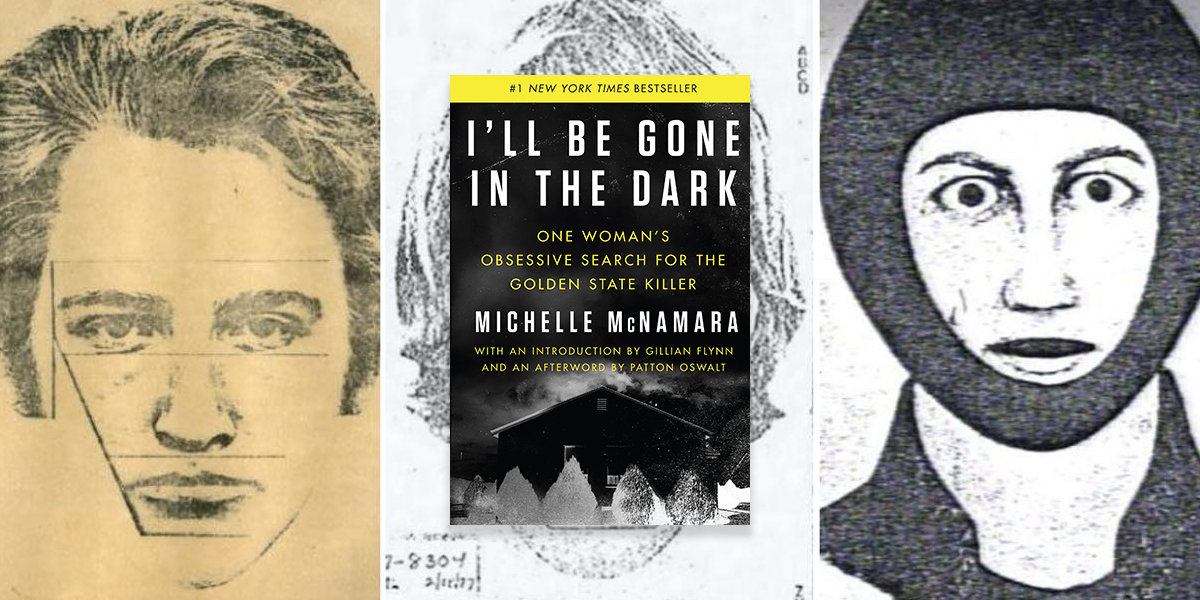
Michelle McNamara, I’ll Be Gone in the Dark (2018)
I love reading true crime, but I’ve always been aware of the fact that, as a reader, I am actively choosing to be a consumer of someone else’s tragedy. So like any responsible consumer, I try to be careful in the choices I make. I read only the best: writers who are dogged, insightful, and humane.
*
Essential stats: McNamara’s posthumously published true crime book investigating the Golden State Killer was a #1 bestseller and remained on the list for 15 weeks. Oddly, right around the time of the book’s publication, authorities actually caught him. They claimed their success, decades after the murders, had nothing to do with McNamara’s book, but the rest of us weren’t too sure. At the very least, the book revitalized interest in the case at just the right time. HBO is developing the book as a docu-series.
Plus: It’s simply one of the most compelling true crime narratives of the decade.
Listen to an excerpt:

Jordan Peterson, 12 Rules for Life (2018)
It took untold generations to get you where you are. A little gratitude might be in order. If you’re going to insist on bending the world to your way, you better have your reasons.
*
Essential stats: This self-help book was an international blockbuster, topping bestseller lists in the US, Canada, and the UK; it has sold more than 3 million copies.
Who is Jordan Peterson? I truly wish I did not have to know the answer. Peterson is a highly controversial Canadian clinical psychologist and academic whose YouTube videos are particularly beloved by the alt-right. His arguments, per The Guardian, have included that it is “his free speech right to refuse to use gender-neutral pronouns for trans and non-binary students,” and that the idea of white privilege is racist, the concept of cultural appropriation is nonsense, modern feminism and women’s studies are dangerous to western society and advancements in gender equality can be bad for women.” Swell. He has described his own politics as “classic British liberal . . . temperamentally I am high on openness which tilts me to the left, although I am also conscientious which tilts me to the right. Philosophically I am an individualist, not a collectivist of the right or the left. Metaphysically I am an American pragmatist who has been strongly influenced by the psychoanalytic and clinical thinking of Freud and Jung.” Again I say swell.
“His central message,” according to Kelefa Sanneh, “is a thoroughgoing critique of modern liberal culture, which he views as suicidal in its eagerness to upend age-old verities. And he has learned to distill his wide-ranging theories into pithy sentences, including one that has become his de facto catchphrase, a possibly spurious quote that nevertheless captures his style and his substance: “Sort yourself out, bucko.”
What did the critics say? Most were unimpressed. “Once the cloud of testosterone has cleared,” wrote Hari Zunzru,
the reader discovers that each of Peterson’s 12 rules is explained in an essay delivered in a baroque style that combines pull-your-socks-up scolding with footnoted references to academic papers and Blavatskyesque metaphysical flights. He likes to capitalize the word “Being” and also to talk about “fundamental, biological and non-arbitrary emergent truth”. Within a page, we are told that “expedience is cowardly, and shallow, and wrong” and “meaning is what emerges beautifully and profoundly like a newly formed rosebud opening itself out of nothingness into the light of sun and God”. The effect is bizarre, like being shouted at by a rugby coach in a sarong.
Here’s that famous Channel 4 interview:
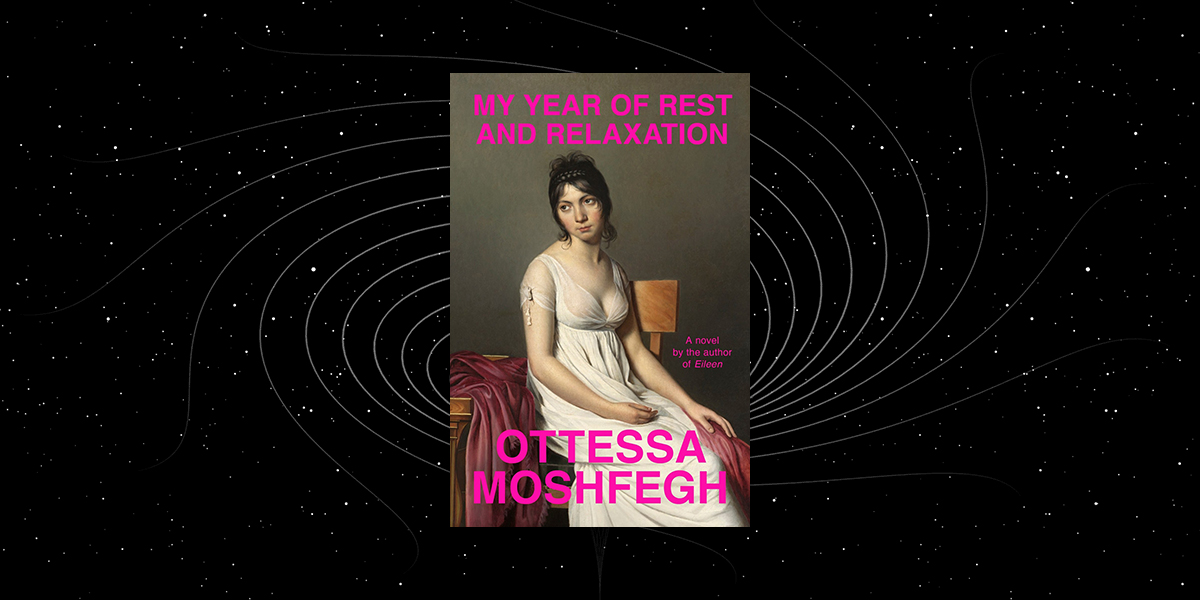
Ottessa Moshfegh, My Year of Rest and Relaxation (2018)
Oh, sleep. Nothing else could ever bring me such pleasure, such freedom, the power to feel and move and think and imagine, safe from the miseries of my waking consciousness.
*
Essential stats: Jia Tolentino wrote in her review of the bestselling novel that Moshfegh is “easily the most interesting contemporary American writer on the subject of being alive when being alive feels terrible.” EW ranked it as the best book of 2018, Leah Greenblatt calling the unnamed narrator “one of the most compelling protagonists modern fiction has offered in years: a loopy, quietly furious pillhead whose Ambien ramblings and Xanaxed bitcheries somehow wend their way through sad and funny and strange toward something genuinely profound.”
What made it defining? For one thing, it was perfectly tonally defining: though the book was set in 2000 and 2001, when it was published in 2018, almost everyone (at least everyone I knew) could relate to the desire to sleep for a year. Just watching the news for twenty minutes was (and some days, still is) enough to make me start fantasizing about hibernation.
Perhaps more importantly: one of the most marked literary trends of this decade was the surge of female protagonists with flat affects, disaffected manners, and cold, even caustic, even cruel, even angry, personalities—i.e. “unlikeable” women; clutch those pearls and see the entry for The Woman Upstairs—and Moshfegh’s unnamed narrator is a sort of pinnacle of them all.
Also: this book is a goddamn delight, especially if you, like certain unnamed people in the Literary Hub office, are secretly an extremely cynical and grumpy ex-mean girl with no heart of gold whatsoever.

Michael Wolff, Fire and Fury (2018)
George W. Bush, on the dais, supplied what seemed likely to become the historic footnote to the Trump address: “That’s some weird shit.”
*
Essential stats: The President tried to keep Wolff’s White House exposé, which was “based on extensive access to the White House and more than 200 interviews with Trump and senior staff over a period of 18 months” from being published, but he could not, and it instantly sold out everywhere, quickly becoming what can only be described (grudgingly) as a publishing phenomenon. On Wednesday, January 3rd, six days before the book was scheduled to come out from Henry Holt, the excerpts started coming out online, and by 3 P.M. that day, the book had shot to #1 on Amazon’s best seller list. The White House sent a cease and desist letter to Wolff and Holt; Holt moved up the publication date to January 5th. It was the best selling book of the year. And then there was the sequel—no, I have to stop, I’m already exhausted.
Why was it so defining? Do you even have to ask? This is what this decade has come to.
Further: Ugh.
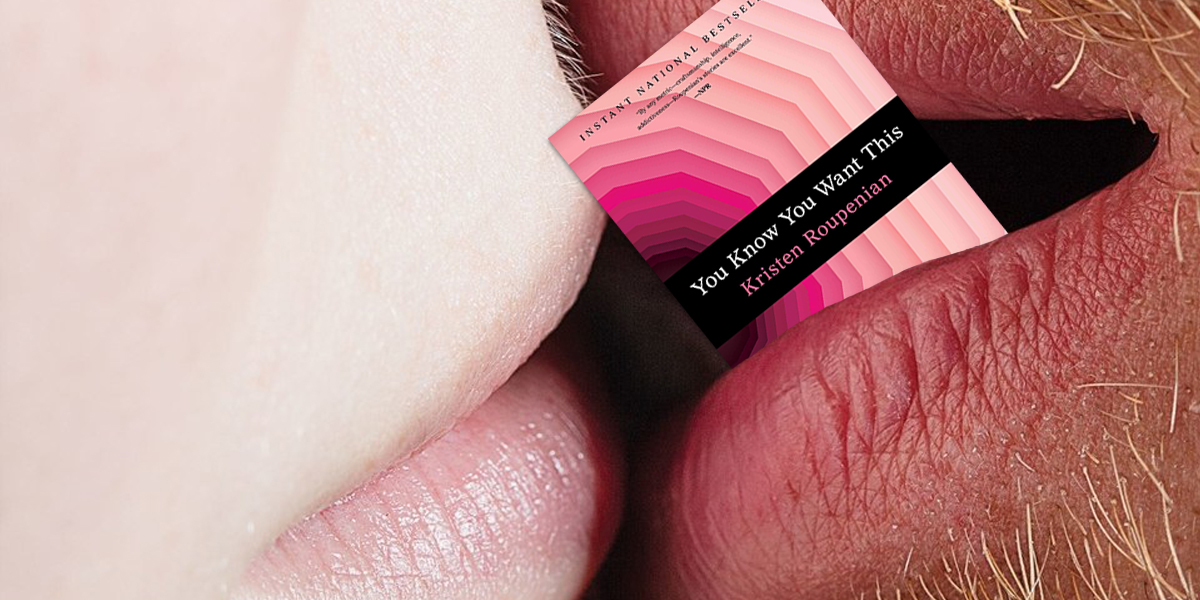
Kristen Roupenian, You Know You Want This (2019)
It was a terrible kiss, shockingly bad; Margot had trouble believing that a grown man could possibly be so bad at kissing.
*
Essential stats: This one is sort of a cheat, because the collection itself wasn’t as defining as the story that spawned it, but that story was massive enough that I think it counts, and this is my list. In the first week of December in the year of our lord 2017, it seemed like everyone on the planet (or at least the internet) was reading Kristen Roupenian’s “Cat Person,” a short story published in The New Yorker. Despite its publication in the last month of the year, it quickly became the most read piece of fiction of the year—and one of the most read stories overall. After “Cat Person” went viral, Roupenian quickly sold You Know You Want This, her first book, for a reported $1.2 million, and sold the adaptation rights to HBO. In 2019, when You Know You Want This was set to come out, Roupenian even wrote a piece about how the “Cat Person” frenzy felt, something I think no one would have imagined for a literary short story writer this decade.
What was so special about “Cat Person”? Well, it depends on who you ask. And you can ask a lot of people. Pretty much everyone wrote a think piece and/or an explainer about it, including me. But in short, many people found it deeply relatable, and for some of those people, it was the first time they’d ever seen themselves and their experience so clearly in a piece of fiction. Also, some people thought it was an essay, which goes to show how deeply the age of the online personal essay has warped our ability to distinguish fact from fiction. Literary arguments ensued over whether “relatability” was a good measure of literary fiction, but I think most people settled on the idea that it was great if more people read it, no matter why they did.
Okay, so everyone has an opinion about “Cat Person,” but is the collection any good? Reviews were decidedly mixed. Turns out Roupenian is more of a horror writer than anyone expected, which may have been part of it. In The New York Times Book Review, Lauren Holmes called the collection “exciting, smart, perceptive, weird and dark,” and wrote: “What’s special about “Cat Person,” and the rest of the stories in You Know You Want This, is the author’s expert control of language, character, story—her ability to write stories that feel told, and yet so unpretentious and accessible that we think they must be true.” Parul Sehgal, on the other hand, called it “a dull, needy book” and wrote” “There’s none of the simmer of “Cat Person” or its attention to language in the rest of these stories. Roupenian will work a metaphor until it screams.” Seems like you’ll have to decide for yourself.
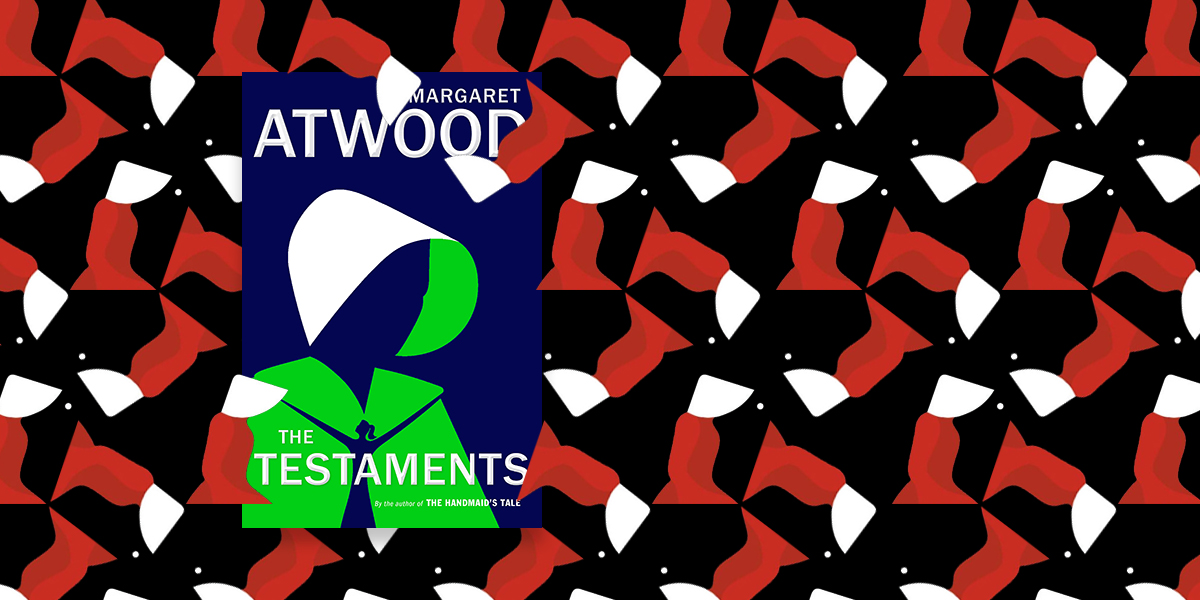
Margaret Atwood, The Testaments (2019)
As they say, history does not repeat itself, but it rhymes.
*
Essential stats: It was by any measure one of the most anticipated books of the competitive fall season—so much so that Amazon (accidentally? cynically? We can guess) broke the sales embargo a week early to get a jump on independent bookstores. This was not appreciated. But the novel had a recordbreaking first week of official sales—according to Penguin Random House it had the “best day one sales for any Penguin Random House title in 2019” and had sold 125,000 copies after only three days. The Testaments earned Margaret Atwood a rare spot on the cover of TIME, and most recently, it was the joint winner of the 2019 Man Booker Prize, along with Bernardine Evaristo’s Girl, Woman, Other.
What was its cultural impact: Well, The Handmaid’s Tale has resurfaced this decade, for various reasons (the Hulu adaptation, a blatant and gleeful misogynist in the White House) and The Testaments is more of a response to that than the cause. But still, I don’t think I can let this book go by without reminding you of this:

And also this:

Would you say that what really makes The Testaments a defining book of this decade is the uneasy sense that it, a needless sequel to a perfect book originally published in 1985, was written not as a piece of art but as a piece of fan service, capitalizing on the popular television adaptation, which makes it basically a piece of Hulu merch masquerading as literature? I mean, not publicly. But the timing is . . . suspicious.
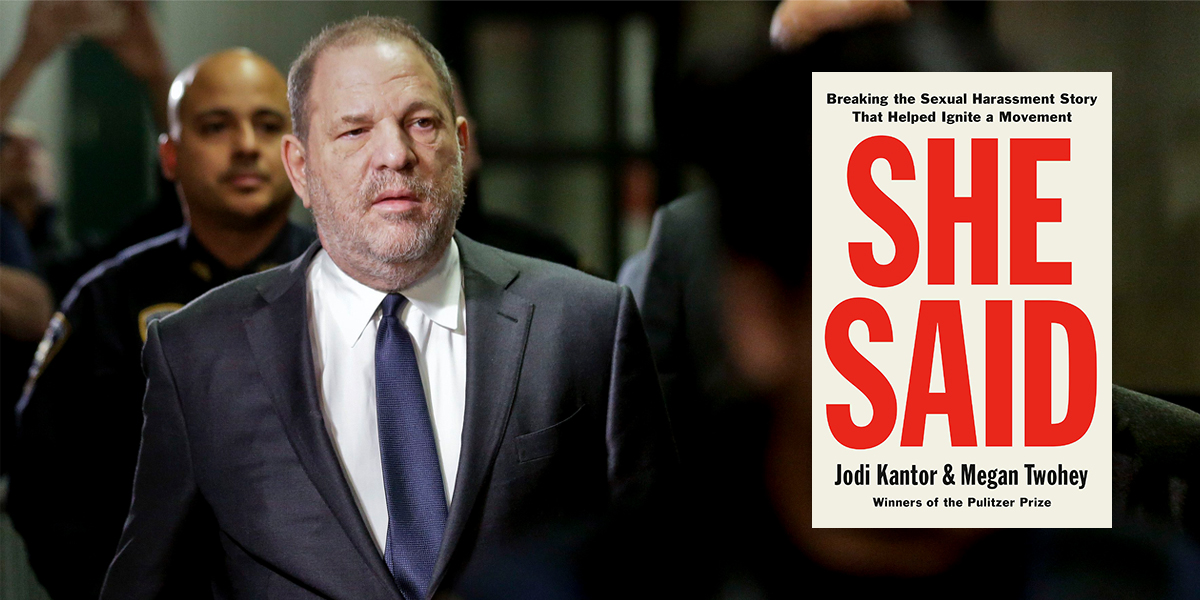
Jodi Kantor and Megan Twohey, She Said (2019)
The United States had a system for muting sexual harassment claims, which often enabled the harassers instead of stopping them. Women routinely signed away the right to talk about their own experiences. Harassers often continued onward, finding fresh ground on which to commit the same offenses. The settlements and confidentiality agreements were almost never examined in law school classrooms or open court. This was why the public had never really understood that this was happening. Even those in the room with long histories of covering gender issues had never fully registered what was going on.
*
Essential stats: This book by Jodi Kantor and Megan Twohey, the two Pulitzer Prize-winning reporters who broke the Harvey Weinstein story for the New York Times, details the whole process behind their monumental investigation, which was a major catalyst for the #MeToo movement. It was an instant New York Times bestseller, and described by several reviewers as All the President’s Men for the current generation (of women).
The caveat: Of course it is Kantor and Twohey’s reporting and not exactly their book about it that has been so defining—but this story has been so essential to, and transformative of, the later half of this decade that there’s just no argument for leaving it off the list. But as Susan Faludi wrote in The New York Times Book Review:
She Said isn’t retailing extra helpings of warmed-over salacity. The authors’ new information is less about the man and more about his surround-sound “complicity machine” of board members and lawyers, human resource officers and P.R. flaks, tabloid publishers and entertainment reporters who kept him rampaging with impunity years after his behavior had become an open secret. Kantor and Twohey instinctively understand the dangers of the Harvey-as-Monster story line — and the importance of refocusing our attention on structures of power. When they at last confront Weinstein, in a Times conference room and later on speakerphone, he’s the mouse that roared, the Great and Powerful Oz turned puny humbug, swerving from incoherent rants to self-pitying whimpers (“I’m already dead”) to sycophantic claims of just being one of them. (“If I wasn’t making movies, I would’ve been a journalist.”) He’s loathsome and self-serving, but his psychology is not the story they want to tell. The drama they chronicle instead is more complex and subtle, a narrative in which they are ultimately not mere observers but, essential to its moral message, protagonists themselves.
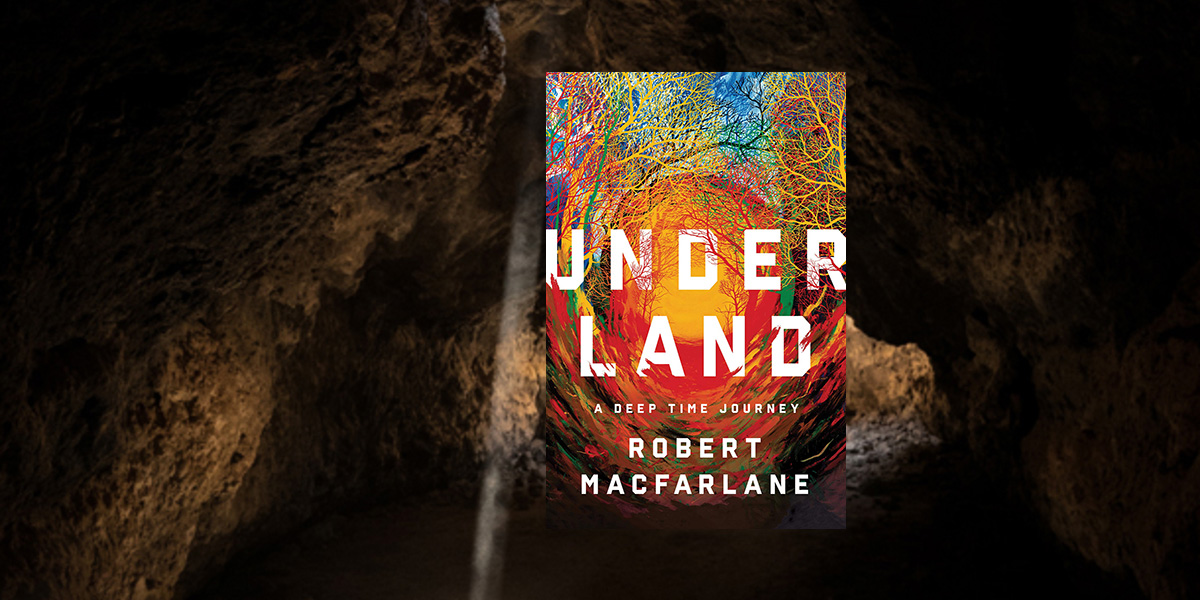
Robert Macfarlane, Underland (2019)
Philip Larkin famously proposed that what will survive of us is love. Wrong. What will survive of us is plastic, swine bones and lead-207, the stable isotope at the end of the uranium-235 decay chain.
*
Essential stats: This bestselling book from Macfarlane, who has been described as “the great nature writer of this generation,” has already been hailed as his masterpiece and listed as one of The Guardian‘s 100 Best Books of the 21st Century. It is an essential text for understanding our planet’s uncertain times.
Why is it defining? As our own Jonny Diamond put it:
One hesitates to label any book by a living writer his “magnum opus” but Macfarlane’s Underland—a deeply ambitious work that somehow exceeds the boundaries it sets for itself—reads as offertory and elegy both, finding wonder in the world even as we mourn its destruction by our own hand. If you’re unfamiliar with its project, as the name would suggest, Underland is an exploration of the world beneath our feet, from the legendary catacombs of Paris to the ancient caveways of Somerset, from the hyperborean coasts of far Norway to the mephitic karst of the Slovenian-Italian borderlands.
Macfarlane has always been a generous guide in his wanderings, the glint of his erudition softened as if through the welcoming haze of a fireside yarn down the pub. Even as he considers all we have wrought upon the earth, squeezing himself into the darker chambers of human creation—our mass graves, our toxic tombs—Macfarlane never succumbs to pessimism, finding instead in the contemplation of deep time a path to humility. This is an epochal work, as deep and resonant as its subject matter, and would represent for any writer the achievement of a lifetime.
This band wrote a song inspired by the book:

Robert S. Mueller III, The Mueller Report (2019)
While this report does not conclude that the President committed a crime, it also does not exonerate him.
*
Essential stats: The Mueller Report, Special Counsel Robert Mueller’s Report on the Investigation into Russian Interference in the 2016 Presidential Election, was released to the public (in a redacted version) on April 18, 2019. It was available on the Department of Justice website, and on several news sites. On April 19, 2019, two different editions—one published by Skyhorse and one by Scribner and The Washington Post—were the #1 and #2 bestselling books on Amazon. A third edition, published by Melville House, was #9.
Always the bridesmaid: At the moment of this writing, impeachment hearings are taking place because of the Ukraine quid pro quo scandal—and many are comparing the current goings-on (and the performance of those giving testimony) quite favorably to the Russia investigation (and Mueller himself). Not all agree, but I understand the connection, especially to an embattled American media and public. I suppose we’ll just have to see what happens.
But in the meantime:
Emily Temple
Emily Temple is the managing editor at Lit Hub. Her first novel, The Lightness, was published by William Morrow/HarperCollins in June 2020. You can buy it here.




















